U.S. Health Care in 2025 Requires Scenario Planning: The Uncertainties (AI!?) That Inspire DIY Healthcare

As Weight Watchers prepares to initiate bankruptcy proceedings, I file the news event under “thinking the unthinkable.” “Thinking about the unthinkable” is what Herman Kahn, a father of scenario planning, asked us to do when he pioneered the process. In this book, for Kahn, “the unthinkable” was thermonuclear war, and the year was 1962. The book was tag-lined as “must reading for an informed public” and in it, Kahn I’ve been drawn back to this book lately because of a more intense workflow using
How BioPharma Can Improve Consumers’ Experience and Health
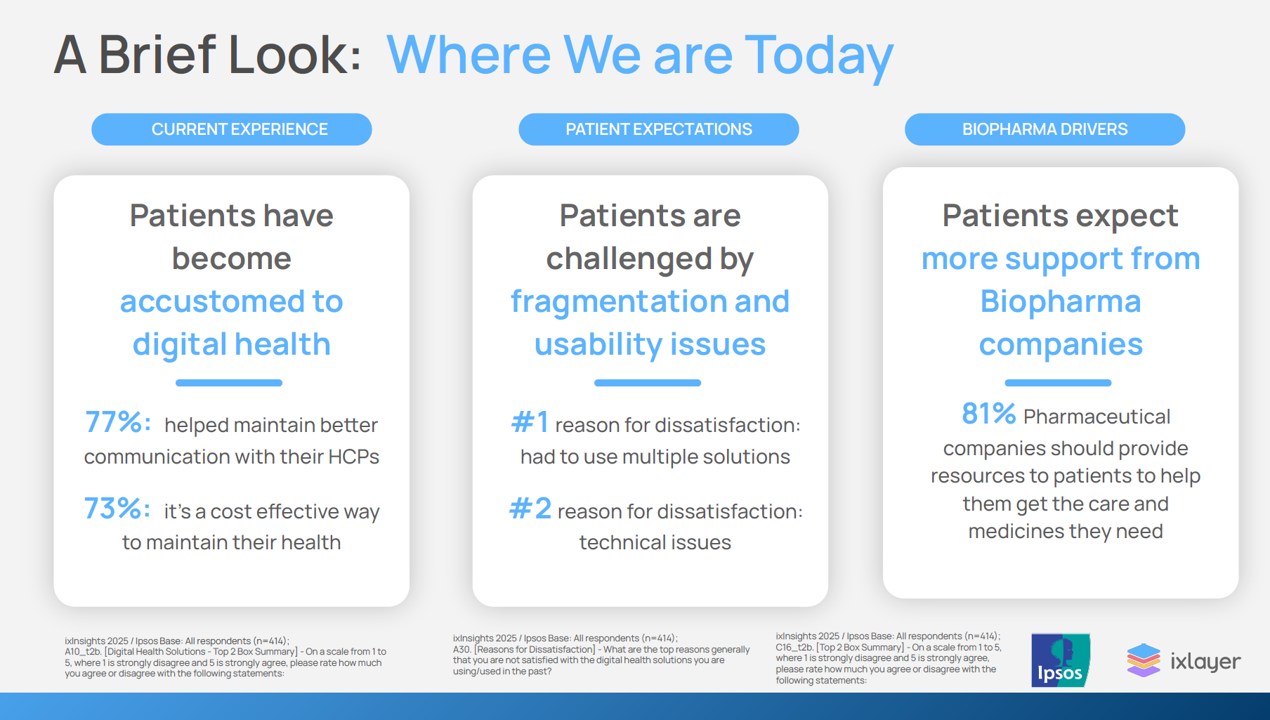
Patients as health consumers now know what “good” looks like in their digital experiences. People have tasted the convenience and respect they feel from well-designed, streamlined omnichannel retail experiences, and they now expect this from health care — specifically supported by the pharmaceutical companies who manufacture the medicines they use in managing chronic conditions, we learn in ixlayer ixInsights 2025: Pharma’s Role in Improving the Health Experience from ixlayer and Ipaos. The patient-focused report gets specific about people dealing with asthma, COPD, Type 2 diabetes, heart disease, psoriasis, and atopic dermatitis with a lens on
What is a Consumer Health Company? Riffing Off of Deloitte’s Report on CHCs/A 2Q2025 Look at Self-Care Futures
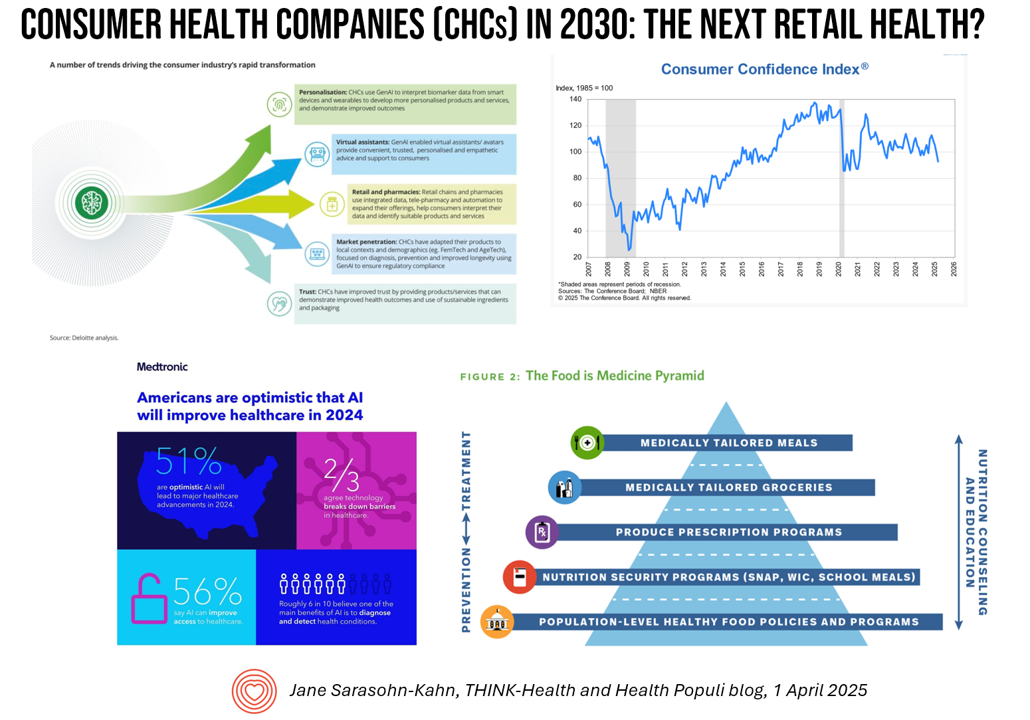
The health care landscape in 2030 will feature an expanded consumer health industry that will become, “an established branch of the health ecosystem focused on promoting health, preventing, disease, treating symptoms and extending healthy longevity,” according to a report published by Deloitte in September 2024, Accelerating the future: The rise of a dynamic consumer health market. While this report hit the virtual bookshelf about six months ago, I am revisiting it on this first day of the second quarter of 2025 because of its salience in this moment of uncertainties across our professional and personal lives — particularly related to
Still Life in Need: Art, Food Justice, and Health

As Thomas Jefferson reminded us, travel makes us wiser…but less happy. And so it is when you confront a piece of art that makes you stop in your tracks, swim in it, and know what it’s saying in terms of what you know you know. Such was the case yesterday during a walking meeting through the Frist Art Museum in Nashville when I passed by this quilt, a multimedia work titled “Still Life in Need” by Lee Colvin, a local artist. This work was part of a
From Bowling Alone to Eating Alone – What the Shift to Take-Out Food Means for Our Social Well-Being and Mental Health
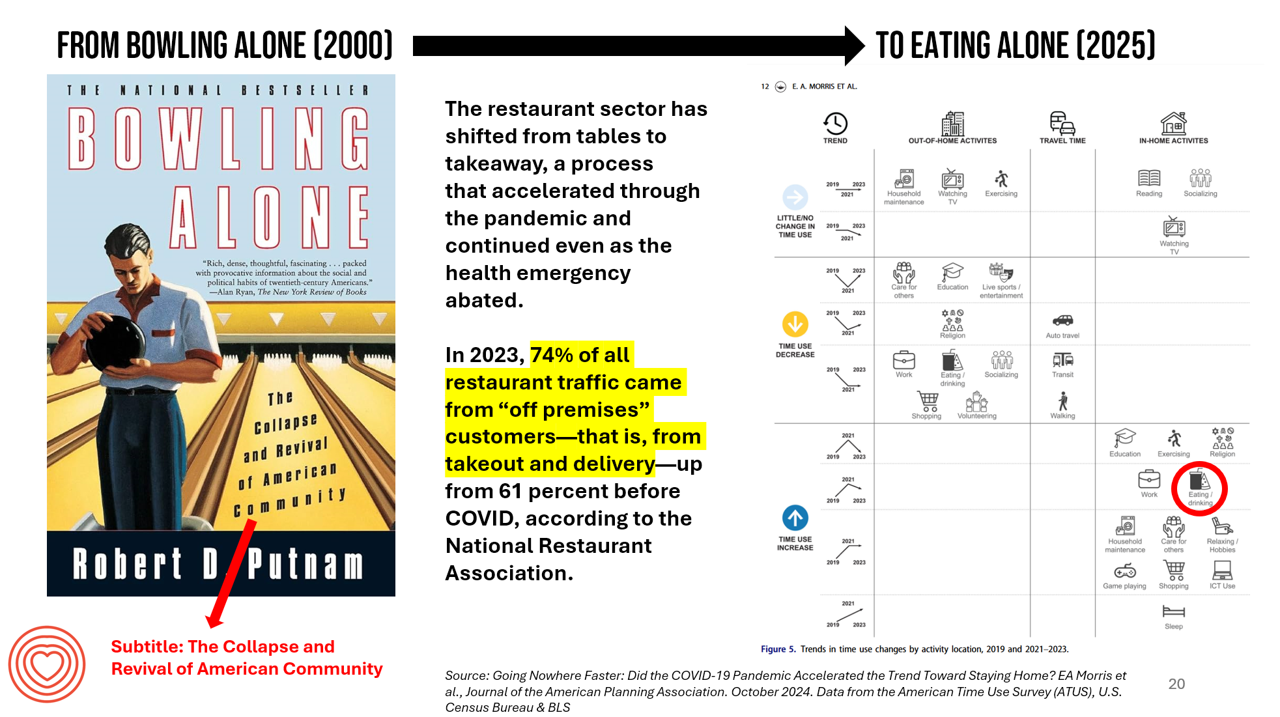
New data from the American Time Use Survey, research conducted by the U.S. Census Bureau and the Bureau of Labor Statistics, shows that Americans now favor eating in-home compared with eating out at restaurants. Corroborating this shift is other data from the National Restaurant Association sharing that 74% of all restaurant traffic in 2023 came from “off premises” customers — that is, from takeout and delivery — up from 61% in the pre-COVID era. What does this mean for our health, well-being, and sense of community and connectivity? I’m preparing a new talk to
One Way to Improve U.S. Healthcare, Lower Costs and Drive Outcomes? “Unvendor,” Asserts Dr. Harm Scherpbier in His New Book
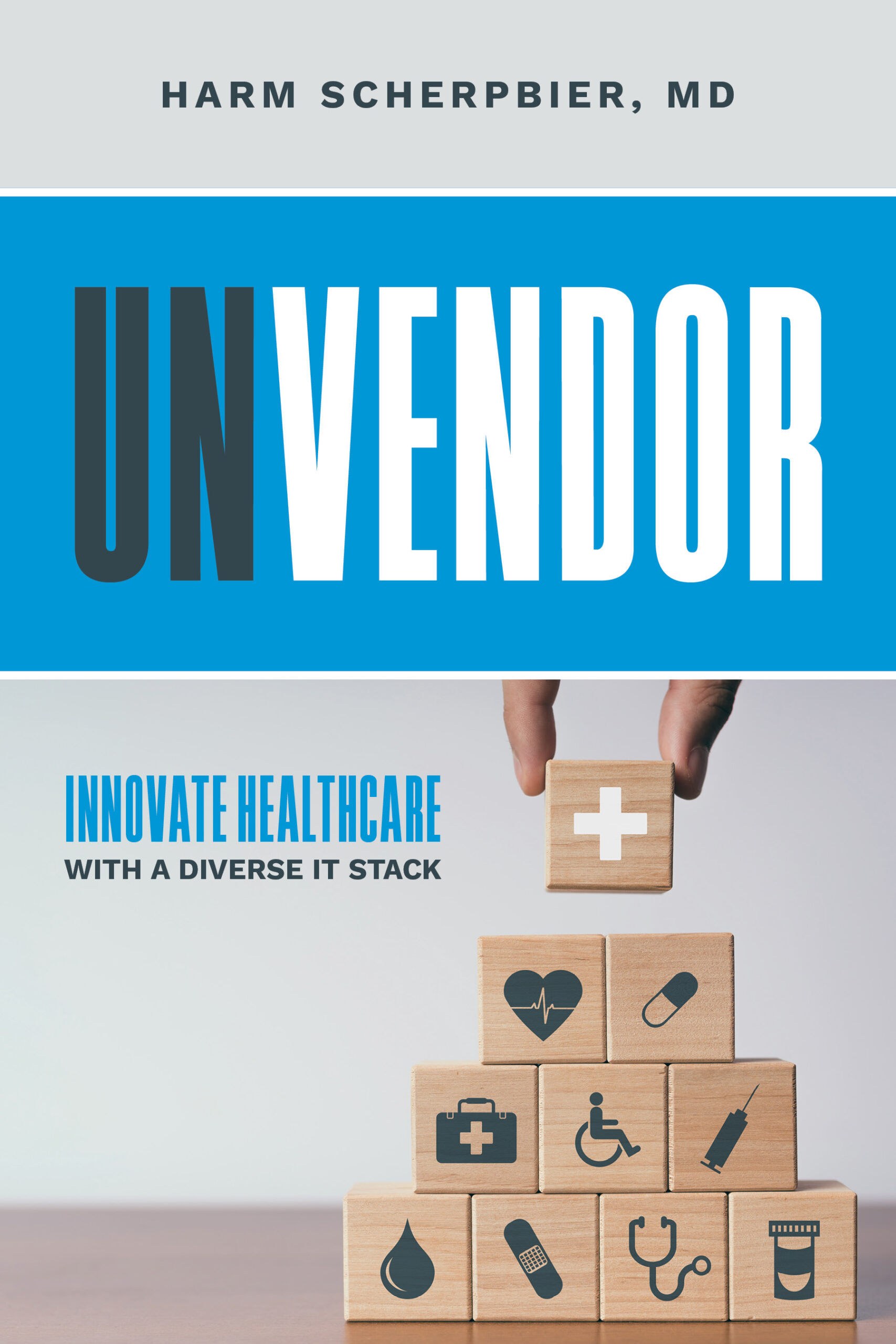
Health information technology professionals charged with selecting, implementing, updating, and paying for health IT in hospital and care delivery settings are essentially the first-line “consumers” of health IT – specifically, electronic health records. But these health IT leaders feel far from empowered and choiceful as consumers in todays EHR vendor “monoculture,” Harm Scherpbier, MD, explains in his book, Unvendor. I spent time with Harm to discuss the book, its backstory, and what he hopes to accomplish by raising the issue of single-vendor health IT and how clinicians, health IT staff, and
The New “Paging Dr. Google?” DTC-AI for Health Care
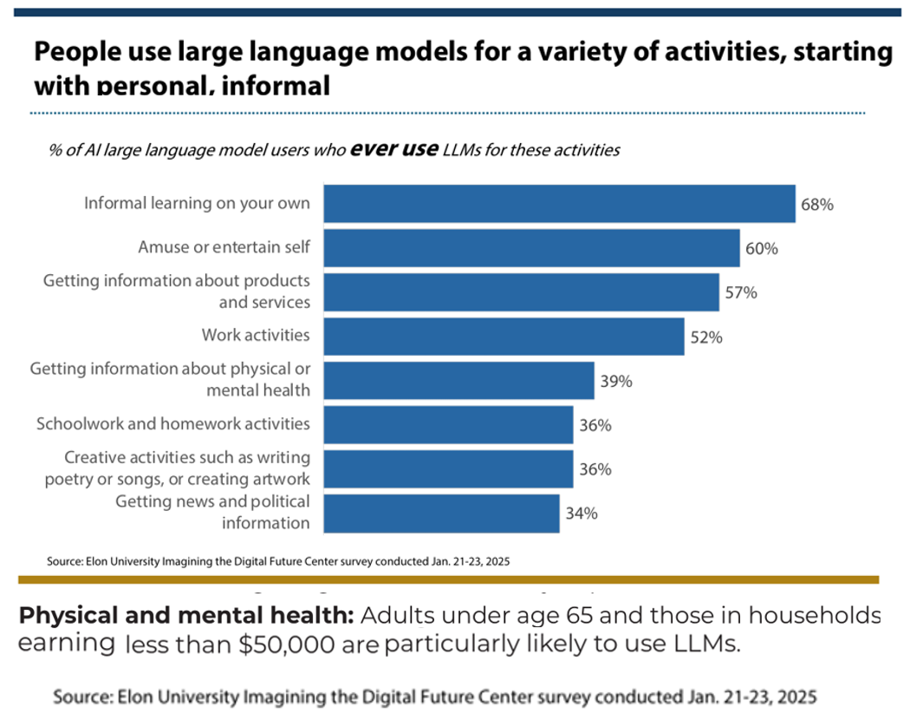
While most people in the U.S. who have used large language models (like ChatGPT) for informal learning, entertainment, and getting information about products and services, 39% of U.S. adults have also tapped into LLMs to source information about physical or mental health. This insight is brought to us in the brilliantly titled report, Close encounters of the AI kind, from the Imagining the Digital Future Center at Elon University. The principle author of the survey report is the Center’s Director, Lee Rainie, whose name many of you will know from his two+ decade career at the Pew Research Center (and
The Growth of DIY Digital Health – What’s Behind the Zeitgeist of Self-Reliance?
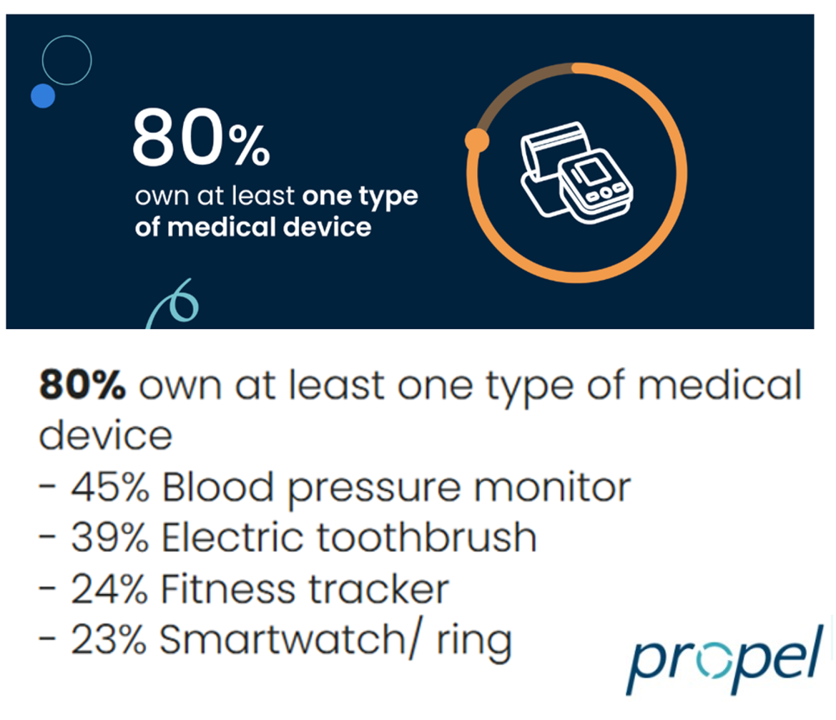
Most people in the U.S. use at least one medical device at home — likely a blood pressure monitor. used by nearly one-half of people based on a survey of 2,000 consumers conducted for Propel Software. The Propel study’s insights build on what we know is a growing ethos among health consumers seeking to take more control over their health care and the rising costs of medical bills and out-of-pocket expenses. That includes oral health and dental bills: 2 in 5 U.S. consumers use electric toothbrushes (a growing smart-device category at the
The Top Patient Safety Risks in 2025 Are Mostly About the “Human OS” – Reading ECRI’s Annual Report
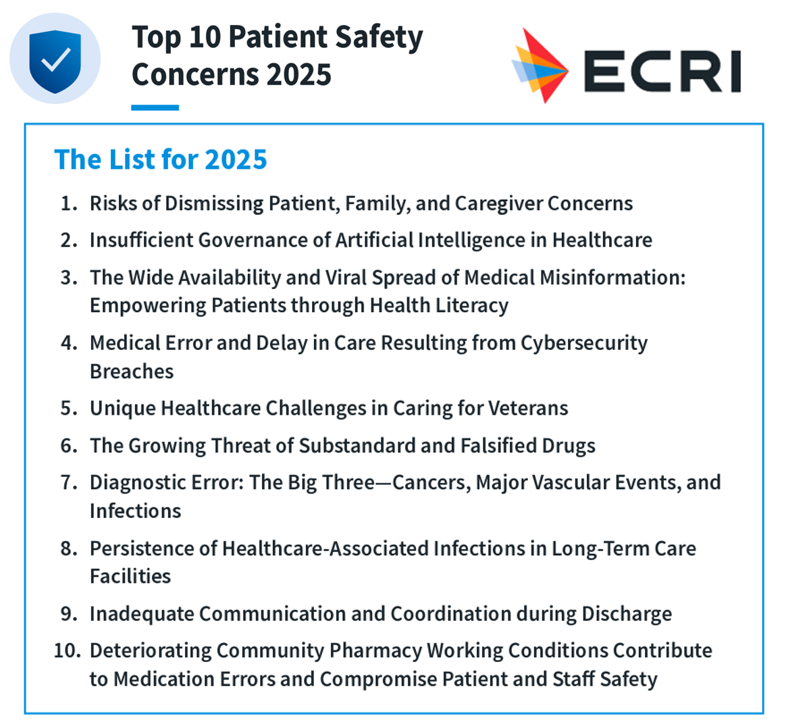
Each year, ECRI (the ECRI Institute) publishes an annual report on the Top 10 Patient Safety Concerns for the year. The 2025 list was published today. My read of it is that most of these risks have to do with what I’ve been referring to as the Human OS, the Human Operating System, in my talks and teachings. In this post, I’ll focus on 2 of the 10 most top-of-mind in my current workflow with clients and speaking: #1 and #3. Here’s the list of 10, calling out: Risks of dismissing
Consumers Are Financially Stressed – What This Means for Health/Care in 2025
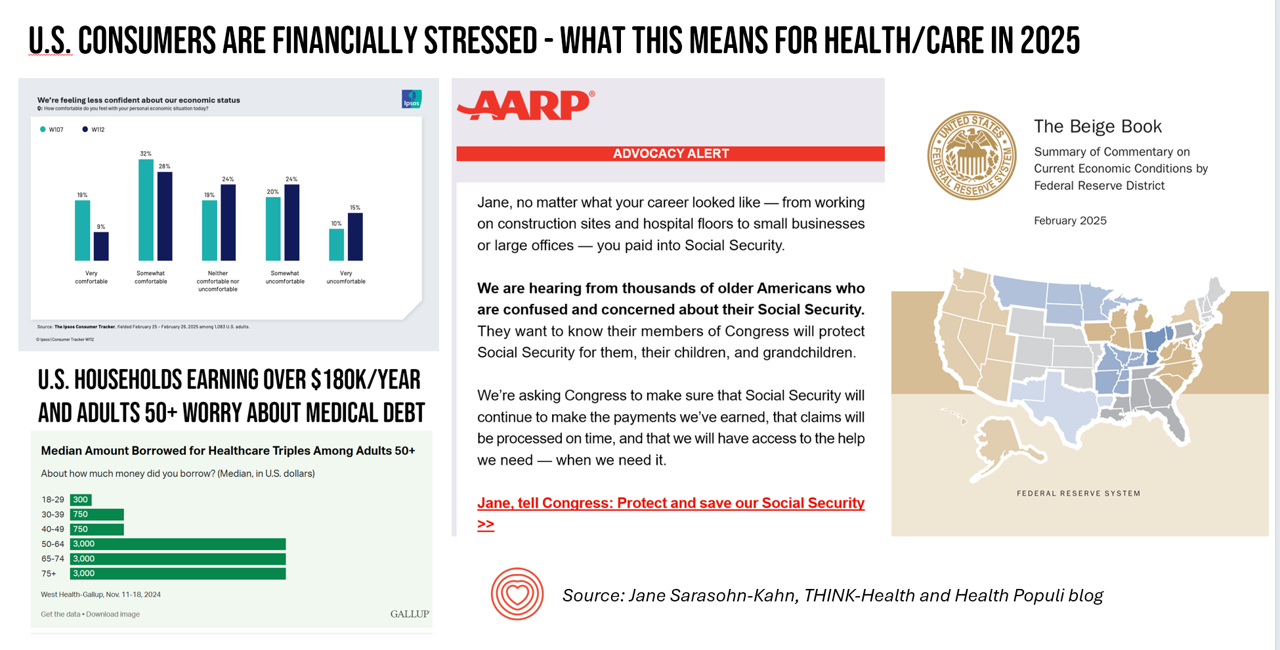
People define health across many life-flows: physical health, mental health, social health, appearance (“how I look impacts how I feel”) and, to be sure, financial well-being. In tracking this last health factor for U.S. consumers, several pollsters are painting a picture of financially-stressed Americans as President Trump tallies his first six weeks into the job. The top-line of the studies is that the percent of people in America feeling financially wobbly has increased since the fourth quarter of 2024. I’ll review these studies in this post, and discuss several potential impacts we should keep in mind for peoples’ health and
Think Quintuple Aim This Week at #HIMSS25
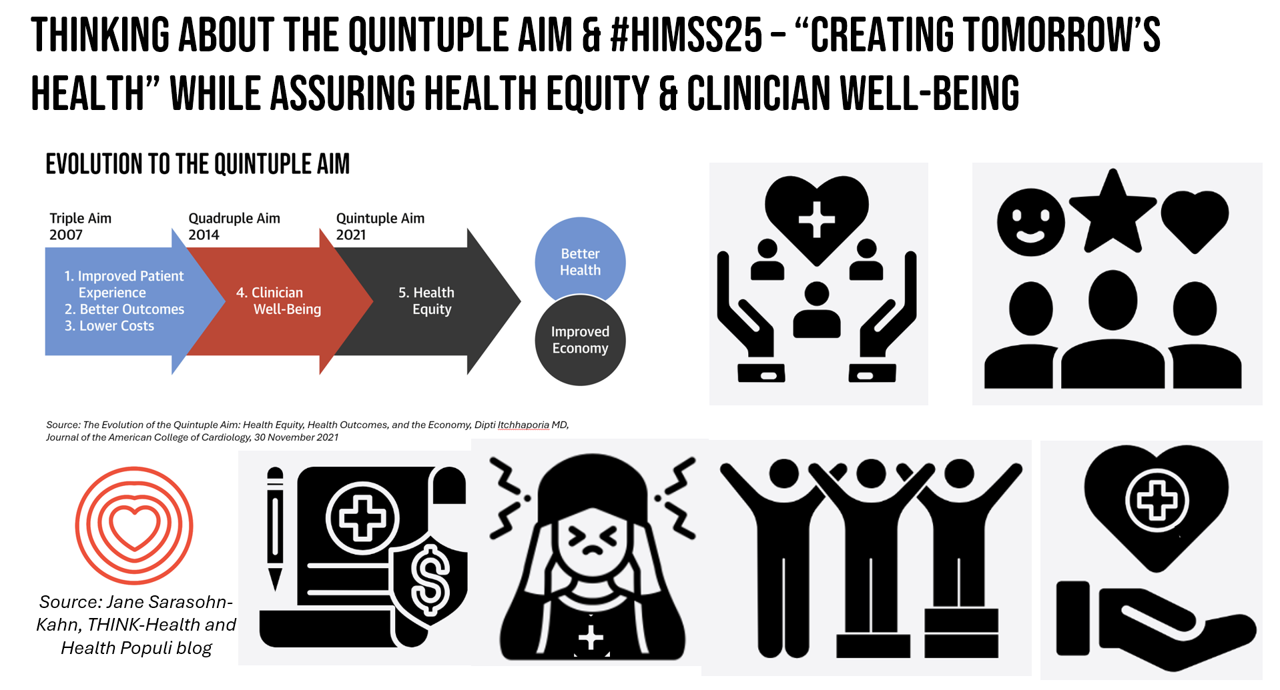
As HIMSS 2025, the largest annual conference on health information and innovation meets up in Las Vegas this week, we can peek into what’s on the organization’s CEO’s mind leading up to the meeting in this conversation between Hal Wolf, CEO of HIMSS, and Gil Bashe, Managing Director of FINN Partners. If you are unfamiliar with HIMSS, Hal explains in the discussion that HIMSS’s four focuses are digital health transformation, the deployment and utilization of AI as a tool, cybersecurity to protect peoples’ personal information and its use, and, workforce development. I have my own research agenda(s) underneath these themes
Improve Sleep, Improve the World and Health: ResMed’s Look at Global Sleep Trends
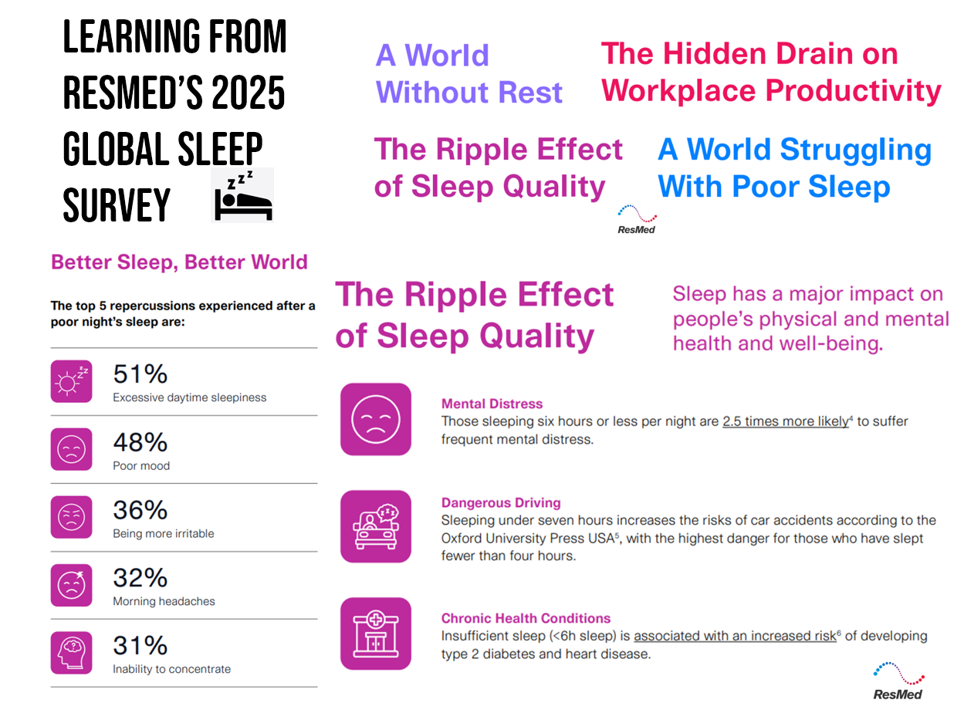
The world would be a better place if we had more, and better quality sleep. That’s the hopeful conclusion from the fifth annual Global Sleep Survey from ResMed. ResMed’s global reach with the sleeping public enabled the company to access the perspectives of over 30,000 respondents in 13 markets, finding that one in 3 people have trouble falling or staying asleep 3 or more times a week. We now live in “a world struggling with poor sleep” — “a world without rest,” ResMed coins our sleepless situation. The irony is that most people believe
Telehealth, Right Here, Right Now: Calling on Congress to Vote for America’s Health and Well-being
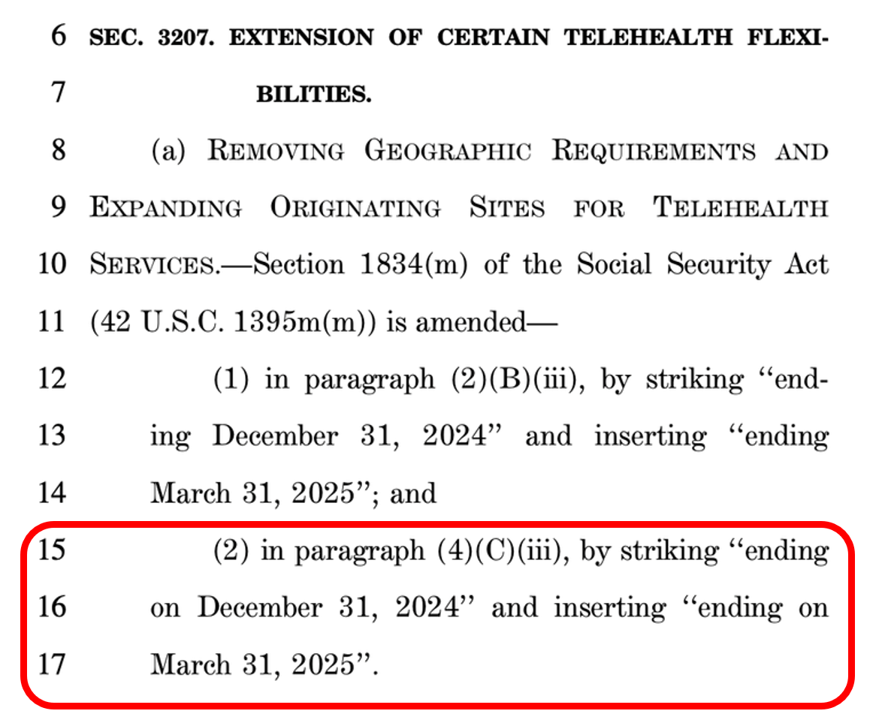
In the U.S., there are some issues that still unite most Americans in 2025. We can agree that, • The cost of eggs is too high • AI can be both exciting and promising at the same time as concerning • It sucks to have your personal data cyberattacked and breached, and, • Having access to telehealth is important. While I would be really sad to give up my omelets, I’m sticking a mindful toe into AI for some simple workflows, and I’m still dealing with the aftermath of the Change Healthcare data breach, it’s the looming telehealth deadline that’s
COVID-19 Further Splits American Society as Trust Continues to Erode – a 5-Year Perspective from Pew
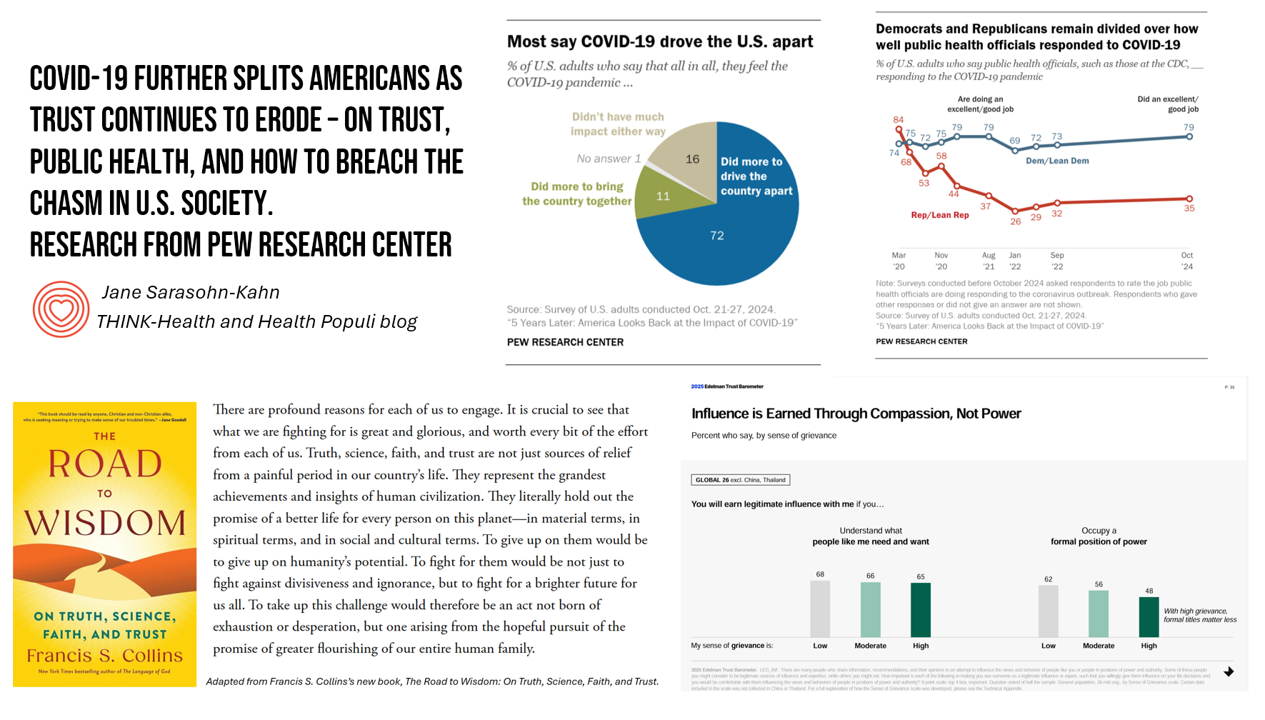
The partisan divide in the U.S., exacerbated by the COVID-19 pandemic, could set the stage for another public health emergency given eroding trust in institutions — especially in media, government, and public health officials. I base this sobering forecast on the latest study from the Pew Research Center which polled people in the U.S. about their pandemic-perspectives, detailed in the report 5 Years Later: America Looks Back at the Impact of COVID-19. Couple these findings with the recent dismissal of public health “disease detectors” working with the Centers for Disease Control (CDC), and what is currently termed a “quademic” (that
Physicians’ Confidence In and Use of AI is Rising, AMA Finds – Coupling Demand With Many Enabling Factors
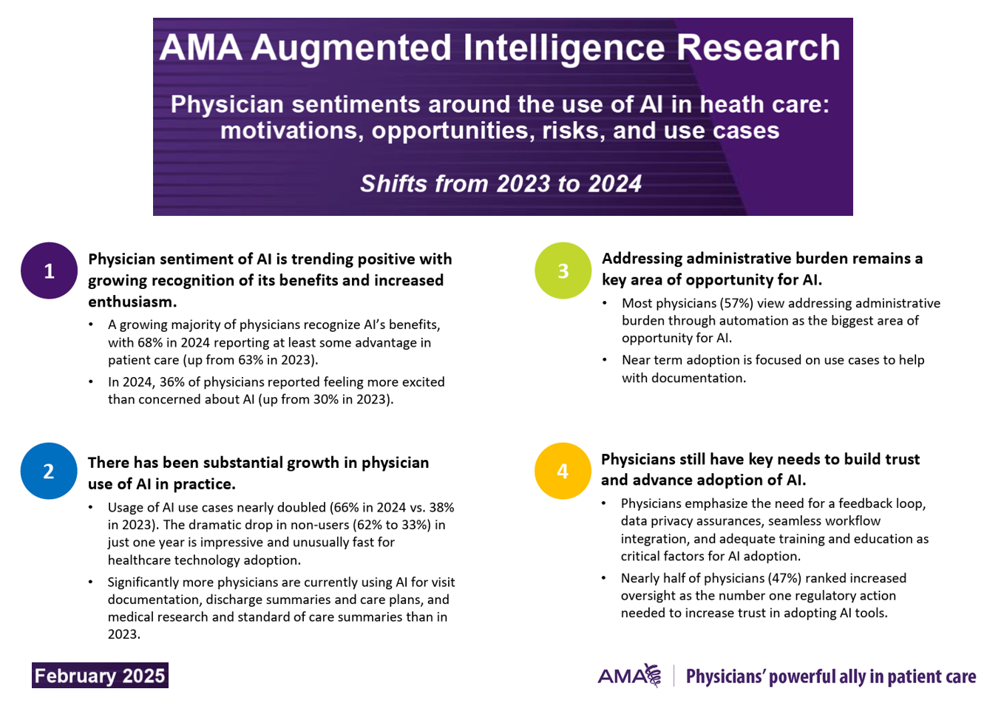
Doctors’ use of and demand for augmented intelligence in medical practice is on the rise — with many factors that could bolster or risk adoption on the journey toward AI in the doctor’s office, based on the latest survey from the American Medical Association (AMA) published this week. The AMA polled U.S. physicians in November 2024 to gauge their views on augmented intelligence (AI) addressing doctors’ use of AI, perceived opportunities and risks, and enabling factors for adoption. This study updates AMA’s survey conducted in 2023 and found significantly growing confidence and utilization
Health/Care at Super Bowl LIX, GLP-1s, Kaiser and Tufts on Food-As-Medicine, and the RFK, Jr. Factor: A Health Consumer Check-In
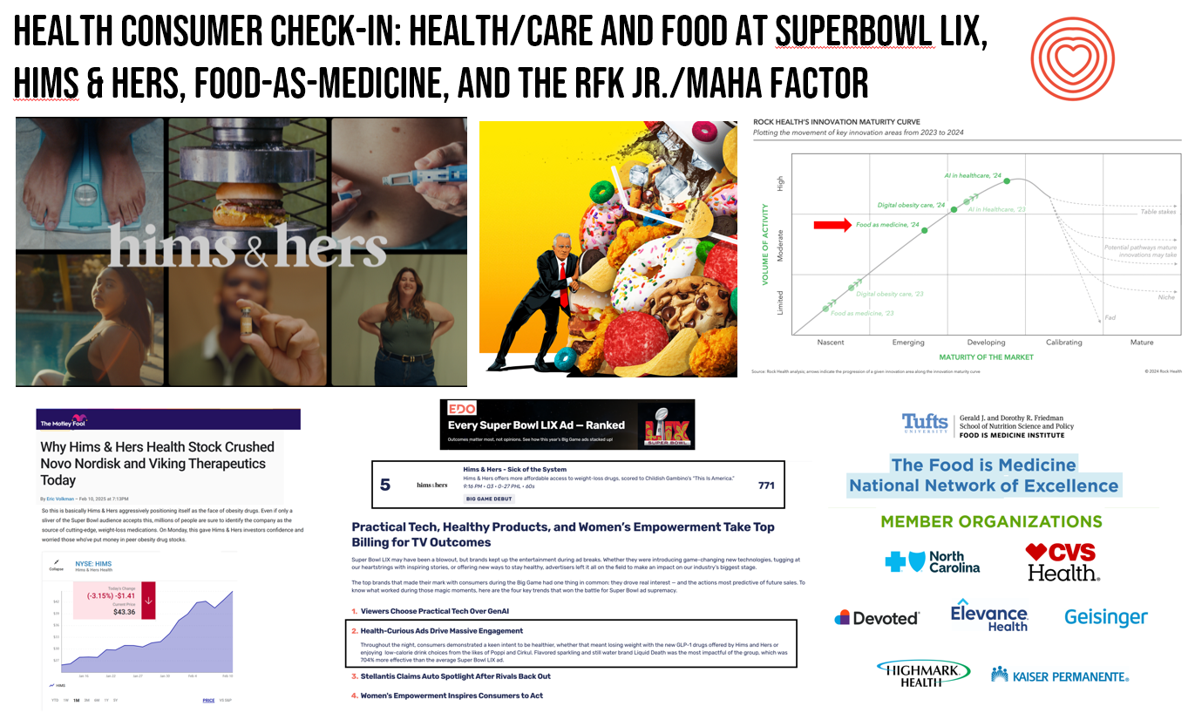
In the wake of the always-creative ads for Super Bowl and last Sunday’s LIX bout, game-watchers got to see a plethora of commercials dedicated to the annual event’s major features: food and game-day eating. Oh, and what’s turned out to be the most controversial commercial, the one on GLP-1s from Hims & Hers. In that vein, and converging with many news and policy events, I’m trend-weaving the latest insights into that most consumer-facing of the social determinants of health: food, and in particular, health consumers viewing and adopting food as part of their health and well-being moves. First, to the
Health Consumer Check-In: From Digital Detox to Analog Wellness, Social Re-Wilding, and a Return to the Bookstore
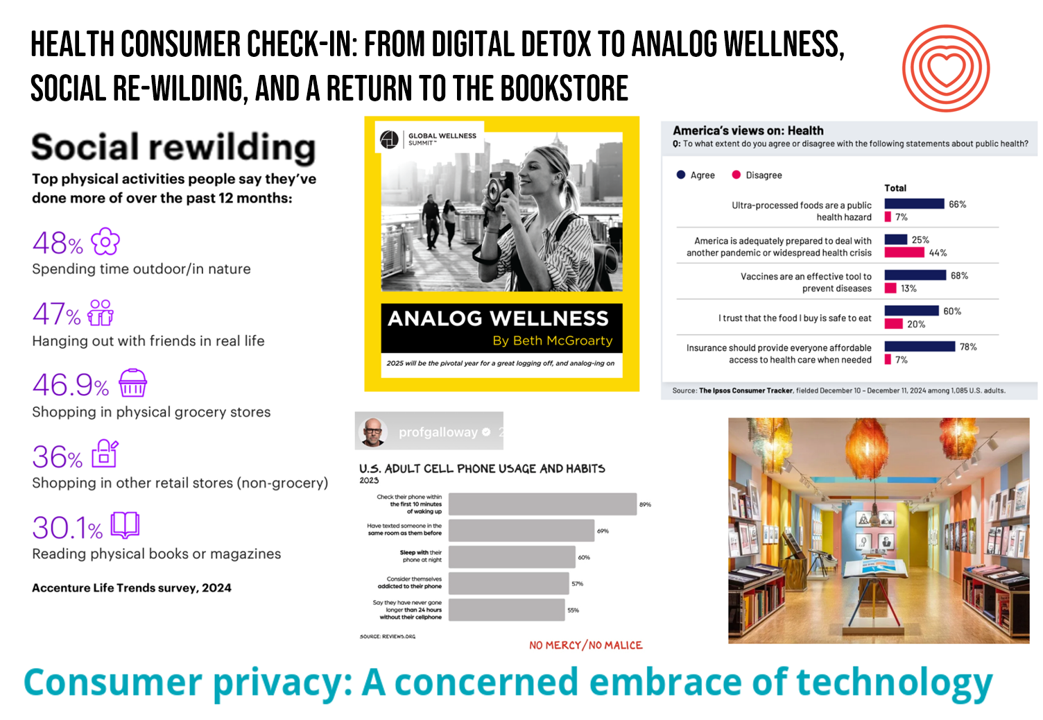
As humans have undergone personal digital transformations, living omni-channel and appreciating the conveniences that being switched-on can bring, there’s a growing demand for “analog wellness.” That’s one of ten trends covered in the Global Wellness Institute’s (GWI) report on 2025 Wellness Trends, and one I want to dig into early this year as consumers are facing growing challenges to our privacy, social bullying, and workforce stressors compelling many employees to spend too many hours in digital isolation and loneliness. To paint the larger landscape of and drivers underpinning analog wellness, I will weave several important reports and studies together, all
Can the Private Sector Serve Up Sufficient Health Media to Compensate for Public Sector Gaps?

In researching several .gov websites from last Monday 20th January 2025, I had an ongoing frustrating user experience in being faced with “404 Error” messages like this one from WhiteHouse.gov. “President Trump’s First Week Hammered Public Health,” Dr. Arthur Kellerman, an ER doc, public health researcher, and patient advocate asserted in Forbes yesterday: “For now, the only health communications Americans receive will come from sources outside the government, such as professional societies, non-governmental organizations, advocacy groups, and businesses, vaccine skeptics, conspiracy theorists, foreign agents and bots posing as Americans to spread disinformation. It will be up to us to figure out what to
Trust and Grievance in 2025: The Edelman Trust Barometer on MLK Jr. Day Converging with the World Economic Forum Kick-Off and the Inauguration of the 47th U.S. President
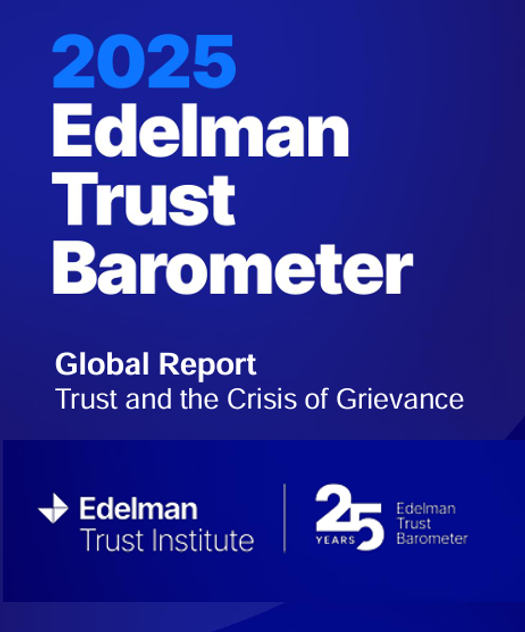
At the start of each new year comes the World Economic Forum meet-up in Davos, Switzerland and with that conference start today, 20 January 2025, the publication of the Edelman Trust Barometer. Now in the study’s 25th annual edition, the Edelman Trust Barometer this year finds us, globally, in a Crisis of Grievance which is eroding trust. Edelman surveyed 1,150 residents (plus or minus) in each of 28 countries around the world, yielding over 33,000 citizens’ voices sharing perspectives on trust and institutions. Interviews were fielded from late October to mid-November 2024.
Connecting for Health at Home: A Unified Field Theory from #CES2025 (On Samsung, Withings, and Panasonic)
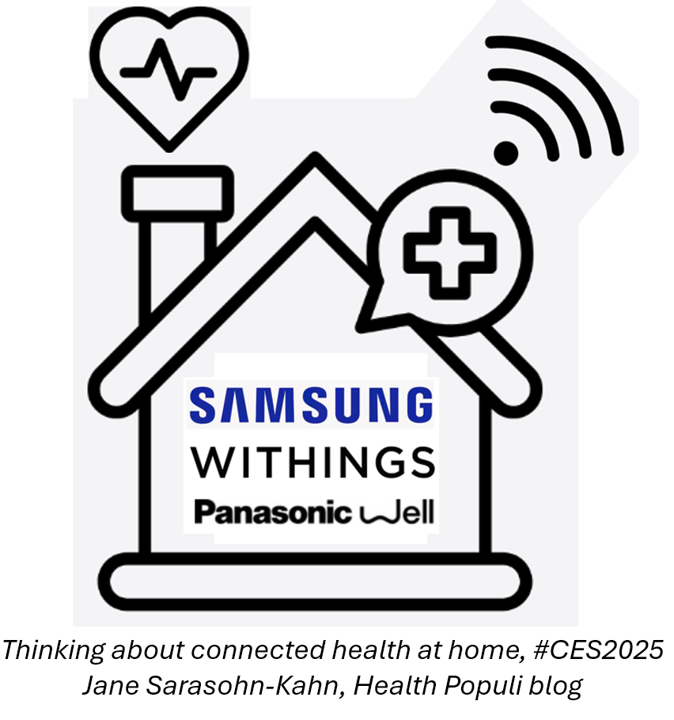
There were over 4,500 exhibitors on the show floor of the 2025 CES in Las Vegas last week, addressing every imaginable aspect of consumers’ daily lives as we increasingly coexist with technology to support life, liberty, and our personal pursuits of happiness….. ….and health. My focus is always on health, and in the past decade and a half, health/care, everywhere. So my lens on #CES2025 looked out for specific point solutions for health, medical care, fitness and well-being, along with adjacencies for mobility/auto, environmental health (think: clean air, clean water), kitchen appliances and food-tech, and home care (not the medical
Vitamin Sleep – Sleep-Tech Innovations from #CES2025
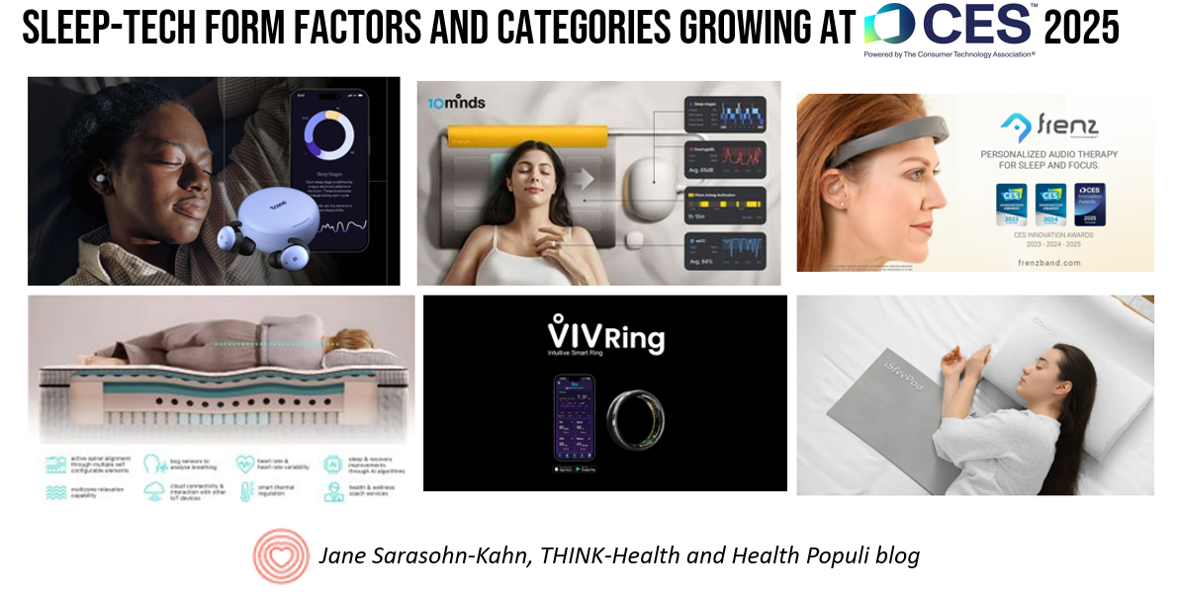
Sleep, or lack thereof, is a public health challenge around the world whatever your postal code or demographic profile. Can technology help us bridge the sleep deprivation gap, or is technology destined to ruin our mind-body-spirit health? At CES 2025, you won’t be surprised that it’s a bull market for sleep-tech across a growing portfolio of device and product types. Beyond the always visible display of new-and-improved beds which have tempted CES-goers into cat-nap trials for many years on the show floor, we find many form-factors for sleep assistance this year. First, some
How GLP-1s Are Showing Up at CES 2025
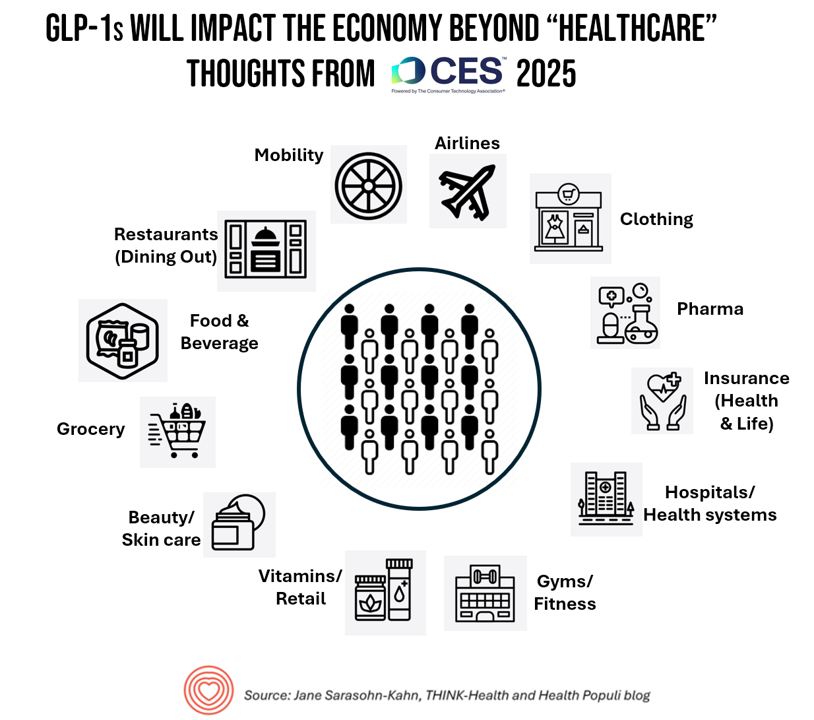
CES 2025: as you read the acronym and year, your brain registered an image like consumer technology and the start of a new year, or some variation of those thoughts. When you saw the title of this post with the acronym “GLP-1,” your brain might not have connected the dots between a medicine and “CE,” consumer electronics. But here we are in real-time, in real life, at the convergence of pharmaceuticals and medicines and consumer-facing technology. And keep in mind that we’re at the annual meeting of CES which is convened by the Consumer Technology Association, CTA. GLP-1s are showing
CTA Tech Trends to Watch for 2025 – Health-Context for Kicking off #CES2025
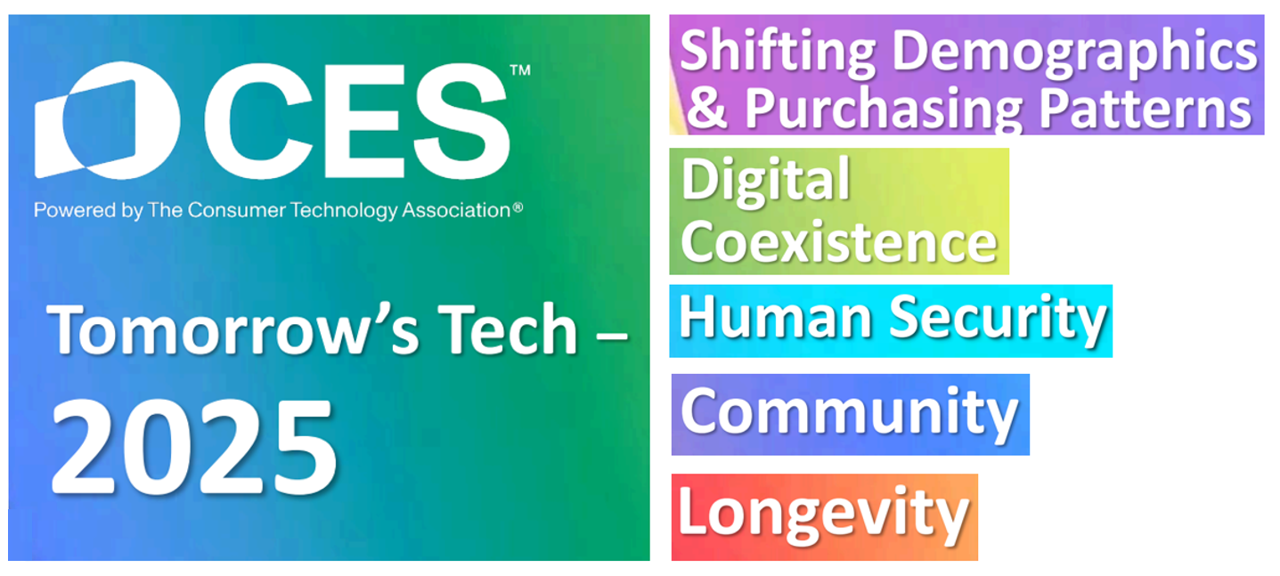
People are living everyday life in digital coexistence — where the connected technologies we use for communication and entertainment now enable life-flows across our lives, morning to night, at work and play and even while we’re sleeping. Welcome to the five key tech-trends for 2025, brought to life Sunday afternoon by Melissa Harrison, CTA’s Vice President of Marketing & Communications tag-teaming with Brian Comiskey, Senior Director, Innovation & Trends. This annual session at CES always provides a practical context for exploring the annual conference, the largest in the world covering technology used by everyday people. And this year, the trends
Seeing Health/Care Everywhere at CES 2025: My Preview for #CES2025
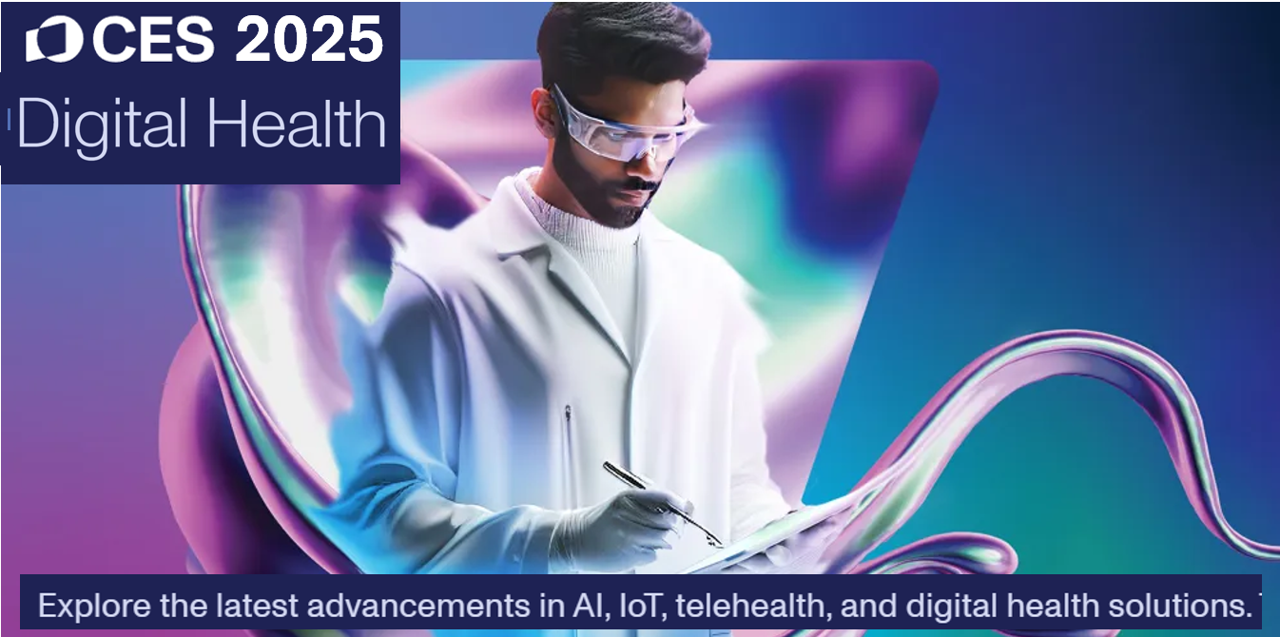
Health/care is everywhere is the mantra on the back of my business card. And at #CES2025, that will indeed be the situation. The 2025 convening of CES (once known as the Consumer Electronics Show) in Las Vegas officially kicks off on 7 January 2025. But I’ll be there beginning 3rd January, scheduling pre-show meetings with innovators, analysts, and my own clients who will be attending the meeting. This will be my 15th year participating in CES, and marking over a decade as a member of the Consumer Technology Association (CTA). As someone who has tracked
The Rough Guide to Health/Care Consumers in 2025: The 2025 Health Populi TrendCast
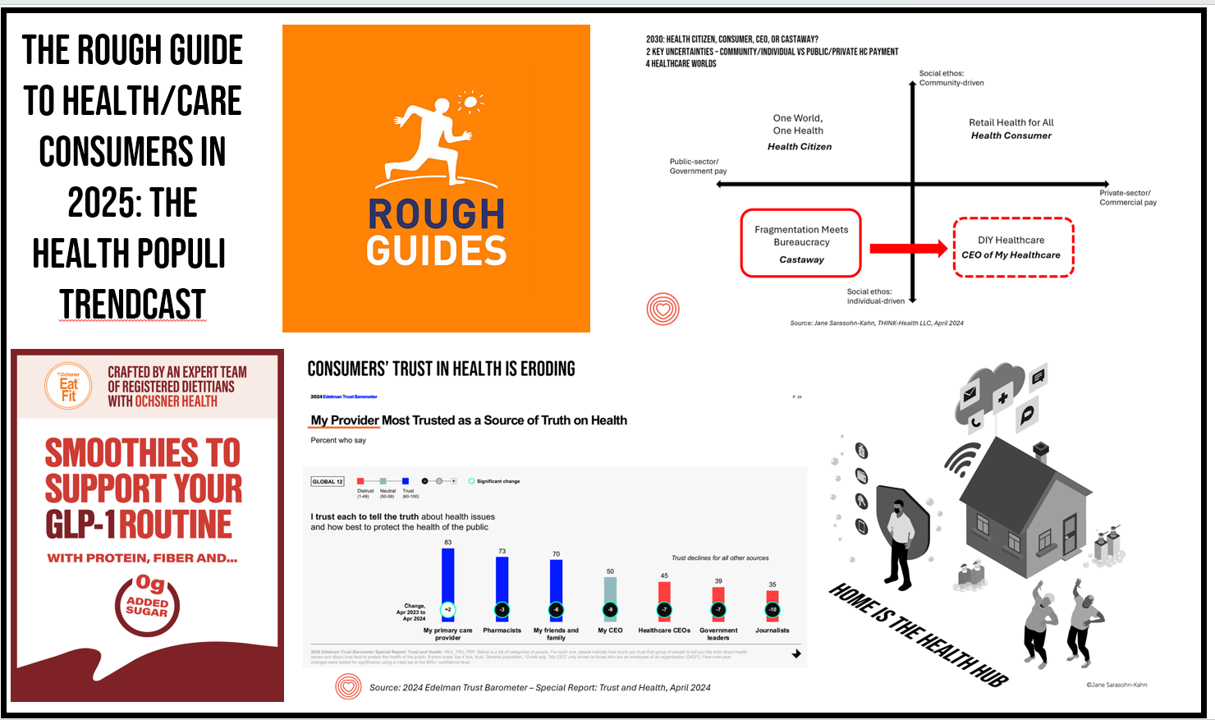
At this year-end time each year, my gift to Health Populi readers is an annual “TrendCast,” weaving together key data and stories at the convergence of people, health care, and technology with a look into the next 1-3 years. If you don’t know my work and “me,” my lens is through health economics broadly defined: I use a slash mark between “health” and “care” because of this orientation, which goes well beyond traditional measurement of how health care spending is included in a nation’s gross domestic product (GDP); I consider health across the many dimensions important to people, addressing physical,
Health-Tech at the Holidays: 2024 Consumer Health-Tech Trends Under the Tree
One in two U.S. adults plans to purchase at least one health and wellness digital health technology product to gift during the winter 2024 holiday season, according to the 2024 Consumer Technology Holiday Purchase Patterns study served up by CTA, the Consumer Technology Association — aka the annual host of CES. Specifically, 41% of givers are looking to buy a dedicated health monitoring device, and 31% a product covering connected sports or fitness. For this annual study, CTA conducted an online survey among 1,205 U.S. adults 18 and over in August-September 2024 to gauge
How Trauma-Informed Design Principles Can Be Health-Ful for All of Us – Learning from IKEA

As a long-time fan and customer of IKEA, I receive daily Google Alerts about the company, from business finances to design trends. When I read this piece on IKEA’s work on a home designed for people who were homeless, I paid special attention to learn about the concept of trauma-informed design. Thanks to the publication Retail TouchPoints and the author of the story, Adan Blair, for covering this project. The story has lit a lot of lightbulb inspirations for me in thinking through the role housing plays in human health and well-being, and also to
Digital Divides and Disability – Ranking Health Determinants in a Digital Age: Learning from WHO and LSE
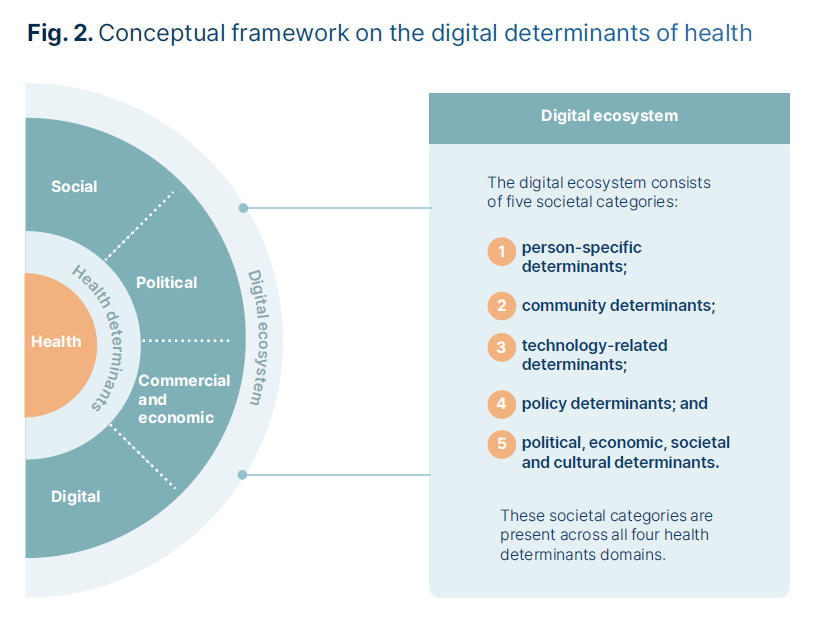
Among 127 health determinants, two rank highest: digital divides in the era of tech-enabled health and care: digital divides that shape a person’s political, economic, and social environment, and the person’s health/disability status. The digital transformation of health and care compel us to re-consider and re-frame social determinants of health in the “digital age,” which is what the World Health Organization in collaboration with the London School of Economics have done in research, published this week in the report, Addressing health determinants in a digital age. The report was funded by the European
How World AIDS Day 2024 Can Inform Healthcare in 2025

December 1 2024 was World AIDS Day, which was observed by the Biden White House with the display of the entire AIDS Memorial Quilt on the South Lawn — all 54 tons of it. The Biden-Harris Administration announced efforts, in advance of World AIDS Day, to continue to fight HIV/AIDS “at home and abroad.” The press release for the effort noted that, ”We remember those who have died from AIDS-related illnesses—honoring their courage and contributions as essential to the progress made thus far. We also stand in solidarity with the more than 39 million people with HIV around the world.
The Evidence for Gratitude and Health, 2024 Giving Thanks
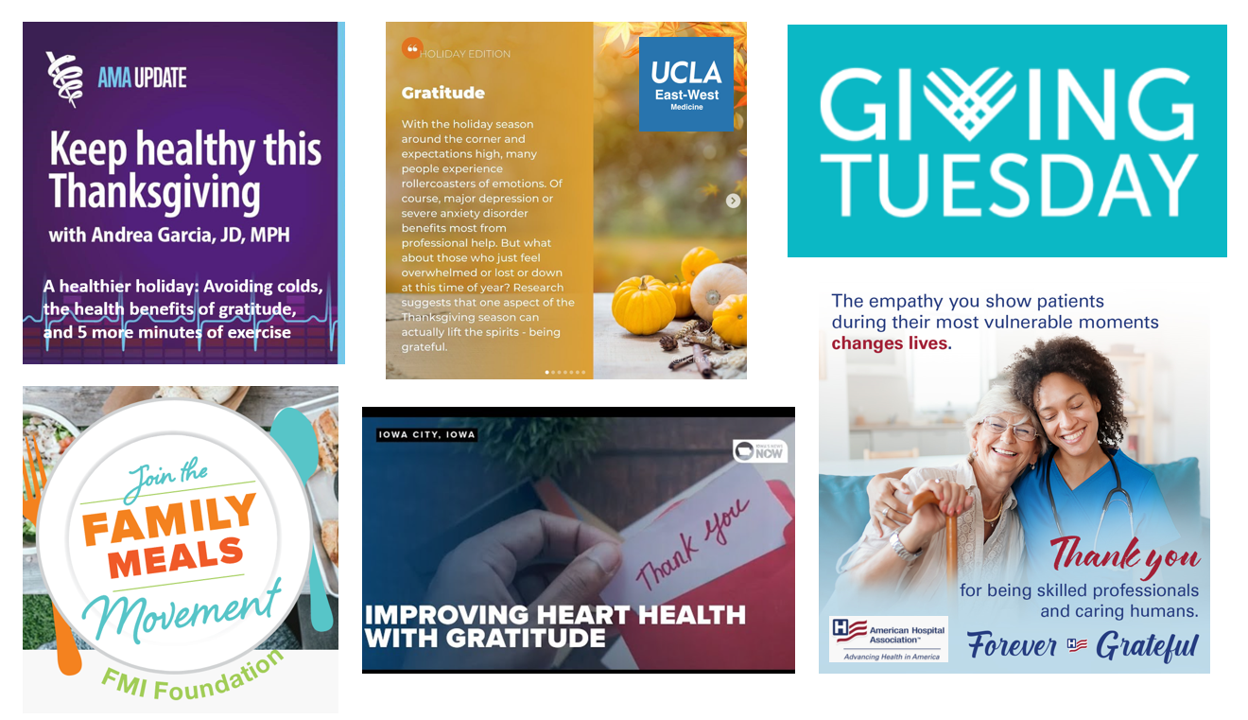
In our home, we’re feeling very grateful for our healthy lives and work-flows right now, being very mindful about seeing blessings around me and within me…. So I’m sharing the love (or “scaling the love” as I recently coined at OSF’s Digital Health Symposium!) to honor American Thanksgiving 2024 here in Health Populi pointing out several sources highlighting the evidence on gratitude and health….underpinned with love, the ultimate driver of health and well-being. Leslie Sarasin, President and CEO of FMI, the Food Industry Association, reminds us that, “Our immigrant ancestors, the pilgrim settlers, worked hard
3 in 4 U.S. Patients Say the Healthcare System is Broken — But Technology Can Help
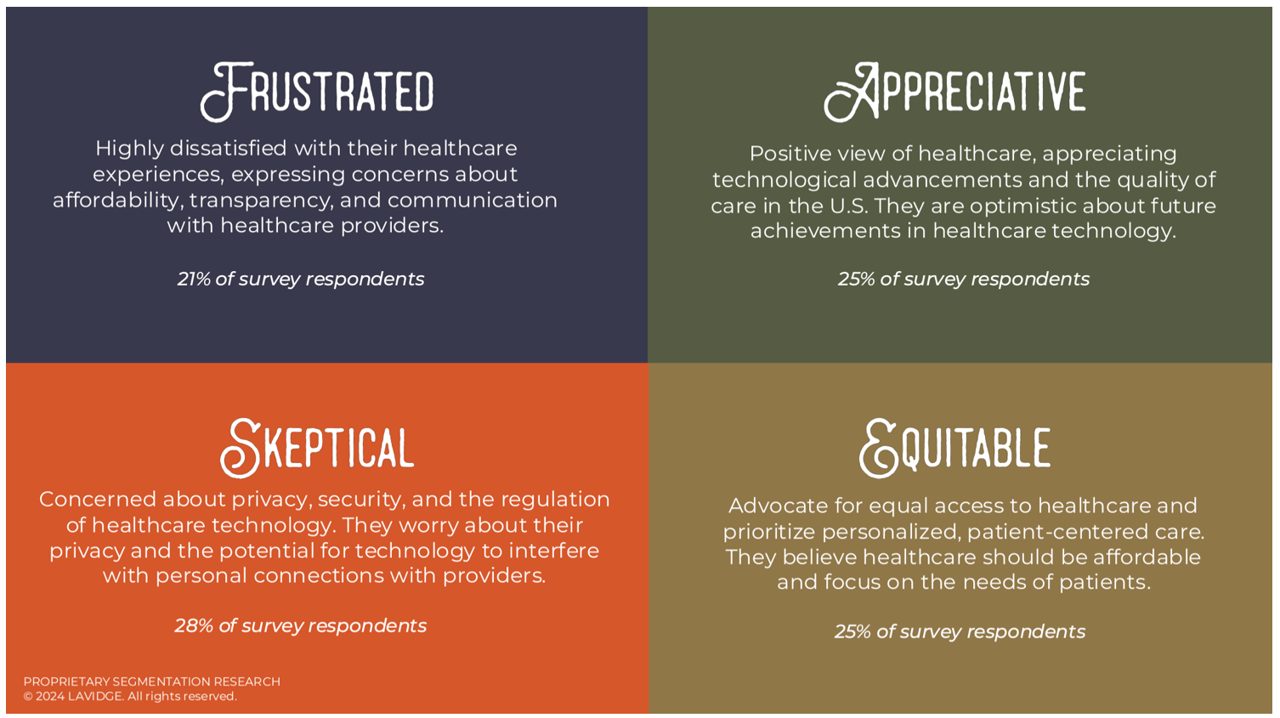
Patients “yearn” for personalized services and relationships in health care — optimistic that technology can help deliver on that hope — we learn in Healthcare’s Future: Balancing Progress and Perception, a health consumer survey report from Lavidge. Lavidge, a communications/PR/marketing consultancy, polled U.S. patients’ attitudes about health care and technology in June 2024, publishing the report earlier this month. Start with over-arching finding that, “Three out of four patients believe the U.S. healthcare system is broken and there is a strong sense of distrust,” Lavidge asserts right at the top of
How’s Life? Around the World – In the U.S., It’s the Sadness That Stands Out
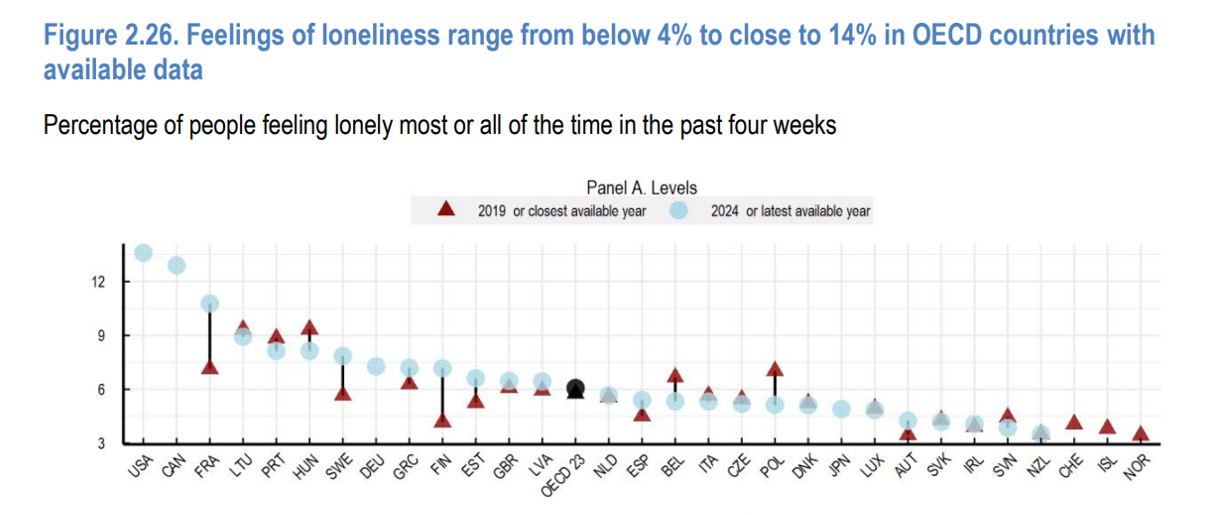
A new report from the OECD asks the question, “How’s Life?” with the tagline letting us know the plotline focuses on “well-being and resilience in times of crisis.” The Organization of Economic Cooperation and Development (OECD) has tracked the well-being of member nations for the past six years, taking a broad view on the definition of holistic health — including physical, mental, financial, and social aspects of people living in OECD countries. The first “How’s Life?” report was published at the height of the global financial crisis; the authors of this report introduce it saying that, “the
Doctors’ Recommendations Are Top Motivators for Consumers Who Buy Digital Health Devices: Trust and Health
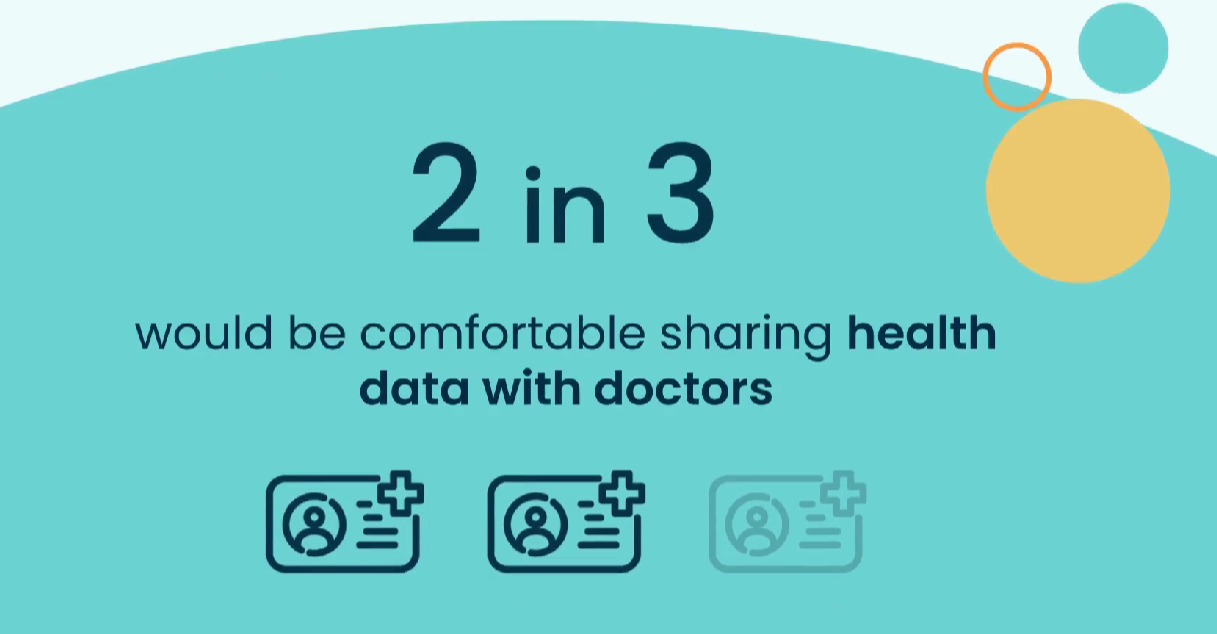
Most consumers using digital health devices felt more trust in the technology when coupled with doctors’ office reviews — another lens on the importance of trust-equity between patients and physicians. This insight came out of a report on How Consumers Purchase, Use and Trust Medical Devices based on market research sponsored by Propel Software. For the study, Propel Software engaged Talker Research to conduct a survey among 2,000 U.S. adults in October 2024 to gauge peoples’ views on digital health tools, buying trends, and trust. Start with the rate of 1 in 4 Americans’ experience
We Are Stressed in America – APA’s 2024 Stress in America Survey on “A Nation in Turmoil”
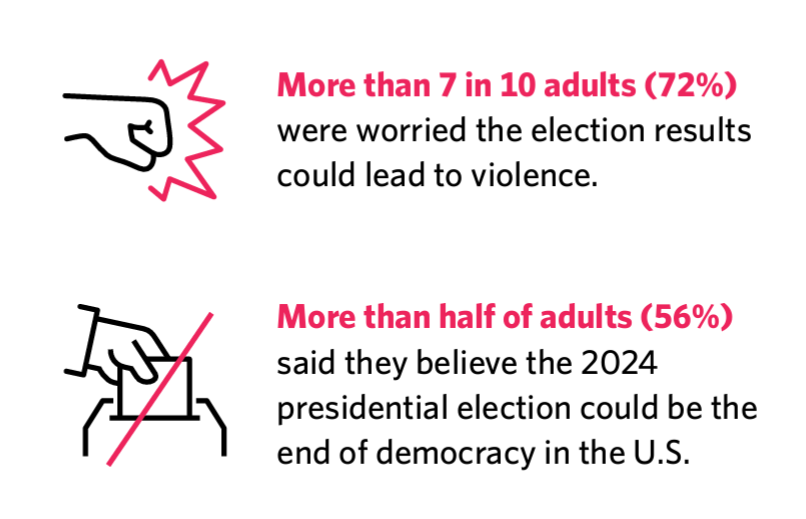
Two in three people in the U.S. are dealing with Presidential Election Stress — a significant contributor to Americans’ overall stress we learn from the American Psychological Association’s study into Stress in America 2024. I’ve covered the APA’s Stress in America studies for many years, appreciating the role that anxiety and stress play in peoples’ overall health status and well-being. In 2024, “stress” is a mainstream factor in daily life whether you identify with Main Street or Wall Street. Here was my most recent post on the APA study here in Health Populi,
Closing the Chasm Between Patients and Clinicians With Digital Health Tools – Some Health Consumer Context for #HLTHUSA
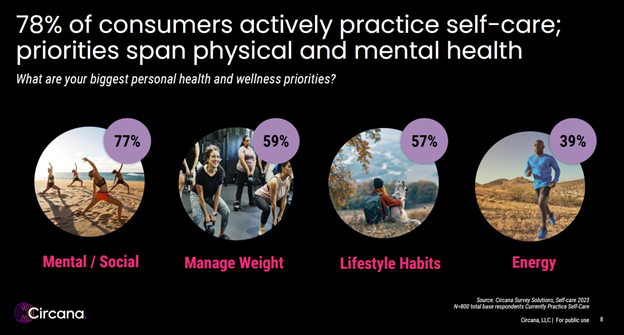
As the annual HLTH conference convenes this week in Las Vegas, numerous reports have been published to coincide with the meeting updating various aspects of technology, health care, providers and patients. In this post, I’m weaving together several of the papers that speak to the intersection of health care, consumers, and technology – the sweet spot here on Health Populi. I hope to provide attendees of HLTH 2024 along with my readers who aren’t in Vegas useful context for assessing the new ideas and business model announcements as well as a practical summary for those of you in planning mode for
The Smart Home for Health, Brought to You by Samsung and Ashley

Today I am keynoting the OSF Digital Health Symposium in Peoria, IL, discussing The State(s) of Digital Health. A double-entendre intended, one of the states I’ll be discussing is the migration of acute care back to peoples’ homes, embedded with sensors, householders donning smart rings, and rooms fitted with Internet-of-Things for health and well-being. In this context, news that Samsung has begun to partner with Ashley, the national furniture dealer, struck me as interesting and important. I visited the Samsung Health House at CES 2024 last January: here is my write-up about what I
Growing Investments in Digital Health Are Driven by Consumer Demand, Clinical Outcomes, and Cost-Savings
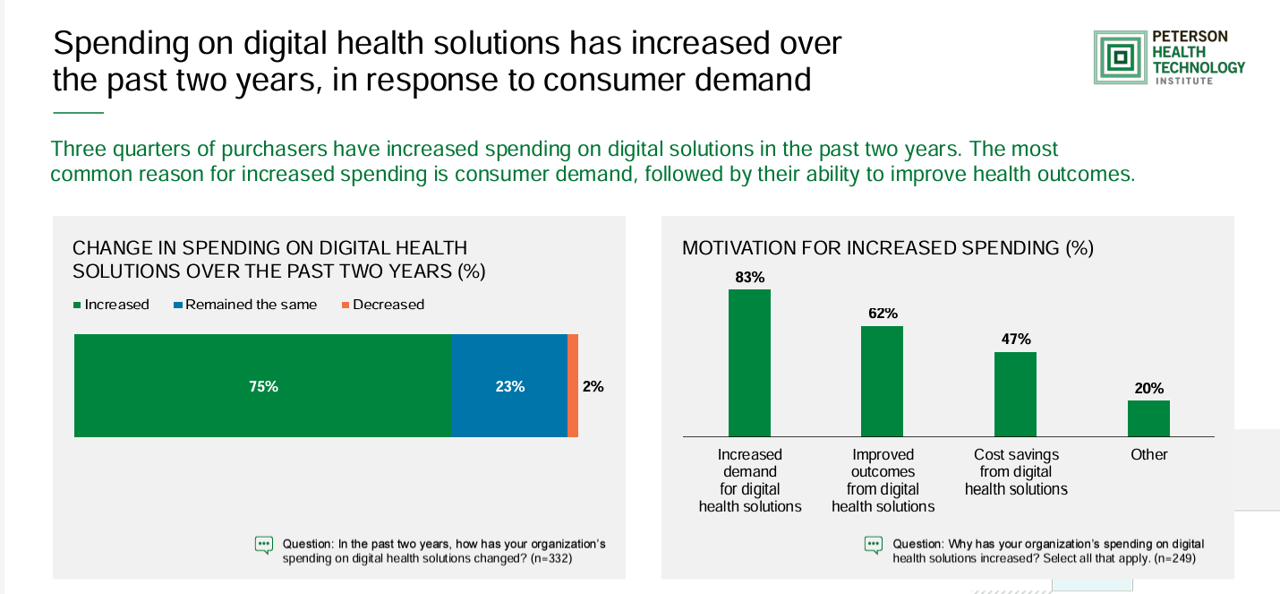
The marketing for purchasing digital health technologies is expecting to grow, driven by increased consumer demands for tech-based solutions, improved outcomes enabled through the innovations, and cost savings derived from deploying the technologies. That’s the top-line finding in the 2024 State of Digital Health Purchasing from the Peterson Health Technology Institute (PHTI). PHTI surveyed 322 digital health decision makers working in employers, health plans, and health systems, fielding the study in July and August 2024. 3 in 4 purchasers grew spending on digital health technologies in the past two years,
Well-Being Burnout – Lululemon’s 4th Annual Study Into Our Pressured Lives

Lululemon has published the 2024 Global Well-Being Report, a study into peoples’ perspectives on their personal health from the company best known for athleisure wear and self-care. This year’s report is titled, The Pressure to Be Well. That pressure is coming from peoples’ experiencing “well-being burnout.” In the company’s fourth annual report on well-being, Lululemon learned that most people have tried to adopt personal strategies to bolster their health, and one-half of these folks are confronting “well-being burnout.” Lululemon collaborated with Edelman Data & Intelligence to field the study in April and May 2024 in 15 markets where the company
All Heart – Thinking Hearts, Health, and Love in Valencia, Spain

The clinical evidence base continues to grow making the case that art and creativity can be drivers for health and well-being — as it’s proven to me in my own life. Most recently, cases have been made by Emily Peters, documented in her book Remaking Medicine; by Robin Strongin, advocate for arts, medicine, and well-being from her base in Washington, DC; and, by my Belgium-based colleague and friend Koen Kas whose book addressing themes of art and health will soon be published. I was inspired at the convergence of art and well-being during a visit on 20 September to the
Best Buy Health’s Latest Insights into Technology and Care at Home
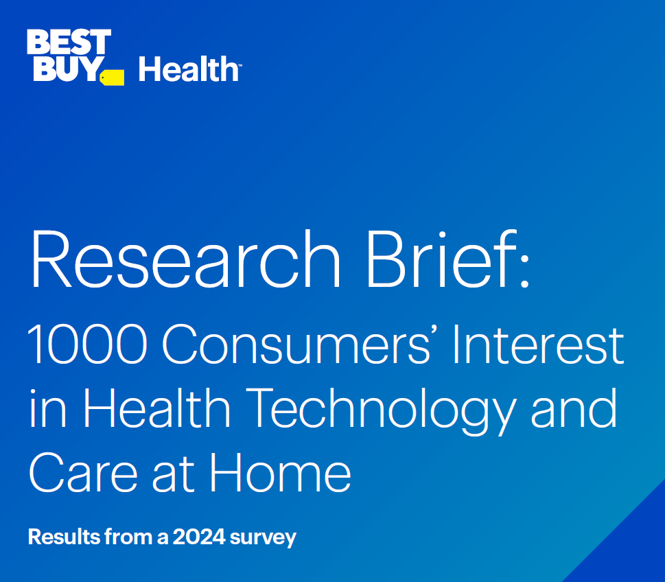
In the U.S., aging in and staying at home is a priority for most people over the age of 45 — and for nearly one-half of younger people between 18 and 44 — we learn in Best Buy Health’s Research Brief discussing the company’s survey of 1,000 U.S. consumers. Best Buy Health, the health-focused operation which is part of the electronics retailer Best Buy, worked with Sage Growth Partners to assess 1,000 U.S. consumers, 18 years and over, on their perspectives on health care, technology, aging in place, and caregiving. The research was fielded
Retail Health Update for Pharmacy – Mail Order Beats Brick & Mortar, J.D. Power Finds
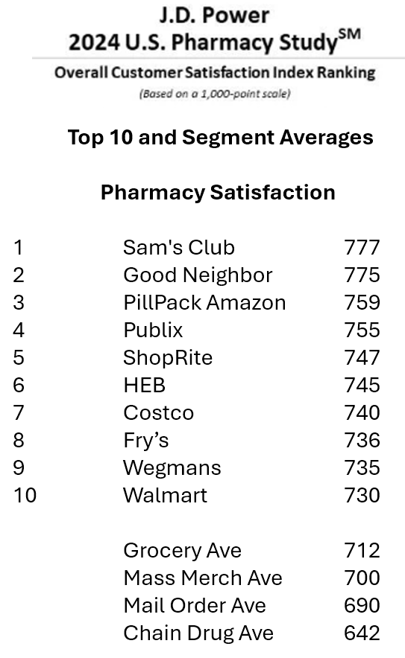
People have been undergoing their own human kind of digital transformations, turbocharged during the pandemic for many who never used Zoom or Amazon Prime or Uber. That consumer-borne digital transformation has shaped people as health consumers, many having used telehealth and appointment-scheduling online. And peoples’ relationships with pharmacies are also changing, with more health consumers finding greater satisfaction with their mail order pharmacy experiences than with moat retail brick and mortar chain drug stores, the latest J.D. Power 2024 U.S. Pharmacy Study found. It’s clear that mail order is
Older Americans Mostly Receptive to Apps for Health, but Chronically Ill People Could Use a Nudge (and a Payer)
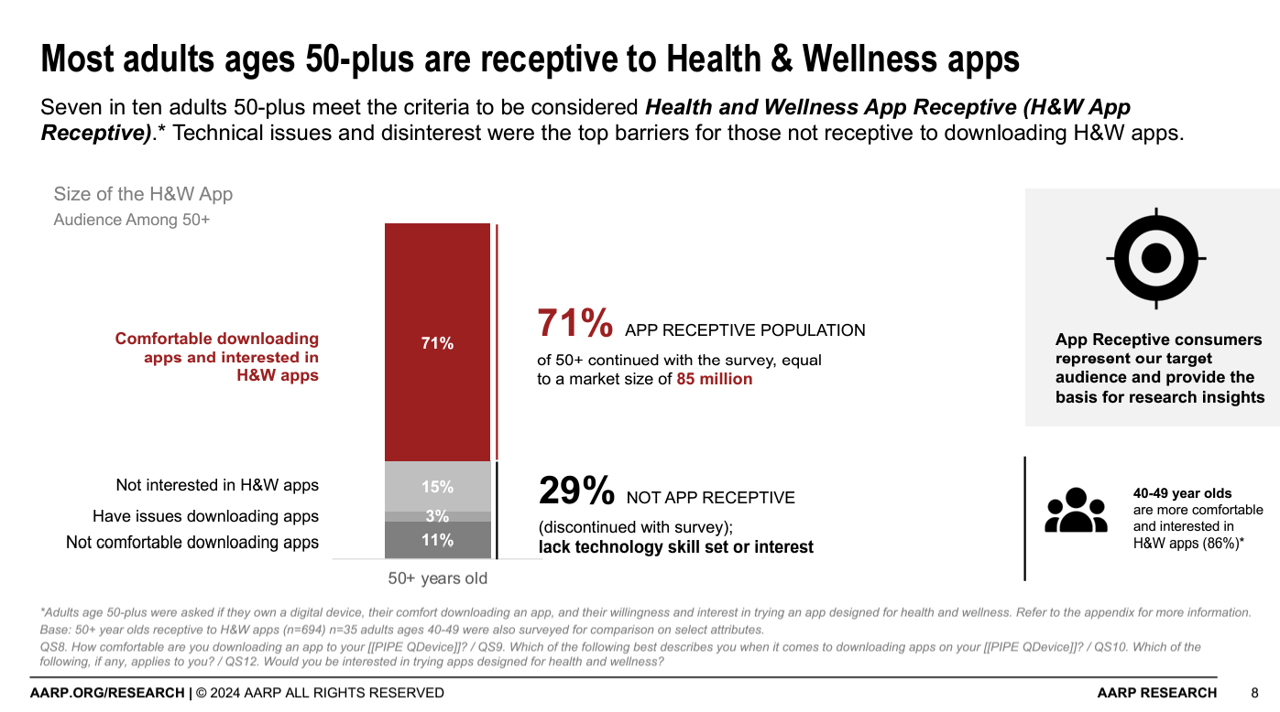
AARP found that 7 in 10 people ages 50+ are “app-receptive” for health and wellness apps in Unlocking Health and Wellness Apps: Experiences of Adults Age 50-Plus, a summary of research conducted with U.S. consumers 50 and over from AARP. The methodology for this study included only older consumers who were comfortable in downloading apps to smartphones or tablets, and were willing to do so — whom AARP considered the target audience for this research. In addition, the respondents surveyed were also at least interested in trying apps designed for health and wellness, thus dubbed “health
Globally Patients Seek Clear Communications to Build Trust with Healthcare, Especially in the AI Era
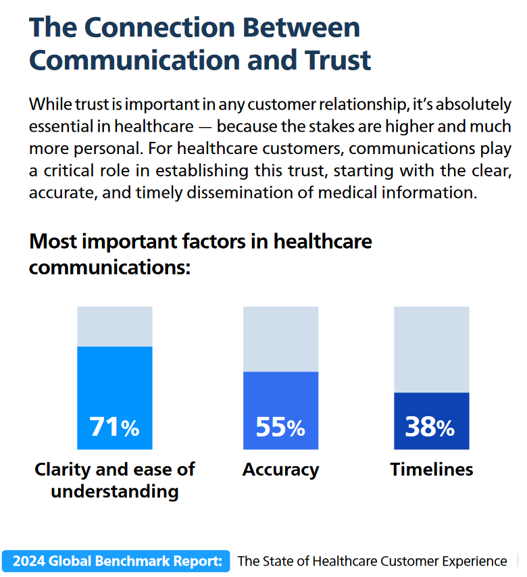
Globally, patients are growing consumer muscles leaning into trust that’s building on communications that connect with them, based on insightful research from Smart Communications. This consumer research was fielded by Toluna and Harris Interactive in February and March 2024. In The State of Customer Conversations, the report assesses input from global consumers from the APAC region (Australia, New Zealand, China, Hong Kong, Taiwan, Japan, and Singapore), German-speaking markets (Austria, Germany, Switzerland), the United Kingdom, and the U.S. The research revealed five key findings, shown in the first exhibit: Communications are increasingly important
Will the Apple Watch, Samsung Galaxy or Oura Rings Become “Intelligent Guardians” For Health?
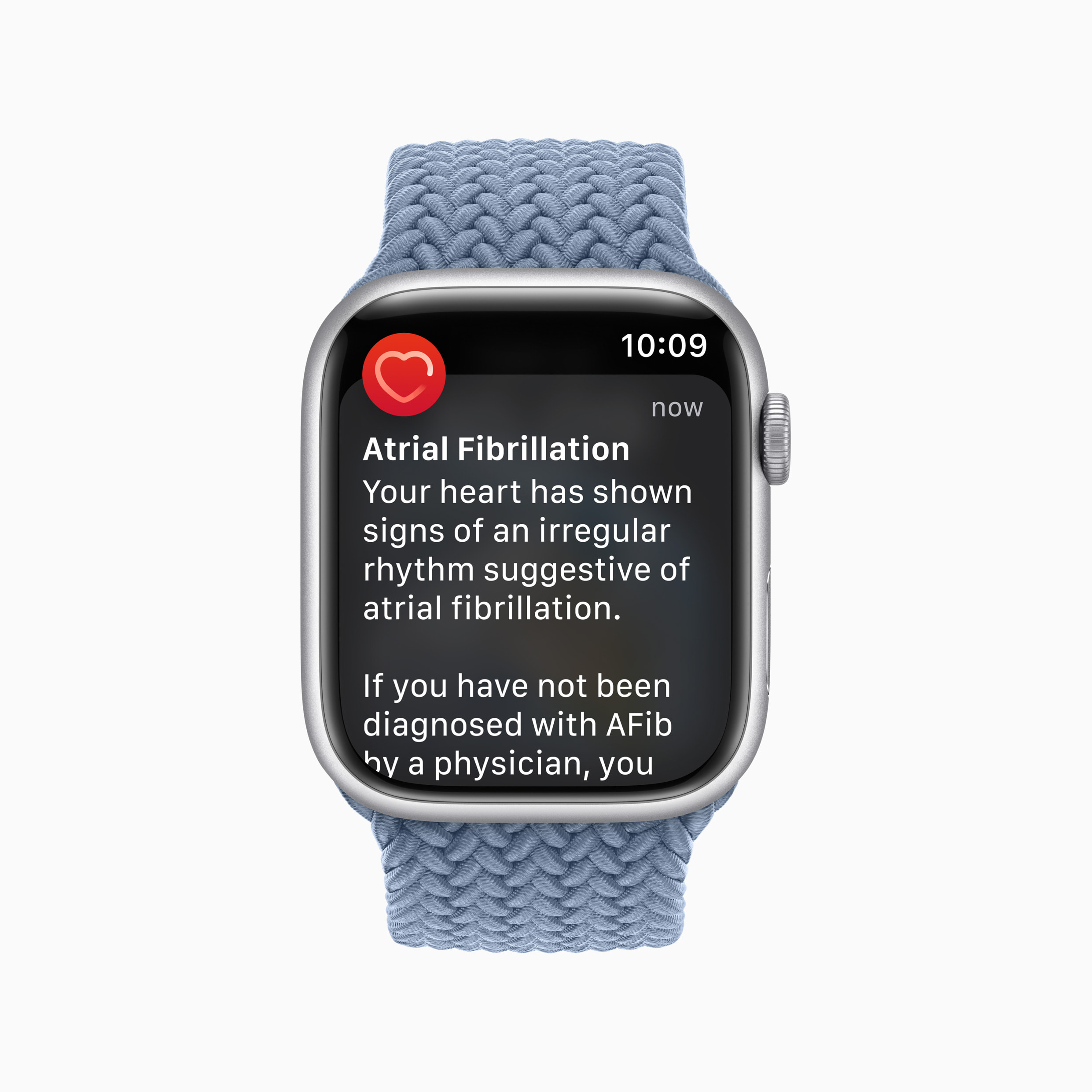
One of the few bright spots in consumer technology spending in the past couple of years of the U.S. economic “vibecession” has been the category of smartwatches. The Wall Street Journal recently talked, specifically, about the growing role of the Apple Watch for health care, gaining traction as a part of cardiologists’ and other physicians’ testing for and adoption of the wearable tech device for patients who are managing medical conditions. Data from CTA, the Consumer Technology Association, has been tracking such spending which I’ve often discussed here in Health Populi
On This July 4th 2024, Let’s Remember the Doctors Who Have Helped Patients Declare Their Independence – Wisdom from Michael Millenson
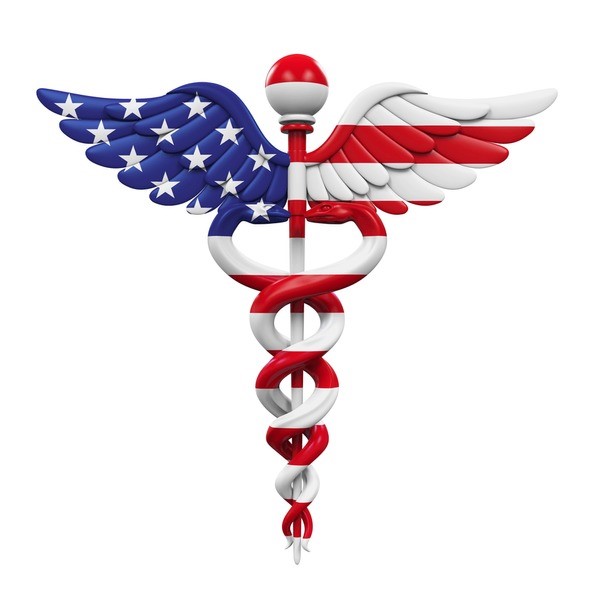
“’A reform,’ wrote a 19th-century British parliamentarian, ‘is a correction of abuses. A revolution is a transfer of power. As we celebrate the American Revolution, catalyzed by men who broke ranks with their peers to overthrow a power structure that seemed immutable, let’s also celebrate those physicians who broke with their peers and declared independence for American patients.” So begins an informative, timely essay on participatory medicine and patient engagement researched and beautifully written by Michael Millenson, whom I am blessed to call both dear friend and professional colleague. Michael’s essay on the
Can AI Help to Improve Health Equity? U.S. Scientists Weigh In With “Yes,” Baking in Ethics and Accountability
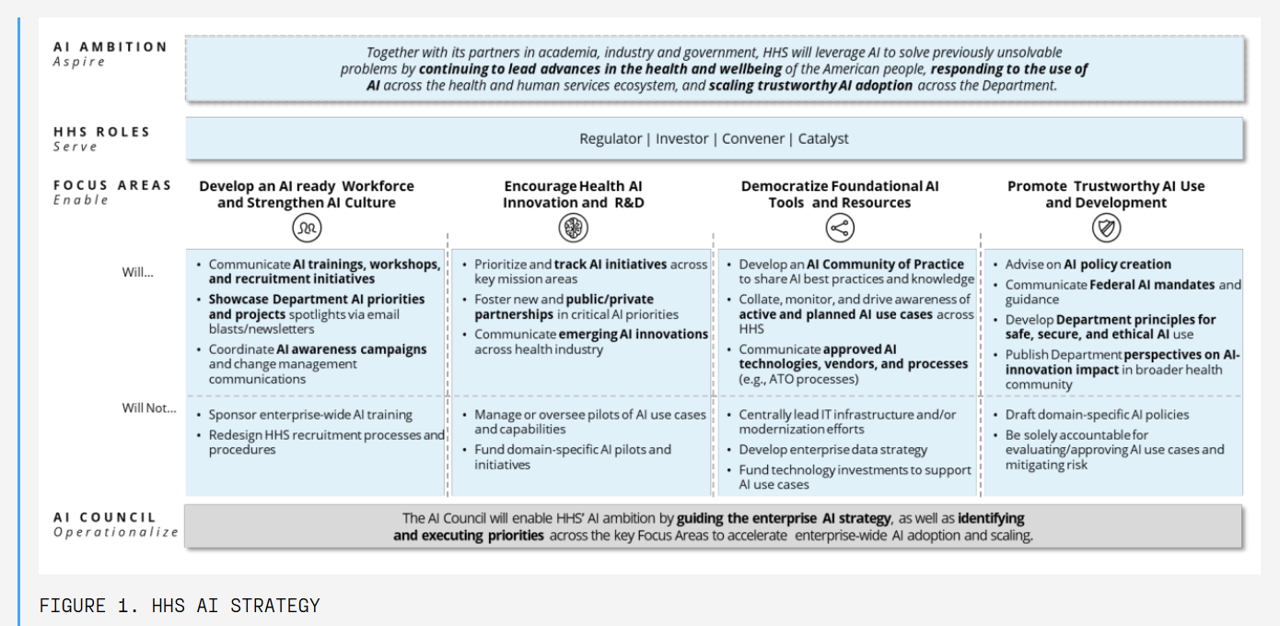
The Federation of American Scientists (FAS) was founded in 1945 by a group of scientists concerned about the atomic bomb — sharing a mission to focus on technology, science, and innovation to, in the Association’s words, “work toward a safer, more equitable, and more peaceful world.” Nearly 80 years after the organization’s launch, the FAS is focusing on the growing role of artificial and augmented intelligence across the many areas that touch peoples’ lives — including health care and well-being. The FAS published a state-of-the-nation essay on June 27 on Improving Health Equity Through AI.
“Listen to Me:” Personalization in Health Care Starts With Taking Patients’ Voices Seriously – the 15th Beryl Institute-Ipsos PX Pulse Survey
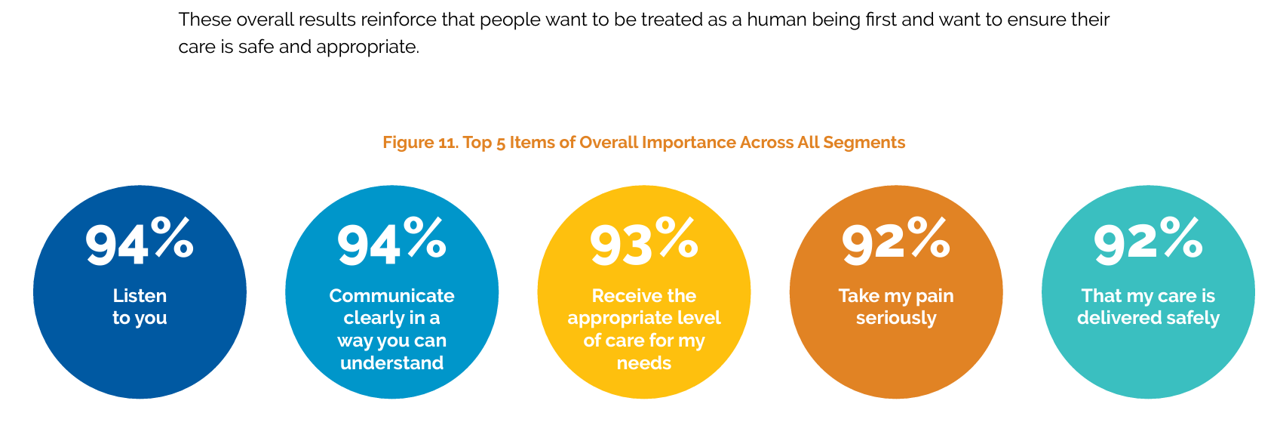
Patients’ experience with health care in the U.S. dropped to its lowest point over the past year, explained in the 15th release of The Beryl Institute – Ipsos PX Pulse survey. The study into U.S. adult consumers’ perspectives defined “patient experience” (PX) as, “The sum of all interactions, shaped by an organization’s culture, that influence patient perceptions across the continuum of care.” The survey was fielded by Ipsos among 1,018 U.S. adults in March 2024. Health care providers (and other industry stakeholders that go B2B or B2B2C (or P) are all thinking
Health Information Security – My Interview with Richard Kaufmann, CISO of Amedisys, Part 3: The Futures of Cybersecurity in Healthcare
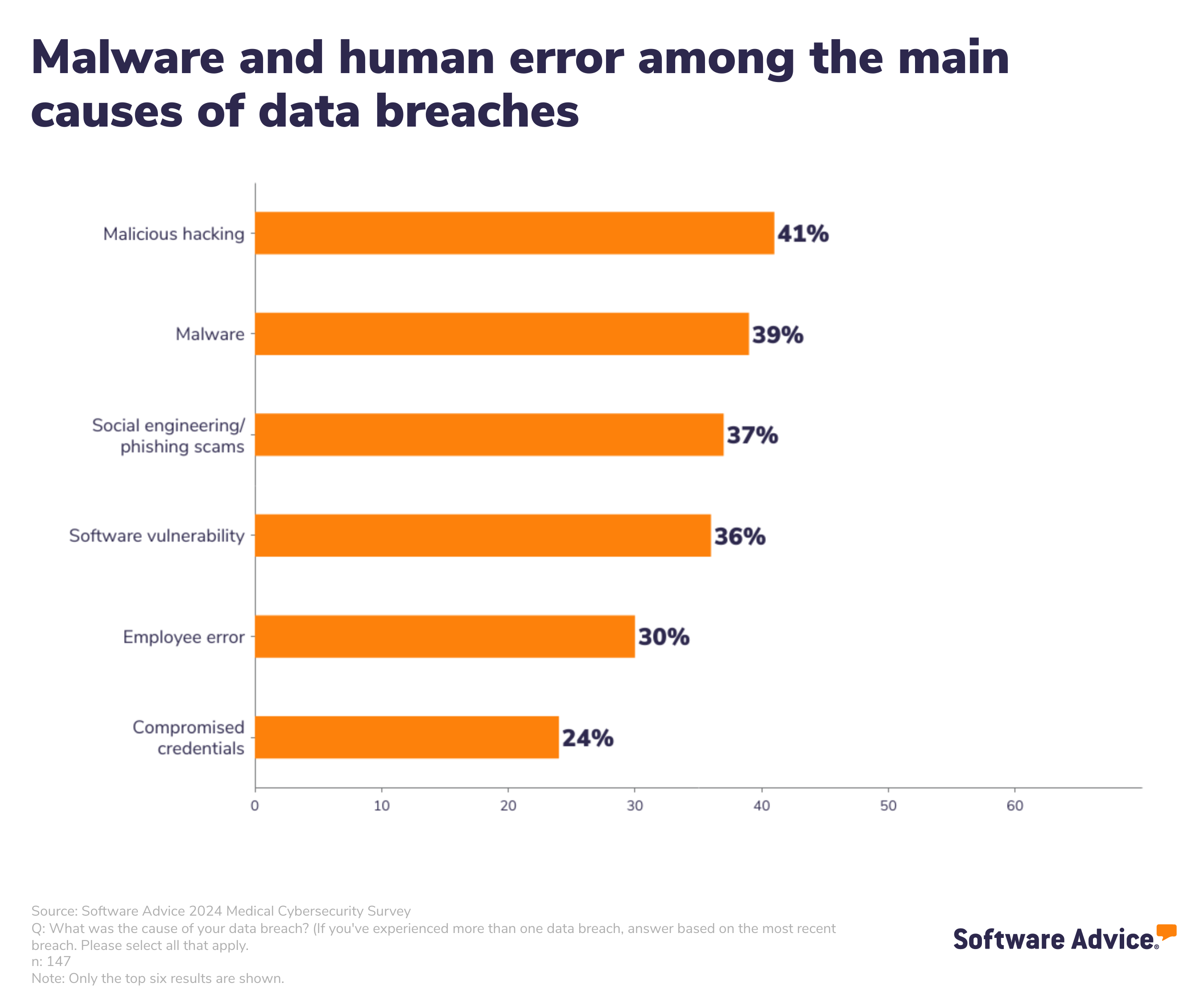
At least one-half of U.S. health care organizations have experienced a data breach, one-third in the last 3 years, according to Software Advice’s 2024 Healthcare Data Security Survey released in May 2024. Of the health care organizations who experienced ransomware attacks, one-third did not recover patient data from the cyber-attackers, Software Advice learned. Clearly, cyberattacks are impacting patient care. And the growth of home care, hospital-to-home, and greater self-care are also increasing risks for cybersecurity. The growing adoption of digital technologies in healthcare, from the hospital to the doctor’s office to the home,
How to Get Better Care to More People? Address Burnout, Bridge Insights with AI, Embed Sustainability – the Philips Future Health Index 2024
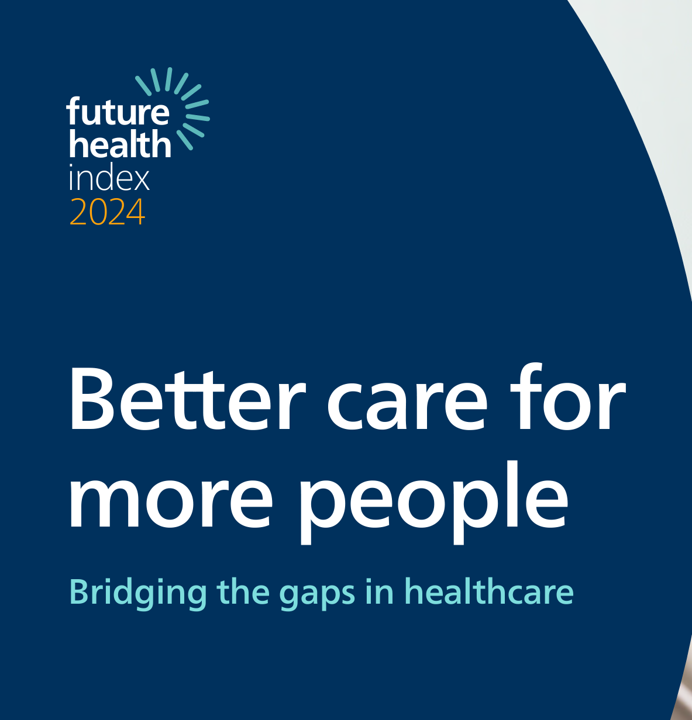
Health care access is a challenge in rural and urban areas, cities and suburbs, and across more demographic groups than you might realize, as we see wait times grow for appointments, primary care shortages, and delays in screening plaguing health systems around the world. In the Future Health Index 2024, Philips’ latest annual report presents a profile of the state of health care focused on how to provide better care for more people. For the report, Philips surveyed a total of 2,800 healthcare leaders consisting of 200 respondents in 14 countries: Australia, Brazil, China,
Is There an Easy-Button for AI In Healthcare Team Well-Being? Exploring a New PC with Embedded AI
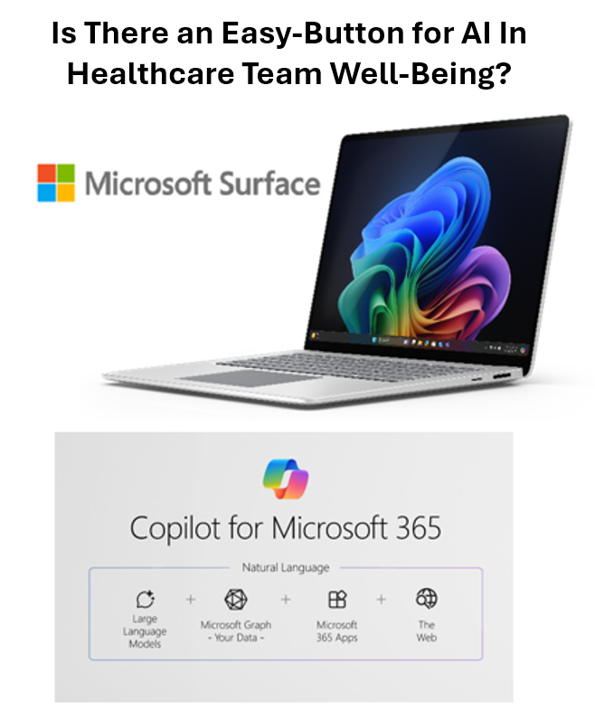
“The greatest opportunity offered by AI is not reducing errors or workloads, or even curing cancer: it is the opportunity to restore the precious and time-honored connection and trust,” Dr. Eric Topol wrote in his 2019 book, Deep Medicine: How Artificial Intelligence Can Make Healthcare Human Again. In the five years since Dr. Topol looked for AI to bolster the human-touch in health care, we’ve lived, worked, and muddled our way through the COVID-19 pandemic and witnessed the growing epidemic of burnout among clinicians, the front-line of medical care. I recalled Dr. Topol’s assertion on AI’s promise for humanizing health
The ROI on Patient Experience = Loyalty, Trust and Revenue – Listening to Accenture
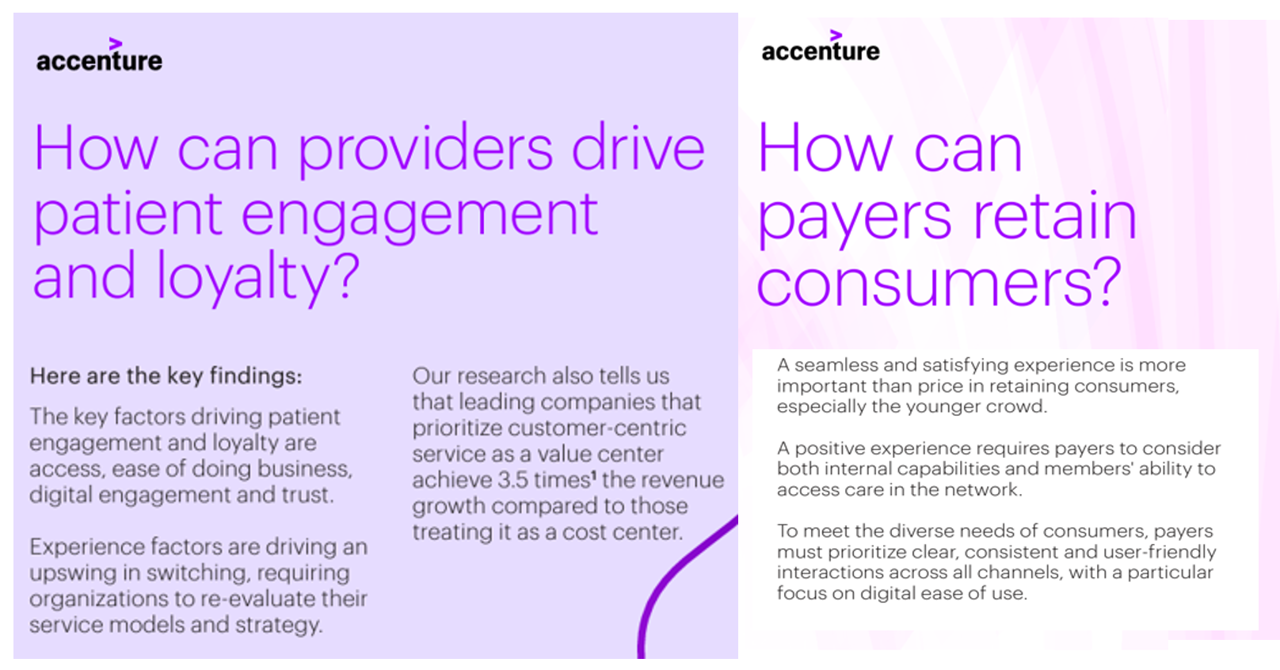
When health care providers and payers make patients’ lives easier, there’s a multiplying factor for loyalty and revenue growth, according to Accenture’s latest look into the value of experience in The Power of Trust: Unlocking patient loyalty in healthcare. Accenture conducted two surveys for this research, assessing nearly 16,000 U.S. adult consumers’ views on healthcare providers and health insurance plans. Several factors underpin patients’ selection of a new health care provider, especially: Access (70%), with a convenient location, quickly available appointments, digital/mobile/social interactions, and virtual care availability; and, The provider being a trusted source
Health Information Security – My Interview with Richard Kaufmann, CISO of Amedisys – Part 2: Bit by Bit, Putting It Together – Planning, Implementing, Pivoting
Welcome to post #2 of 3, publishing the results of three dialogue sessions between Richard Kaufmann, CISO of Amedisys, and me. The timing of our conversations, tracking both Richard’s and the company’s evolving approach to cybersecurity in health care, has coincided with the Change Healthcare breach and ransom that emerged in February 2024. This second blog of the three is being edited just days after Andrew Witty’s testimony to the U.S. Senate Finance Committee which convened a hearing on May 1st themed, “Hacking America’s Health Care: Assessing the Change Healthcare Cyber Attack and What’s Next.” UnitedHealth Group acquired Change Healthcare
Health Information Security – My Interview with Richard Kaufmann, CISO of Amedisys – Part 1: Origin Stories, the Security Ecosystem, and the Start Line

“If data is everywhere, how do you protect it?” This thought has been on my mind well before the Change Healthcare hacks (that’s plural) with which U.S. health care stakeholders are still dealing as this post goes live on the Health Populi blog. It’s a question posed to me in conversation with Richard Kaufmann, Chief Information Security Officer (CISO) with Amedisys. I’m grateful for the opportunity to explore in depth the many facets of cybersecurity in health care with Richard – the growing threats, the impact on providers, the state of technology and innovations to manage risks, and his evolving
Healthcare 2030: Are We Consumers, CEOs, Health Citizens, or Castaways? 4 Scenarios On the Future of Health Care and Who We Are – Part 2
This post follows up Part 1 of a two-part series I’ve prepared in advance of the AHIP 2024 conference where I’ll be brainstorming these scenarios with a panel of folks who know their stuff in technology, health care and hospital systems, retail health, and pharmacy, among other key issues. Now, let’s dive into the four alternative futures built off of our two driving forces we discussed in Part 1. The stories: 4 future health care worlds for 2030 My goal for this post and for the AHIP panel is to brainstorm what the person’s
A Vote for Telehealth is a Vote for American Patients’ and Doctors’ Well-Being
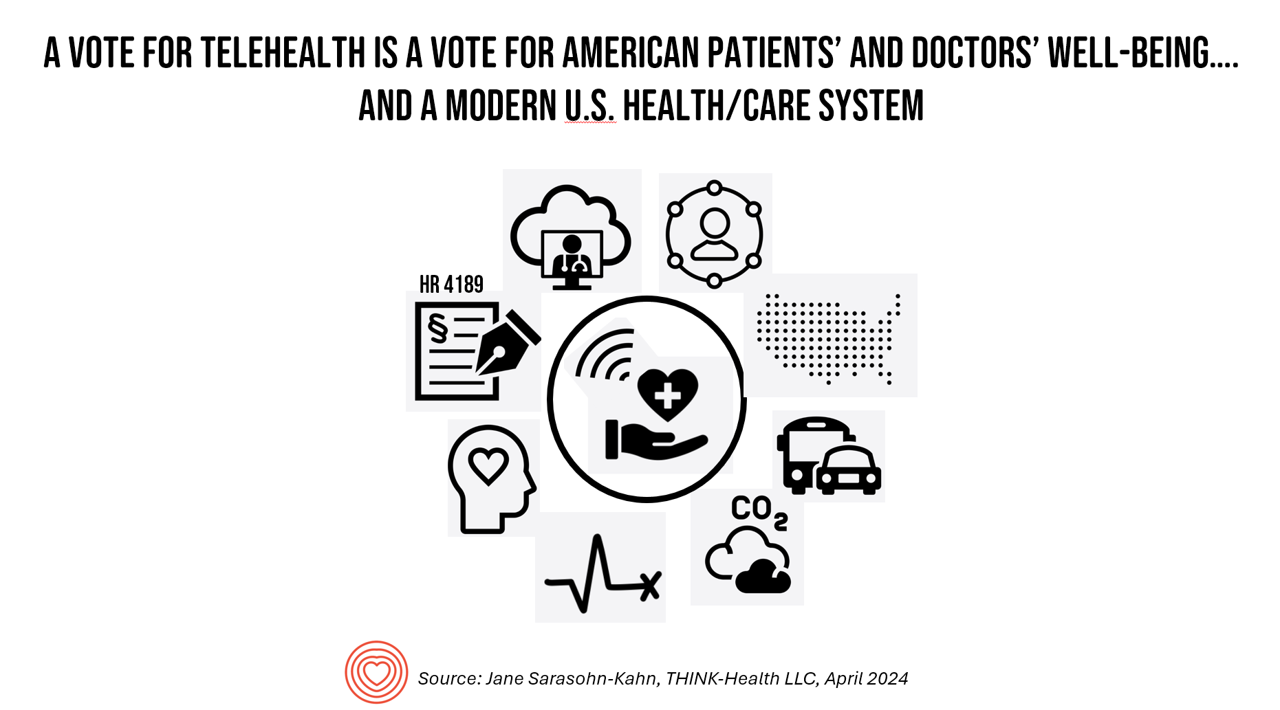
Whether you’re a patient or a physician in the U.S., you’re burned out, tapped out, stressed out, timed out. While the 118th U.S. Congress can’t agree on much before the 2024 summer recess, there’s one bipartisan stroke of political pens in Washington, DC, that could provide some satisfaction for both patients and doctors: bring telehealth back to patients and providers permanently. Those pens would do two things to modernize American health care for both patients and doctors: first, Congress would pass the CONNECT for Health Act (HR 4189. S 2016) and second, re-introduce and sign the Telehealth Modernization Act.
A Springtime Re-Set for Self-Care, From Fitness to Cozy Cardio: Peloton’s Latest Consumer Research

How many people do you know that don’t know their cholesterol or their BMI, their net worth or IQ, their credit score, astrological sign, or ancestry pie-chart? Chances are fewer and fewer as most people have gained access to medical records and lab test results on patient portals, calorie burns on smartwatches, credit scores via monthly credit card payments online, and completing spit tests from that popularly gifted Ancestry DNA test kits received during the holiday season. Meet “The Guy Who Didn’t Know His Cholesterol” conceived by Roz Chast,
Consumers Are So Over Their Paper Chase in Health Care Payments
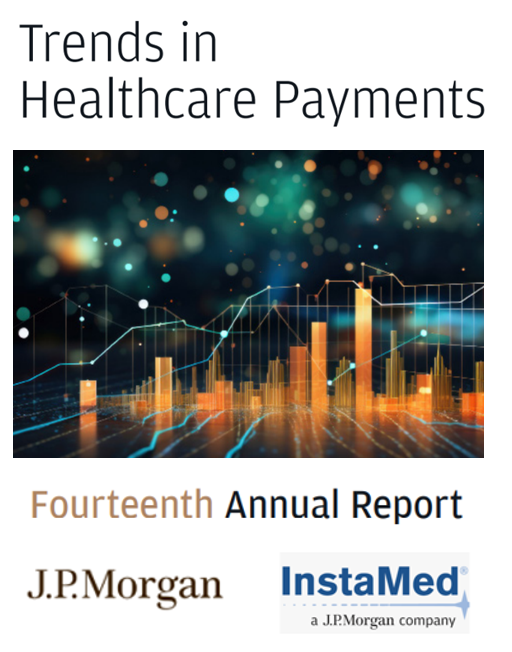
As we start the month of April 2024 in the U.S., it’s tax season in America with Federal (and other) income taxes due on the 15th of the month. This is also the time my research clock alarm goes off for an important annual report that describes the latest profile of the patient-as-payer in the U.S. ‘Tis the season for J.P. Morgan’s InstaMed team to analyze health care payments data, describing the experiences of consumers, providers and payers in the Trends in Healthcare Payments Fourteenth Annual Report. The overall takeaway for
AI: Patients Included

“Clinical transformation with AI is easier without patients.” When Dr. Grace Cordovano heard this statement on a panel of physicians convening to share perspectives on the future of AI in health care held in early March 2024, the board-certified patient advocate felt, in her words, “insulted on behalf of the patient communities I know that are working tirelessly to advance AI that works for them.” “The healthcare ecosystem and policy landscape must formally recognize patients as end-users and co-creators of AI,” Cordovano wrote to me in an e-mail exchange. “Patients, their care partners, caregivers, and advocates are already utilizing AI
The Economic Contours of the Change Healthcare Cyber Attack: Taking Stock So Far
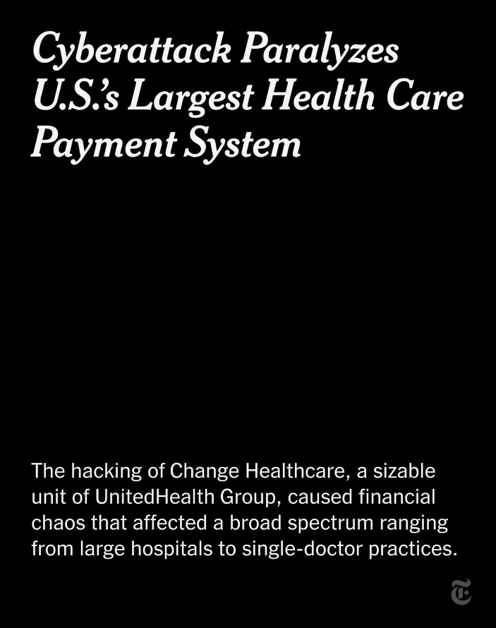
On February 22, 2024, I went to a CVS Pharmacy-Inside-Target in my community to fill a prescription for benzonatate 200 mg capsules. I had caught a bad case of the flu the week before, and subsequently suffered a very long tail of a cough. That’s TMI for me to write about in the Health Populi blog, but this story has a current-events twist: the pharmacist could not electronically link with my insurance company to transact my payment. He tried a few work-flows, and ended up using a discount card which in the moment worked for us, and I paid the
Hospital at Home: Prospects and Challenges, and Learnings from Best Buy Health
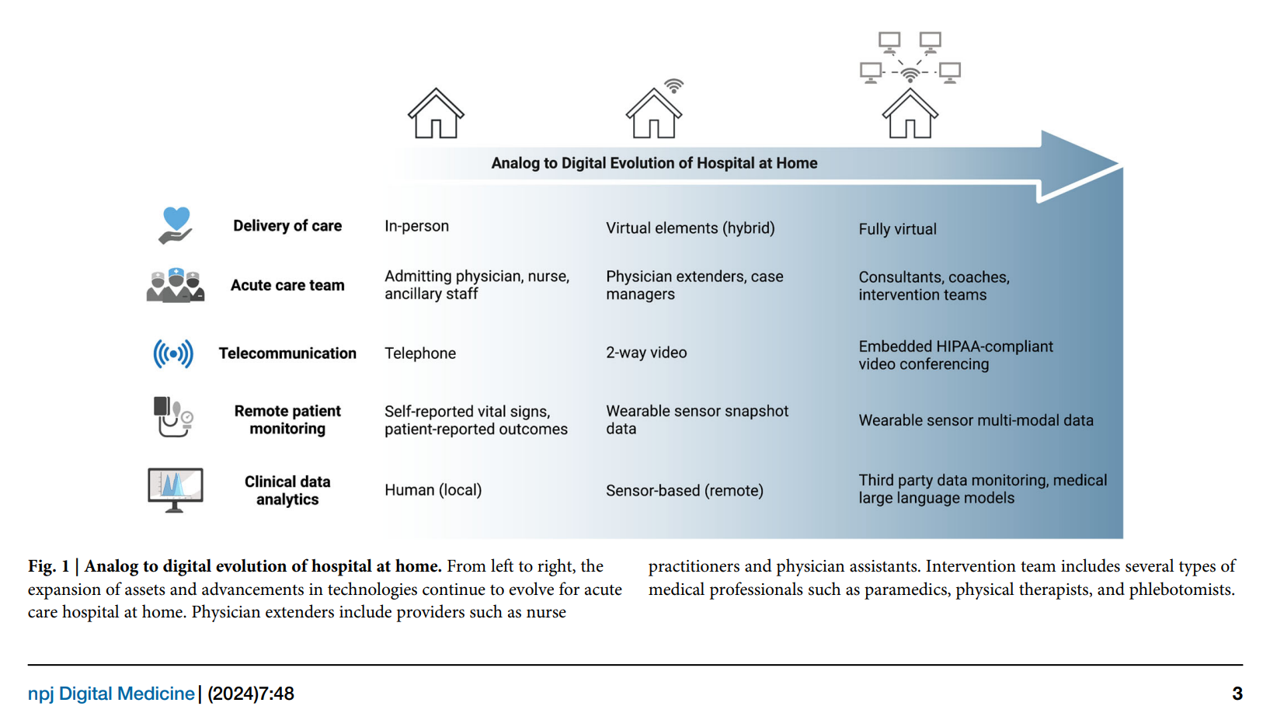
With the urgent need to identify more efficient and lower-cost health care delivery models, we look to growing evidence for digital health technologies that support the Hospital at Home (HaH) model, considered in a new review article published in late February in npj Digital Medicine, The hospital at home in the USA: current status and future prospects. Clinicians from Scripps Research and Johns Hopkins School of Medicine collaborated on this work, calling out the relatively fast adoption of HaH programs during the peak of the COVID-19 pandemic. In some parts of the world, such as Australia and Norway, “in-person at-home
How AI is Shaping the Patient and Clinician Experience – My Conversation with Microsoft
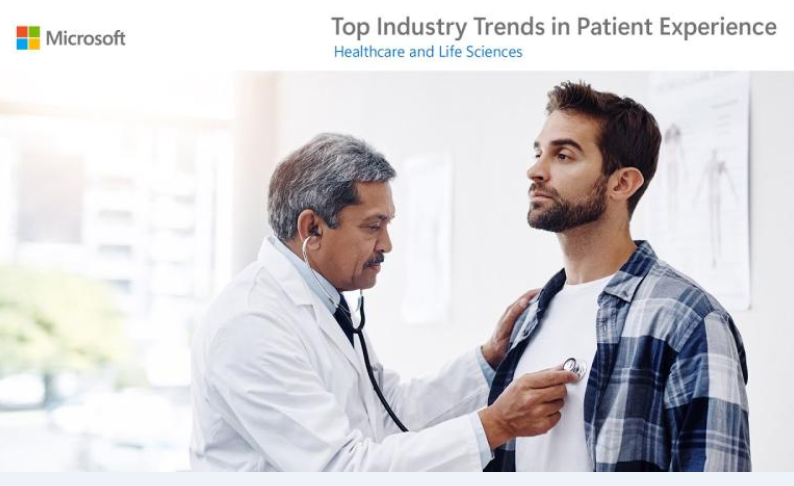
For change agents in health care, one of our True North paradigms is the Quintuple Aim. The five pillars of the Quint Aim grew from 3 goals of the Triple Aim: to improve patient experience, to drive better health outcomes, and to lower per patient costs. The Quadruple Aim added the goal of bolstering clinicians’ well-being (to address burnout, stress and depression), leading to the addition of health equity as the fifth objective. That happened in 2021, in the height of the COVID-19 pandemic which shined a bright light on health disparities, inequities, and risks in peoples’ social determinants of
Rebel Health: The Personal and Professional Passion of Susannah Fox
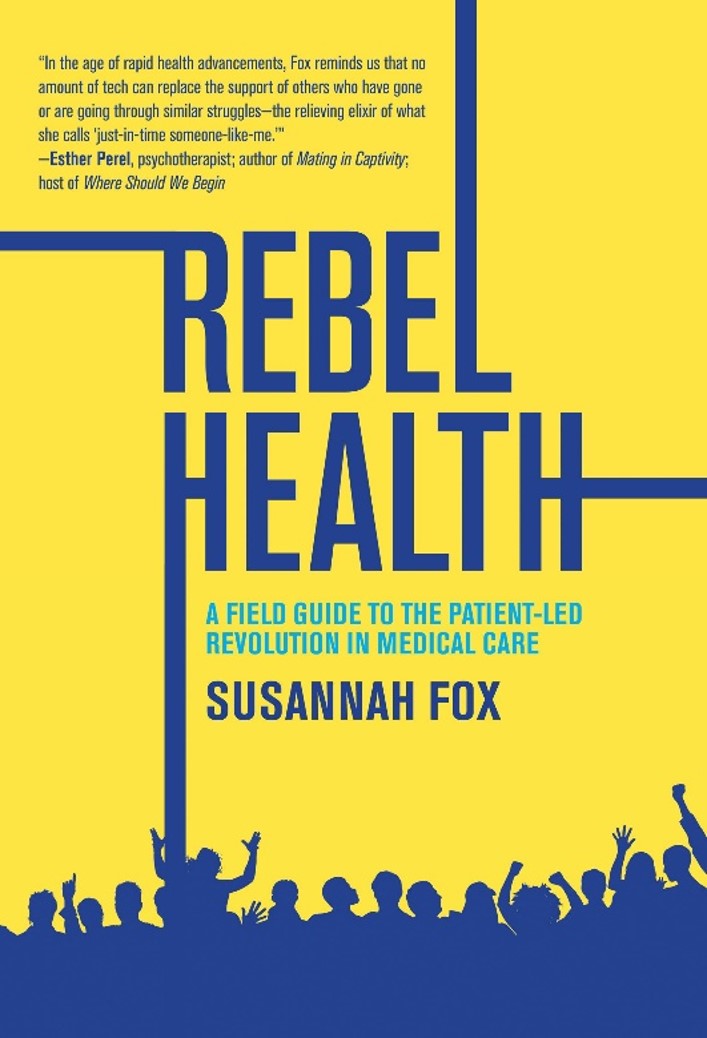
A “rebel” is both a noun and a verb. As a noun, Merriam-Webster tells us that a rebel is a person who opposes or takes up arms against a government or a ruler. As a verb, “to rebel” is to oppose or disobey one in authority or control, or otherwise renounce and resist by force the authority of one’s government.” An additional definition of the verb is, “to feel or exhibit anger or revulsion.” If you’ve been a patient facing a diagnosis of an illness, whether rare or common, you may well have felt these various feelings stirring inside your self.
From Evolution to Innovation, from Health Care to Health: How Health Plans With Collaborators Are Re-Defining the Industry
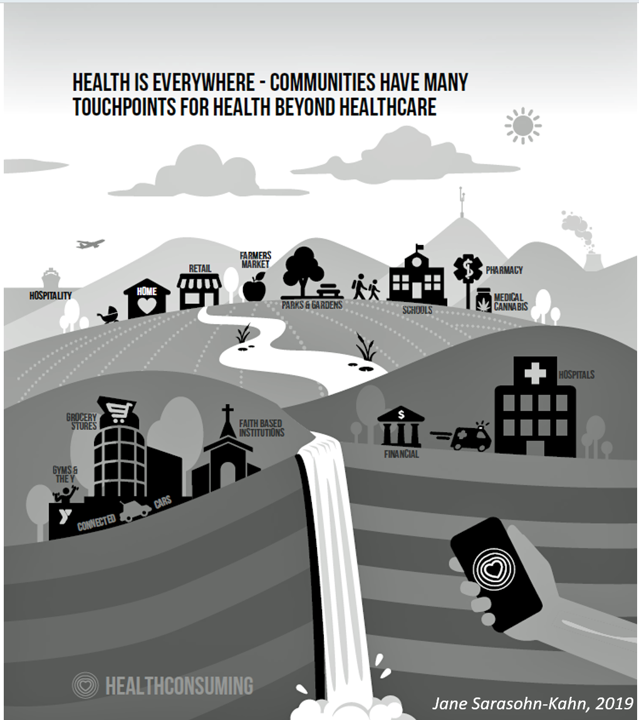
As a constant observer and advisor across the health/care ecosystem, for me the concept of a “health plan” in the U.S. is getting fuzzier by the day. Furthermore, health plan members now see themselves as medical bill payers, seeking value and consumer-level services for their health insurance premium investment. Weaving these ideas together is my mission in preparing a session to deliver at the upcoming AHIP 2024 conference in June, I’m thinking a lot about the evolving nature of health insurance, plans, and the organizations that provide them. To help me define first principles, I turned to the American father
Ethics for AI in Health – A View From The World Health Organization
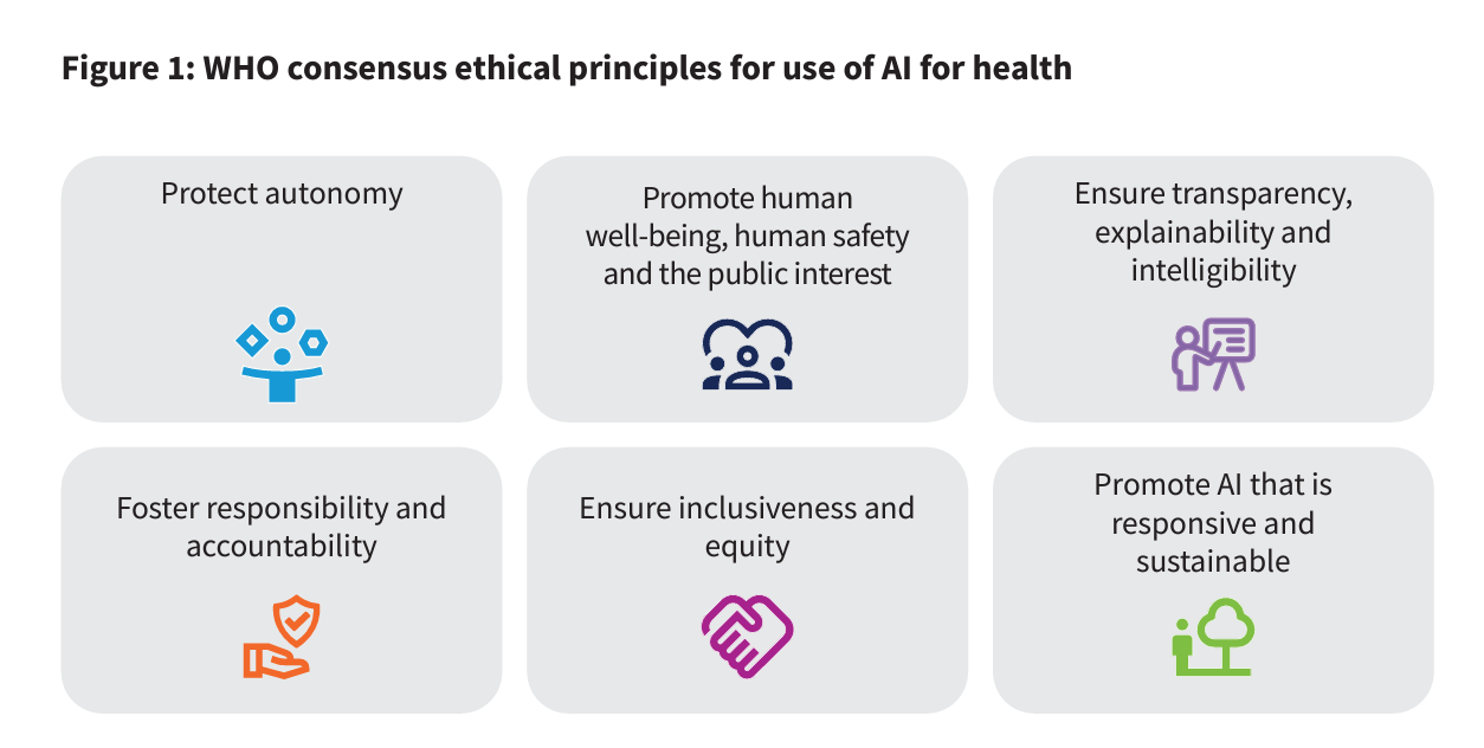
For health care, AI can benefit diagnosis and clinical care, address paperwork and bureaucratic duplication and waste, accelerate scientific research, and personalize health care direct-to-patients and -caregivers. On the downside, risks of AI in health care can involve incomplete or false diagnoses, inaccuracies and errors in cleaning up paperwork, exacerbate differential access to scientific knowledge, and exacerbate health disparities, explained in the World Health Organization’s (WHO) report, Ethics and governance of artificial intelligence for health. WHO has released guidance on the use of large multi-modal models (LMMs) in health care which detail 40+ recommendations for
Why Elevance Health is “Prescribing” Phones for Members
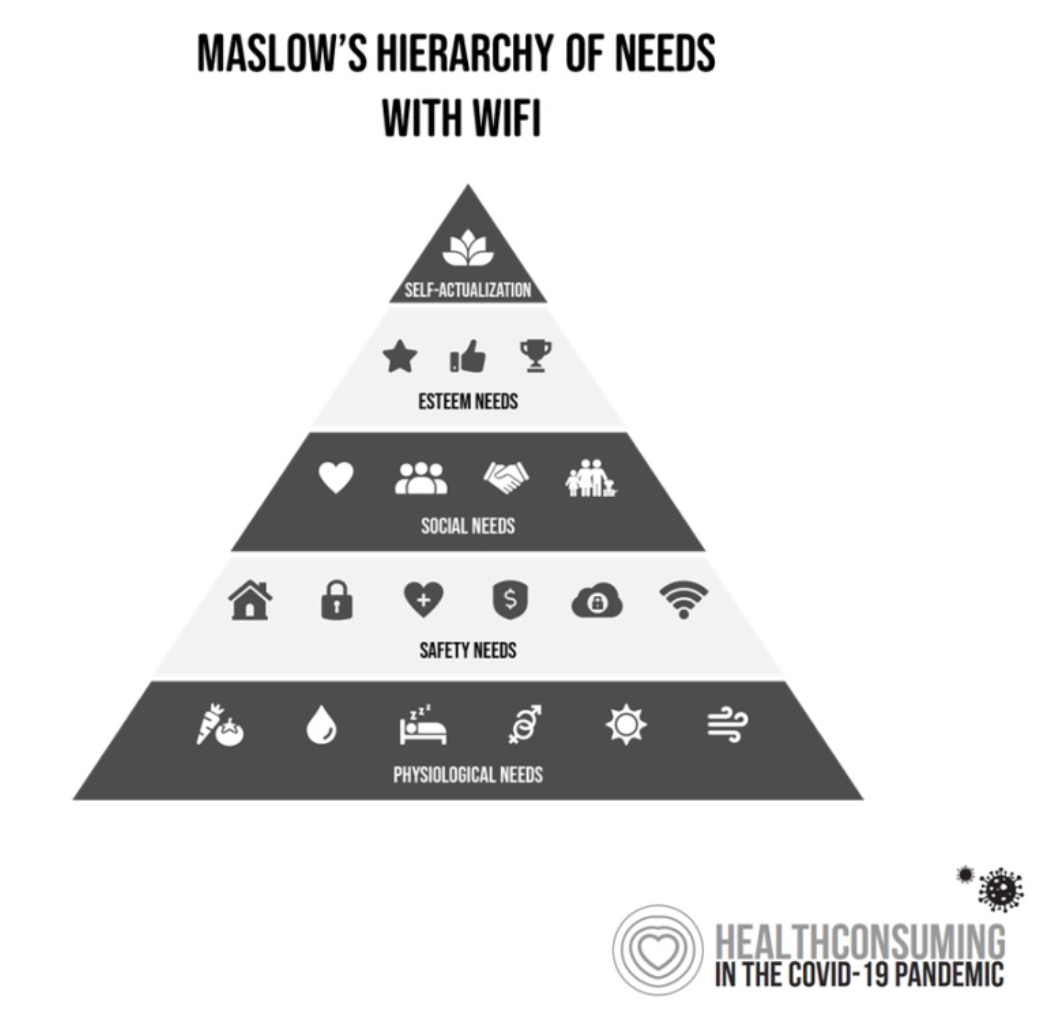
You’ve heard of food-as-medicine and exercise-as-medicine. Now we see the emergence of telecomms-as-medicine — or more specifically, a driver of health, access, and empowerment. Elevance Health, the health plan organization serving 117 million members, launched a program to channel mobile phones and data plans into the hands of some Medicaid plan enrollees, explained in the organization’s press release on the program. To implement this program and get connectivity into consumers’ hands and homes, Elevance Health is collaborating with several telecomms companies including Verizon, AT&T, Samsung, and T-Mobile. Funding is supported by the FCC’s Affordable Connectivity Program.
Thinking About Dr. Martin Luther King and Health Equity in 2024

Today as we appreciate the legacy of Martin Luther King, Jr., I post a photo of him in my hometown of Detroit in 1963, giving a preliminary version of the “I Have a Dream” speech he would deliver two months later in Washington, DC. Wisdom from the speech: “But now more than ever before, America is forced to grapple with this problem, for the shape of the world today does not afford us the luxury of an anemic democracy. The price that this nation must pay for the continued oppression and exploitation of the
A Tale of Two Houses: House Calls at #CES2024 with Amazon and AARP + Samsung
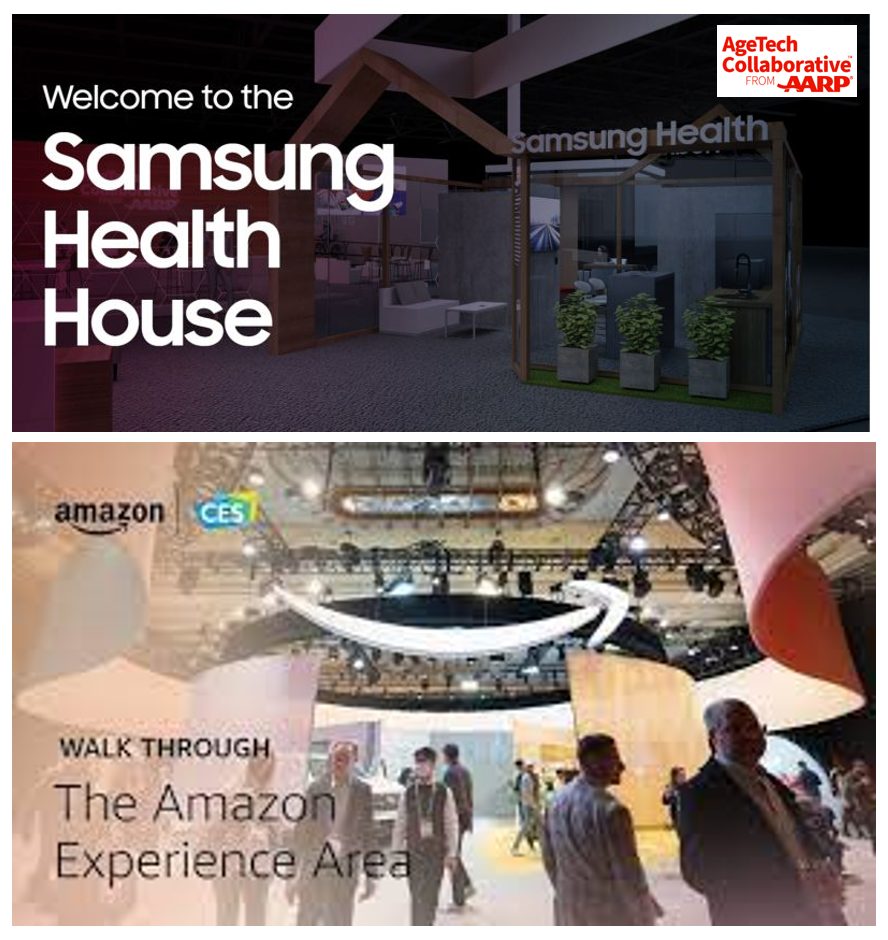
The growing movement of health care to the home is evident by a growing list of point solutions featured at CES 2024. Digital health has been a fast-growing category of consumer-facing devices at CES for over a decade. But with the growing ubiquity of connectivity, cloud computing, sensors and this year AI “everywhere,” a person’s home as their health-hub is an increasingly practical scenario. I track many categories of products at CES each year, and this year added into my portfolio the smart kitchen and smart bathroom. We’ve had components of these two
HeartMates, Bringing Community and Heart Health Love from Damar Hamlin – Abbott at #CES2024

The heart is a major health-category at CES 2024, from wristband wearable tech to remote health monitoring devices enabling cardiovascular hospital-to-home care. Abbott, one of the first life science companies to exhibit at CES back in 2022, announced the HeartMates program here at #CES2024 today as part of a panel titled Ahead of the Game: Revolutionizing Athlete Safety with Emerging Health Tech. I have both professional and personal interests in athlete safety, having two nephews who have been involved in acute sports injury and brain health. The panel discussion featured the latest research findings on injury prevention and recovery, with
Access to Technology Is the New Pillar for Well-Being: CES & the UN Partner for Human Security for All
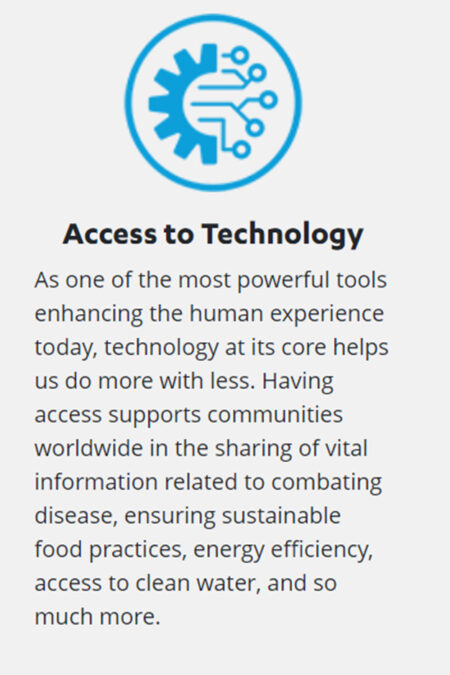
In kicking off #CES2024, CTA’s researchers noted the acceleration of global connectivity, with gaps in peoples’ ability to connect depending where they live: by region, the percent of people connected to the internet today are, according to CTA’s data, 92% in the U.S. 87% in the E.U. 76% in Latin America 73% in China 55% in Nigeria 46% in India. Such gaps in connectivity threaten peoples’ individual well-being, but also social and political stability that impacts the entire world’s security. And not to overlook, as well, the promise of AI to do good at scale at the enterprise-level, globally.
Mainstreaming the Connected Life, with a Side of Trust — Insights from Capgemini at the Start of #CES2024
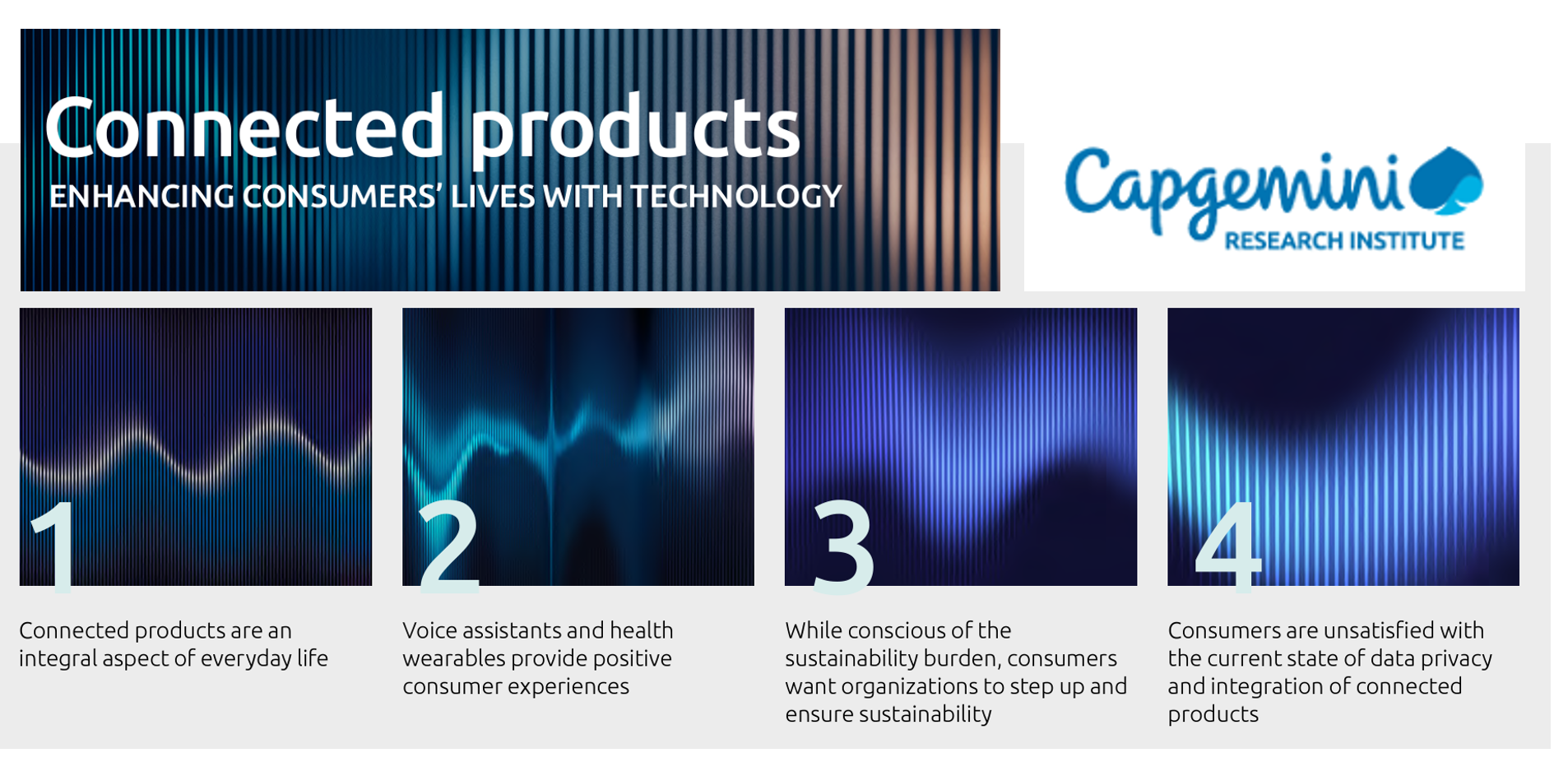
Even with serious concerns about personal data privacy and lack of integration, “connected products” are an integral aspect of peoples’ everyday lives. That’s the central thesis in a timely report from Capgemini Research Institute, Connected products: Enhancing consumers’ lives with technology. This study is well-timed as we begin a week-long exploration into the latest technology innovations being unveiled at CES 2024, the annual mega-conference hosted by the Consumer Technology Association (CTA). For the consumer research, Capgemini’s team polled the perspectives of 10,000 consumers age 18+ in November, among people from 13 countries: Australia, Canada, France, Germany,
Consumers’ Spending on Tech in 2024 Will Increase: CTA’s #CES2024 Forecast
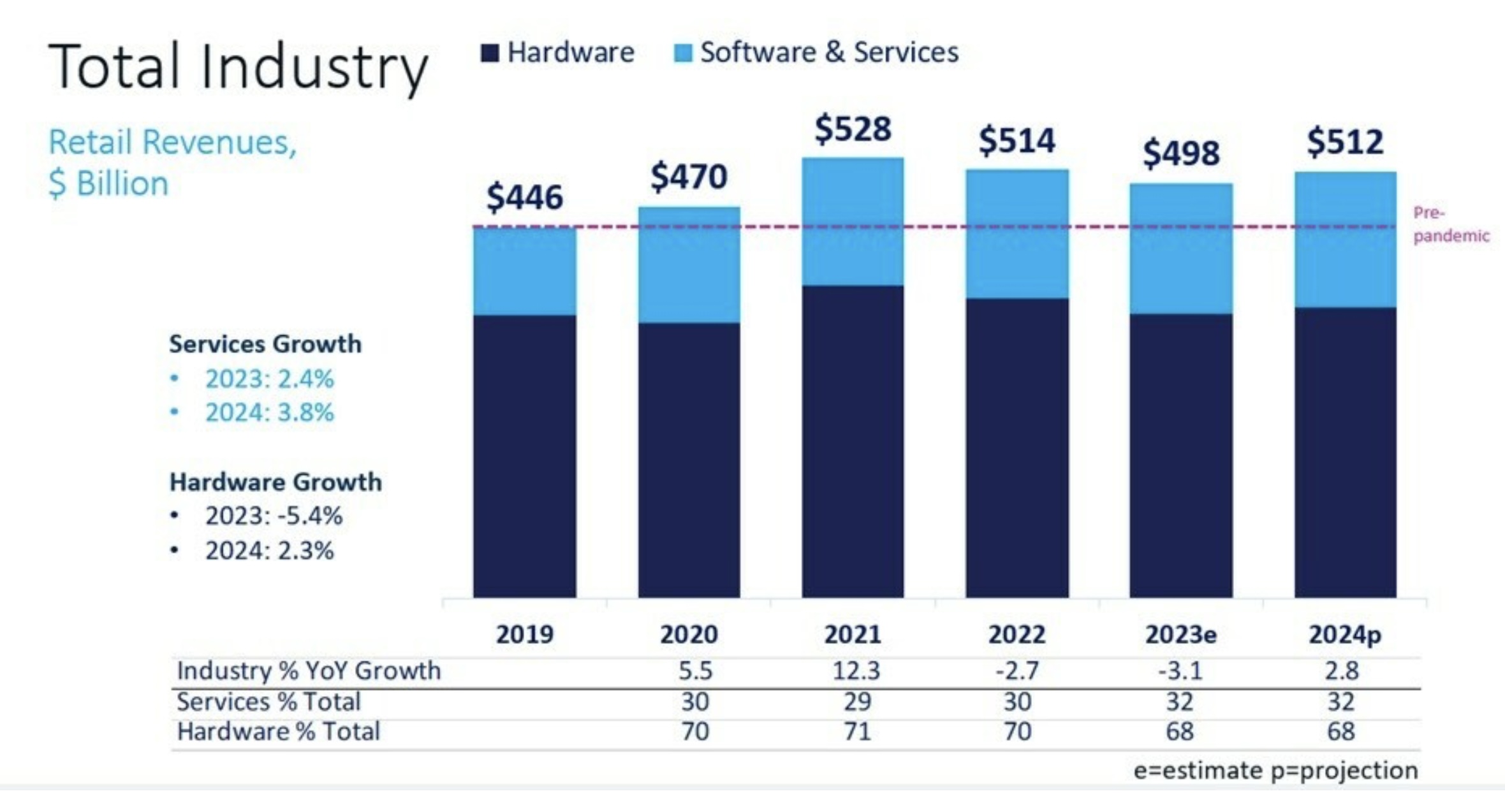
2023 was a pretty lackluster year for consumers’ spending on technology: inflation, concerns about global instability, and general household economic ennui caused consumers to ration spending on most electronic gadgets last year. Enter a more cash-positive mood for many consumers keener in the new year to acquire updated and upgraded tech, from computer hardware to wearable tech for health, according to the forecast released by the Consumer Technology Association (CTA) research team. The study results, announced on the first of two pre-conference Media Days, kicks off CES 2024 convening this week in Las Vegas. The bullish spending statistics reverse a two-year
What to Expect For Health/Care at CES 2024
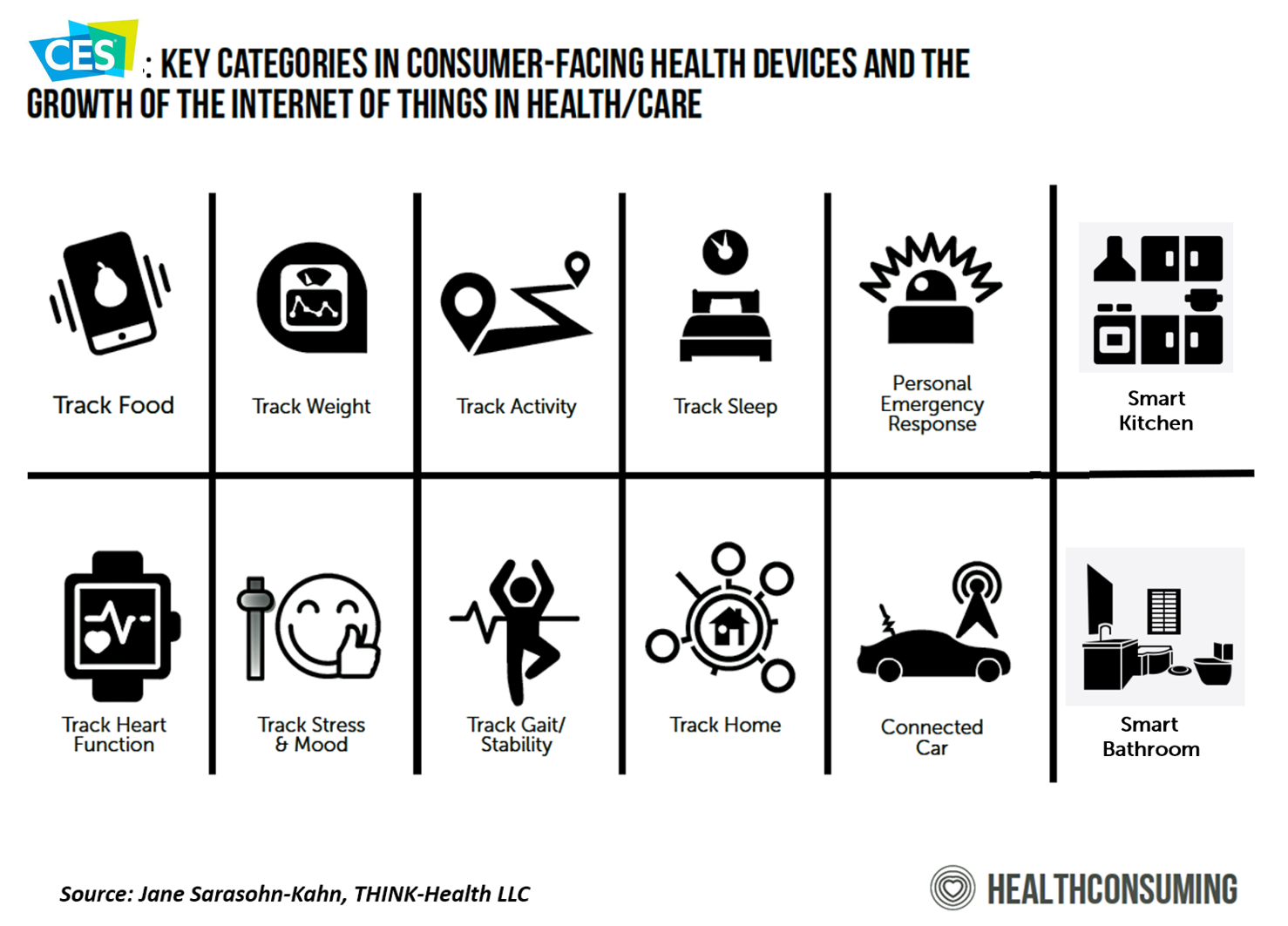
Not known for its salubrious qualities, Las Vegas will nonetheless be a locus for health, medical care, and well-being inspiration next week when the Consumer Technology Association convenes the annual CES featuring innovations in consumer technology. Ten years ago here in Health Populi, I wrote about New Year’s Resolutions for Health and the 2013 Consumer Electronics Show. Then, one-third of consumers were keen to buy health tracking technology but most of those people were healthy, CTA’s research found. I talked about the “battle of the (wrist)bands” witnessed at CES 2013, and spotted the
Technology Is Playing a Growing Role in Wellness and Healthy Aging – AARP’s Latest Look Into the 50+ Tech Consumer
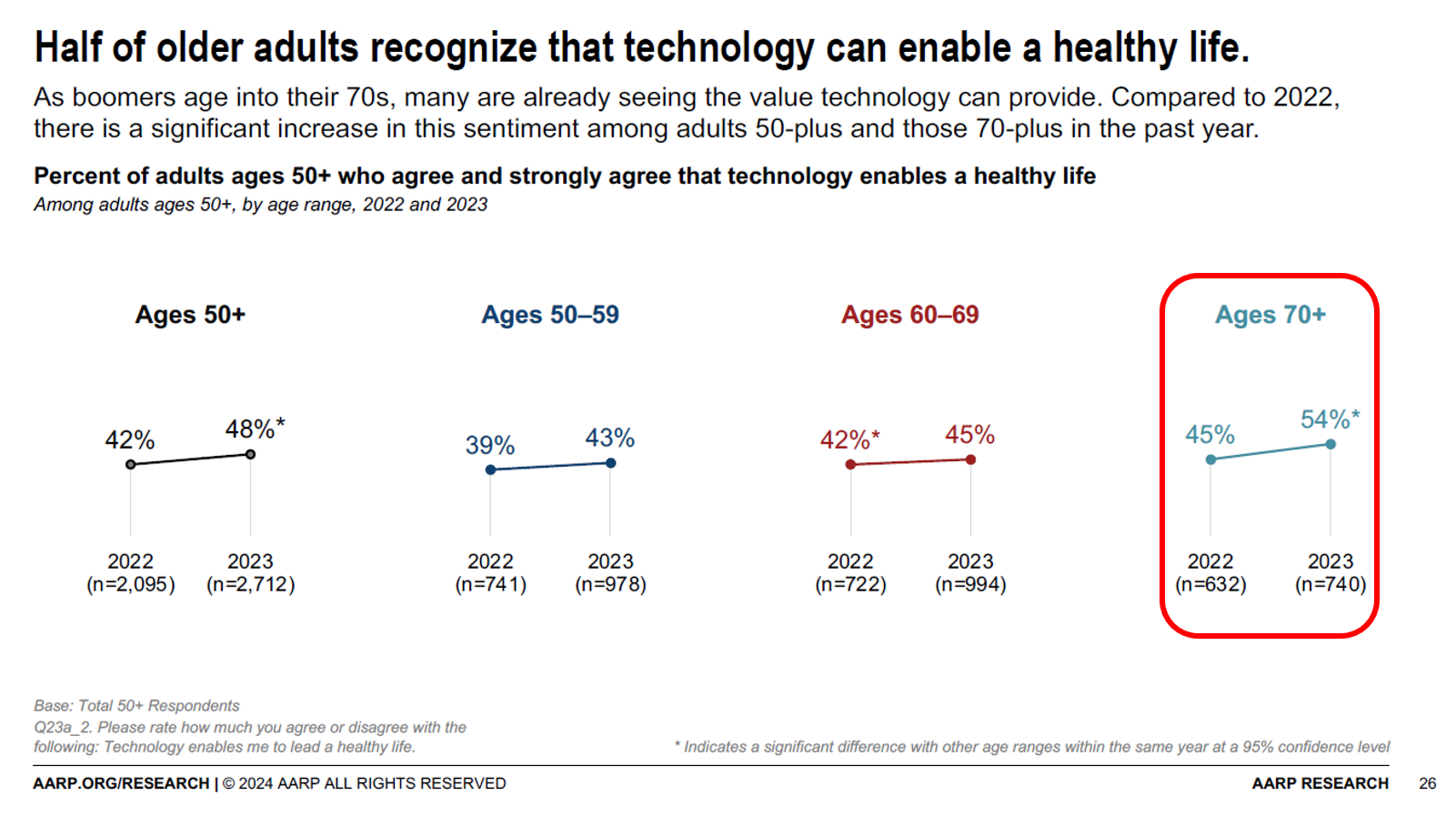
Most people over 70 years of age recognize technology’s role in supporting peoples’ health, we learn from a new report on 2024 Tech Trends and Adults 50+ from AARP. But adoption and ongoing use of digital innovations among older people will be tempered without attending to four key barriers that carry equal weight in the minds of 50+ consumers: design and user experience, awareness and interest, cost and acquisition, and trust and privacy concerns. [Spoiler alert: in the Hot Points, below, I add a fifth consideration: health equity + dignity]. To gauge older Americans’ views on
The Consumerization of AI in Healthcare – The Early Days of AI-Trust
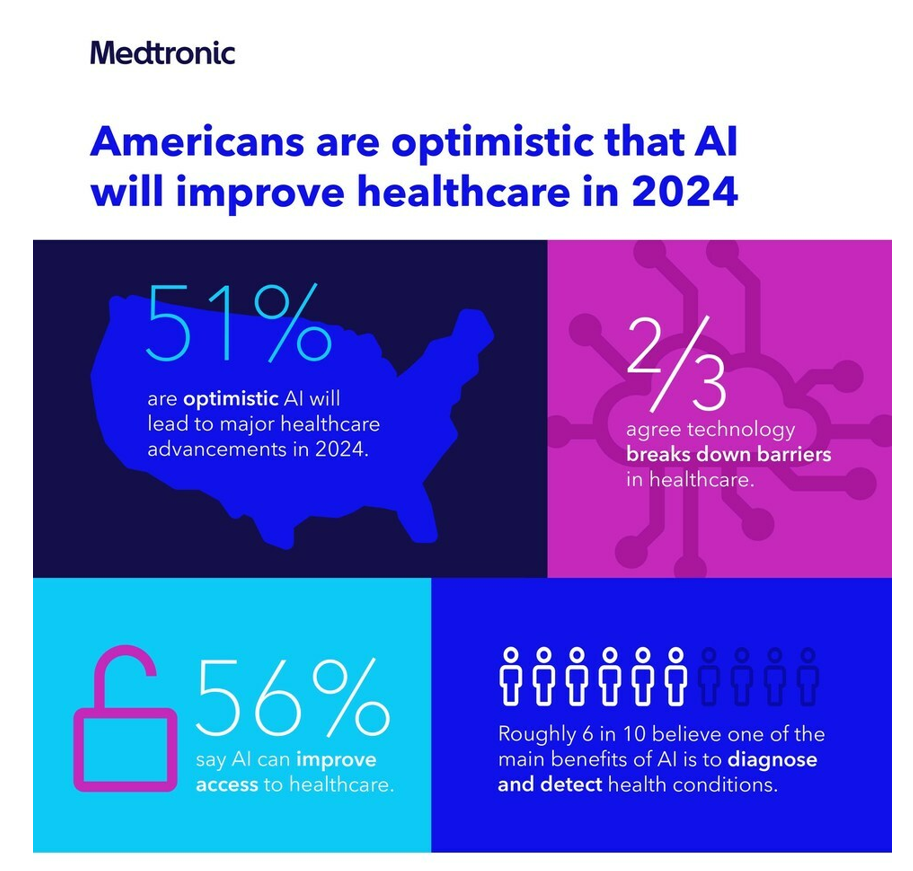
Most people in the U.S. are bullish on the role AI will play in health care in 2024, especially to lower access barriers to care and to diagnose and detect health conditions. Two new studies point to the consumerization of AI in healthcare, from Medtronic and Deloitte. This post weaves their findings together and suggests some planning points for 2024. Medtronic collaborated with Morning Consult to poll 2,213 U.S. adults in late September 2023 to gauge peoples’ perspectives on AI and health care. With such optimism among health consumers comes some
Workforce Shortages and Health Care Cost Pressures Inspire RSNA 2023 (and yes, AI’s in the mix, too)

Radiology and radiologists play starring roles in our health care, with he core work flow of diagnostic imaging supporting prevention, disease detection, diagnosis, delivering and monitoring therapy, linking specialists to other providers in telehealth, and as a medium for teaching clinicians, patients and caregivers. As health care delivery continues to change and adapt to technological innovations, demographic shifts, and economic-social-political forces, so, too, are the roles of radiology and radiologists in motion. Every year when American Thanksgiving weekend comes along, you’ll find folks involved in digital imaging flocking to chilly Chicago to convene at McCormick Place for
A Digital Health Checkup for the US – #1 in AI, Meh in Interoperability – An OECD Update
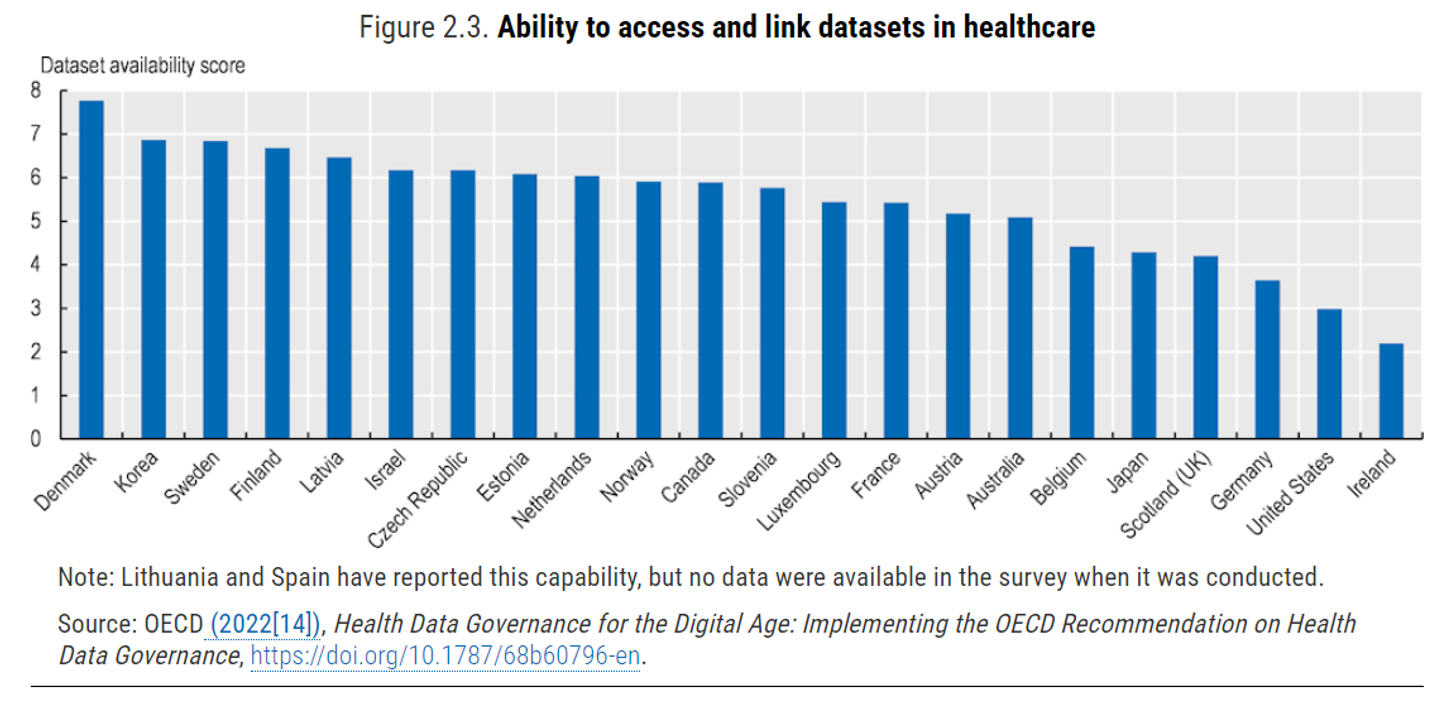
While health care has been slower than other industries to leverage digital transformation, COVID-19 accelerated change — revealing some key barriers blocking the potential for more fulsome transformation, the OECD explains in its latest version of Health At A Glance for 2023 with a detailed chapter on “digital health at a glance.” The OECD report assesses digital health maturity across 22 countries: in addition to the U.S., the report provides details digital health traits in (alphabetically) Australia, Austria, Belgium, Canada, Czech Republic, Denmark, Estonia, Finland, France, Germany, Ireland, Israel, Japan, Korea,
An Antidote to Loneliness – Amazon’s 2023 Holiday Ad-Video Is A Lesson in Social Health, Aging and Love

To complement today’s sobering Health Populi post discussing Accenture’s 2024 Life Trends Study — an outlook for a decade of “deconstruction” based on technology and other trends in the ether — I share with you Amazon’s ad for this holiday season gift-giving motivation. The agency responsible for the campaign, Hungry Man and director Wayne McClammy, weave together a beautiful plotline of friendship, the Beatles’ In My Life, and a time-traveling image that captivated me. The evidence base on loneliness and aging is deep and quantifiable: loneliness can kill like a daily inhalation of a pack of cigarettes. It is up
Everybody is Stressed in America, and It’s Not Good for Our Health: the 2023 Update from the American Psychological Association
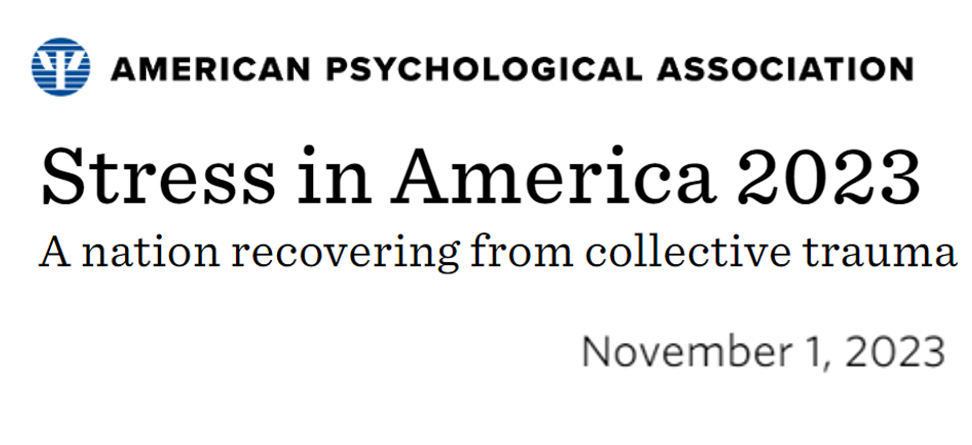
The U.S. is “a nation recovering from collective trauma,” the according to the latest survey on Stress in America 2023 from the American Psychological Association (APA). The APA has been quantifying Stress in America since 2007; for context, at the end of that year The Great Recession kicked in, and in response President Obama’s team put together assistance to bolster the national economy, jobs, and health technology (codified in the American Recovery and Reinvestment Act). American health citizens are experiencing a deja vu in 2023 akin to their financial stress experienced in the APA 2008 Stress
“My Doctor’s Office” Should Accept Wearable Tech Health Data, Most Patients Say
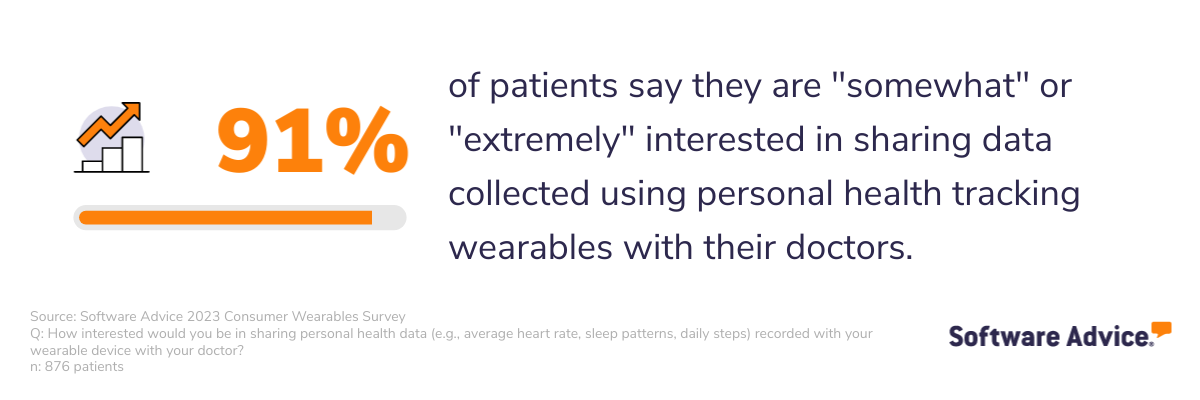
“Do personal health trackers belong in the doctor’s office?” Software Advice wondered. “Yes,” the company’s latest consumer survey found, details of which are discussed in a report published on their website. Unique to this study is the patient sample polled: Software Advice surveyed 876 patients in September 2023 to gauge their perspectives on wearable tech and health. Note that the patient sample was limited to consumers who had seen a health care provider in the past two years and who also owned and used a personal wearable health device such as an Apple Watch or Fitbit. Thus, the responses shared
Clinician Burnout – Lessons from BDO’s Clinician Experience Survey for Patient Experience and Primary Care
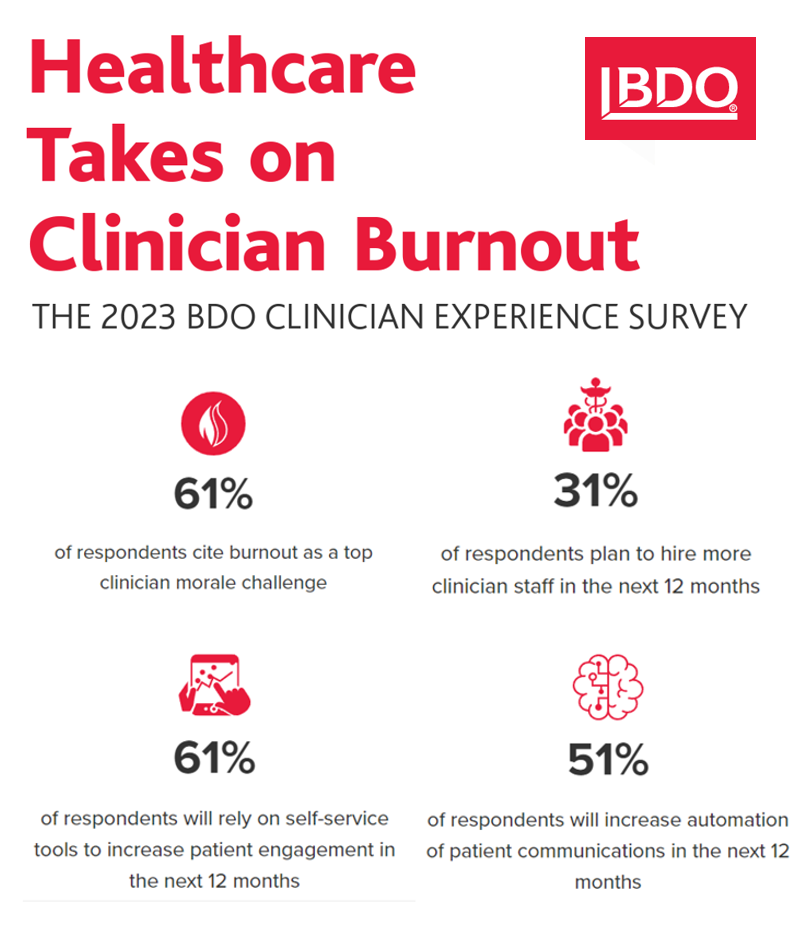
Clinicians’ feeling burnout is the top morale challenge facing U.S. doctors, driven by turnover and understaffing, compassion fatigue, and challenges using digital tools — think EHRs. The 2023 BDO Clinician Experience Survey “takes on” clinician burnout, connecting the strategic dots between the clinician experience and the patient experience. BDO surveyed 153 clinician leaders in June and July 2023; one-half of the clinicians were executive leaders, and one-fourth were each direct clinician providers and clinician directors. Roles reached into the C-suite (one-third), and other levels in their organizations.
Consumers’ Growing Use of Portals and Apps: People Embracing Their Patient Journeys
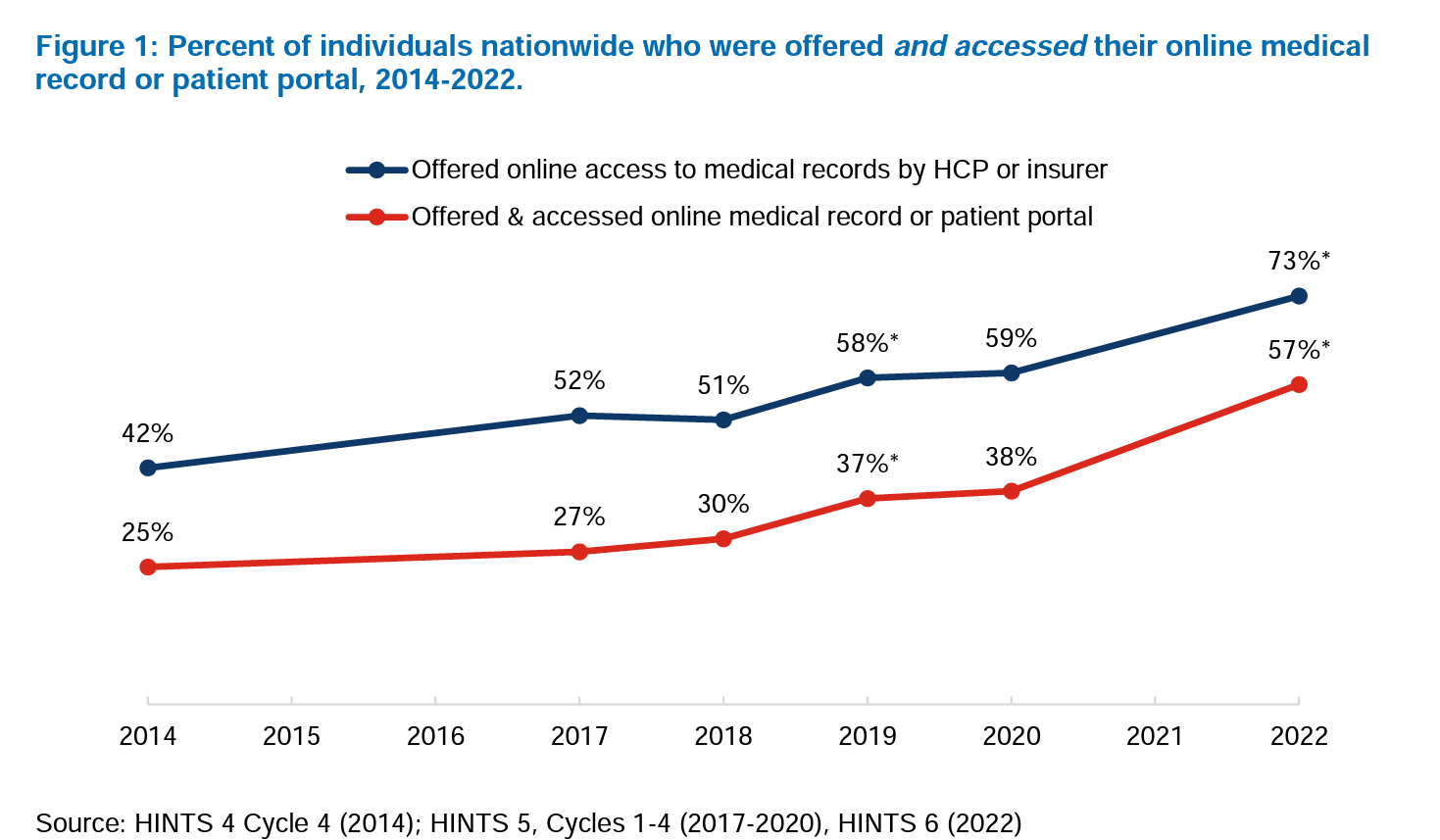
The latest read from ONC, the Office of the National Coordinator for Health IT, tells a story about patients’ growing use of online portals, medical records, and smartphone apps to access personal health information. We now have solid evidence empowering us to disagree with Col, Nathan Jessup, the iconic character played by Jack Nicholson in A Few Good Men, who responded to Tom Cruise’s Lt. Kaffee’s demand for “the truth” as the villainous Colonel raged, “You can’t handle the truth.” But ONC data belies that: as it happens, patients can handle the truth, as we learn that 9 in 10
Health Care Finance Leaders Look to Cut Costs and Improve Patients’ Financial Experience — Think AI and Venmo
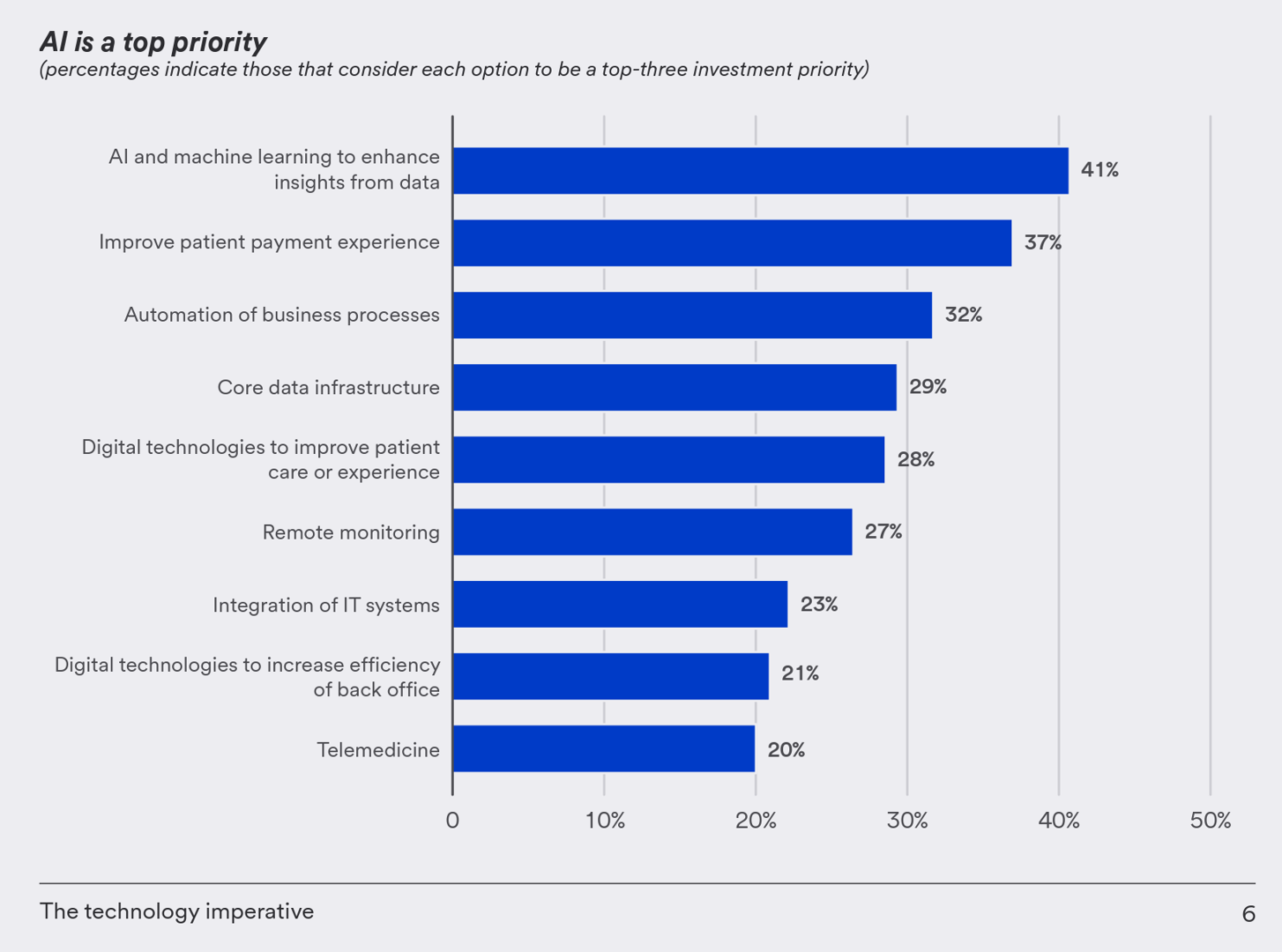
One half-of health care financial leaders plan to invest in technology to cut costs — and most believe that AI has the potential to re-define the entire finance function as they look to Leading the transformation, a study conducted by U.S. Bank among U.S. health finance leaders thinking about emerging technologies. U.S. Bank fielded a survey among 200 senior health care financial leaders in the U.S., 30% of whom were group CFOs, 20% regional/divisional CFOs, 25% senior managers, and the remaining various flavors of financial managers. All respondents were responsible for at least $100
AI is the New Health Literacy Challenge for Patients and the Health/Care Industry
Patients’ comfort in artificial intelligence is linked to familiarity with the technology, a consumer survey from GlobalData learned. Among patients unfamiliar with AI, 42% are uncomfortable, and another 50% feel neither comfortable nor uncomfortable with the technology. However, among patients familiar with AI, 60% feel comfortable with visiting a medical practice that uses AI. Welcome to the new health literacy challenge the health care sector will have to deal with, and soon: lack of patients’ awareness of AI, its promises and pitfalls. “It is imperative to prioritize patient education regarding this technology,” Urte Jakimaviciute
What If We Built a Consumer-Enchanting Health System in the Context of HLTH 2023? Building Blocks for the Scenario
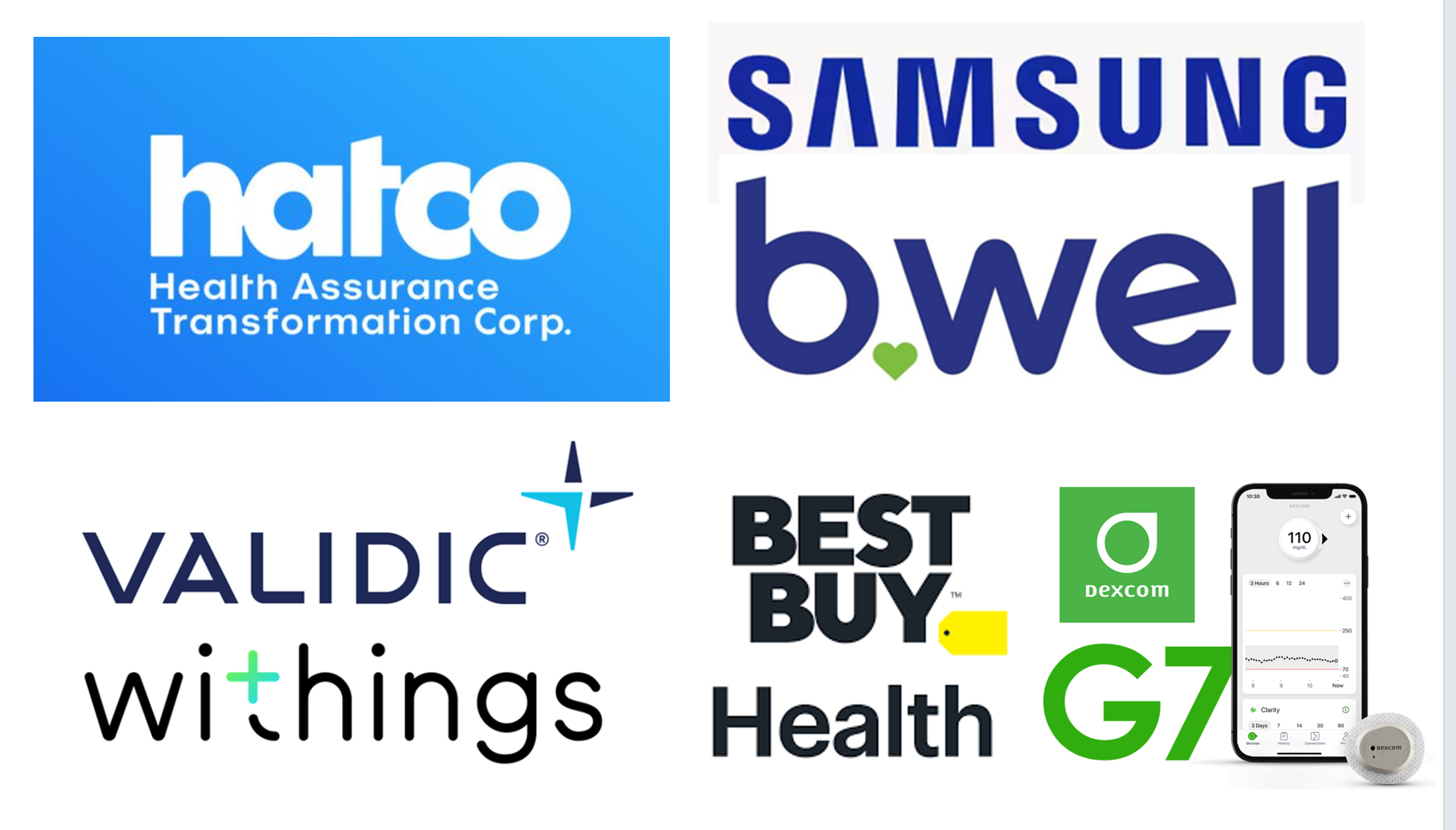
What if….you were given the opportunity to build a health system from scratch in this new era of platforms, cloud computing, AI and machine learning, curious-digital-empowered consumers, and collaborators in retail and community settings operating close to peoples’ homes and workplaces? With the HLTH 2023 Conference meeting up in Vegas these past couple of days, this “what if” scenario can be constructed with announcements coming out of the meeting, coupled with recent developments in the larger health/care ecosystem. Start with General Catalyst’s news of engaging Dr. Marc Harrison, most recently CEO of Intermountain Health,
Nurses Hacking for Health, Addressing Burnout, Workplace Violence, and AI
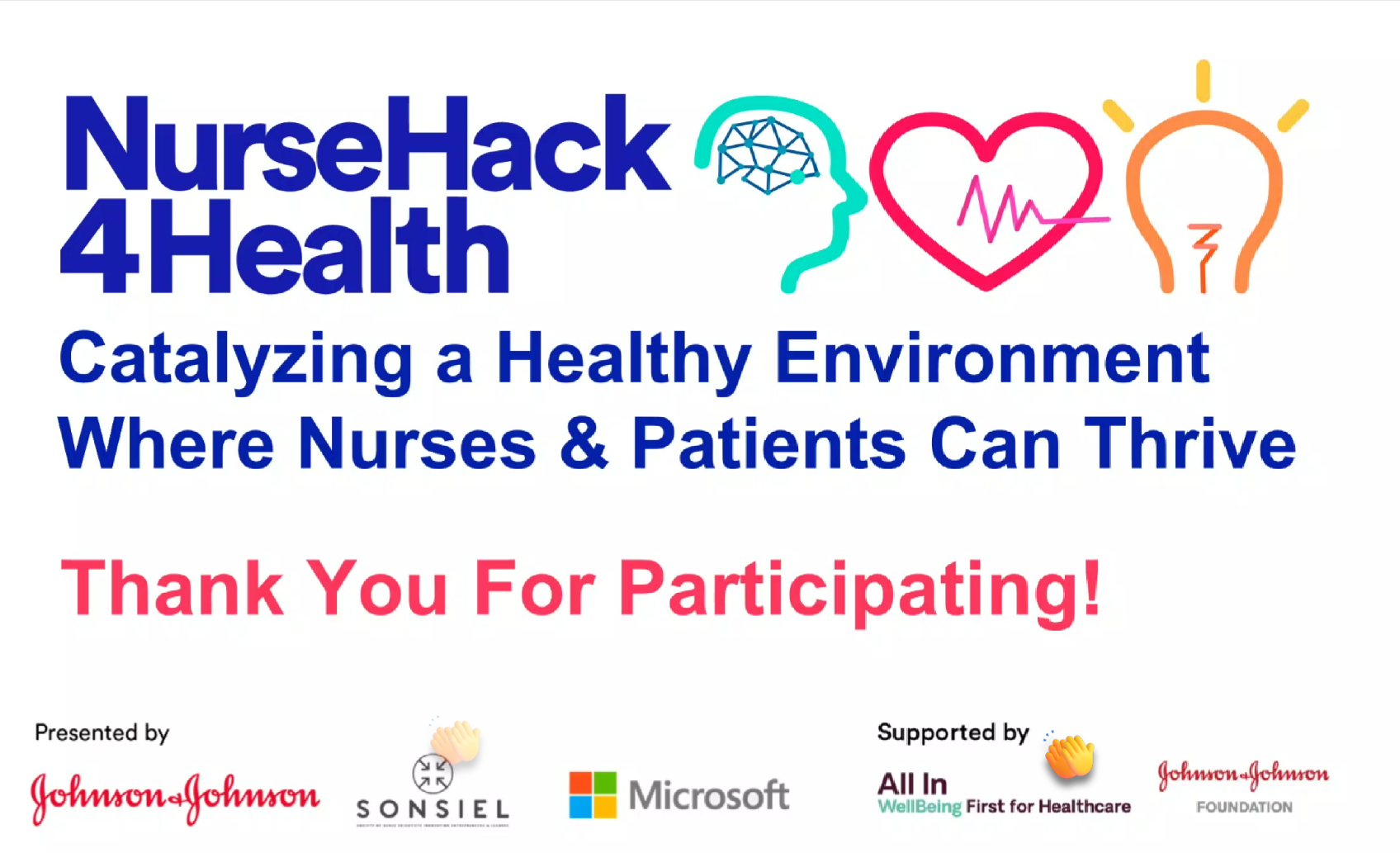
Three in four nurses working in hospitals care about the success of their institution — “they show up and gown up…yet only 57% feel a sense of ownership in their hospitals, leaving leaders to expect 100% quality to be delivered by about half of the nursing workforce.” This is the key finding in a study from PRC on the implications of nurses’ dis-engagement from their work. That context puts this year’s NurseHack4Health event all the more essential and impactful. This year’s virtual hackathon was sponsored by Johnson & Johnson, SONSIEL, Microsoft, and the ALL
The Omnichannel Imperative for Healthcare: Supporting Telehealth Awareness Week 2023
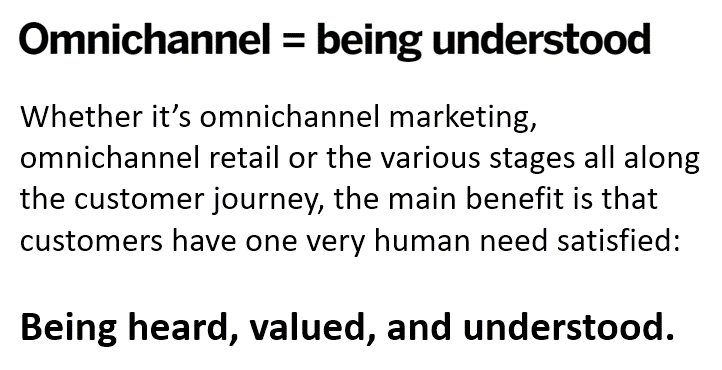
“What omnichannel really means: hearing the customer wherever they are and making them feel heard, valued, and understood.” That statement comes from Qualtrics’ explanation of omnichannel experience design. The very human needs of feeling one is heard, is valued, and is understood, underpin the rasion d’etre of omnichannel marketing. And these very values are those that underpin the trust between patients and providers and the large healthcare ecosystem. It’s Telehealth Awareness Week, led by the ATA. I celebrate and support the effort; this Health Populi post explains the Association’s mantra that Telehealth is Health, and that
The Clinician of the Future: A Partner for Health, Access, Collaboration, and Tech-Savviness
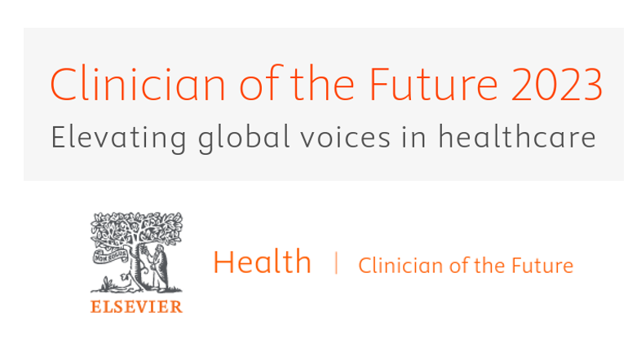
One-half of clinicians working in the U.S., doctors and nurses alike, are considering leaving their current role in the next two to three years. That 1 in 2 clinicians is significantly greater than the global 37% of physicians and nurses thinking about leaving their roles in the next 3 years, according to the report Clinician of the Future 2023 from Elsevier. Elsevier first conducted research among doctors and nurses for the Clinician of the Future report in 2022, following up this year’s survey research online among 2,607 clinicians working around the world: Elsevier polled
Consumers Continue to Spend on Technology, Seeking “A Happy, Healthy Connected Life”
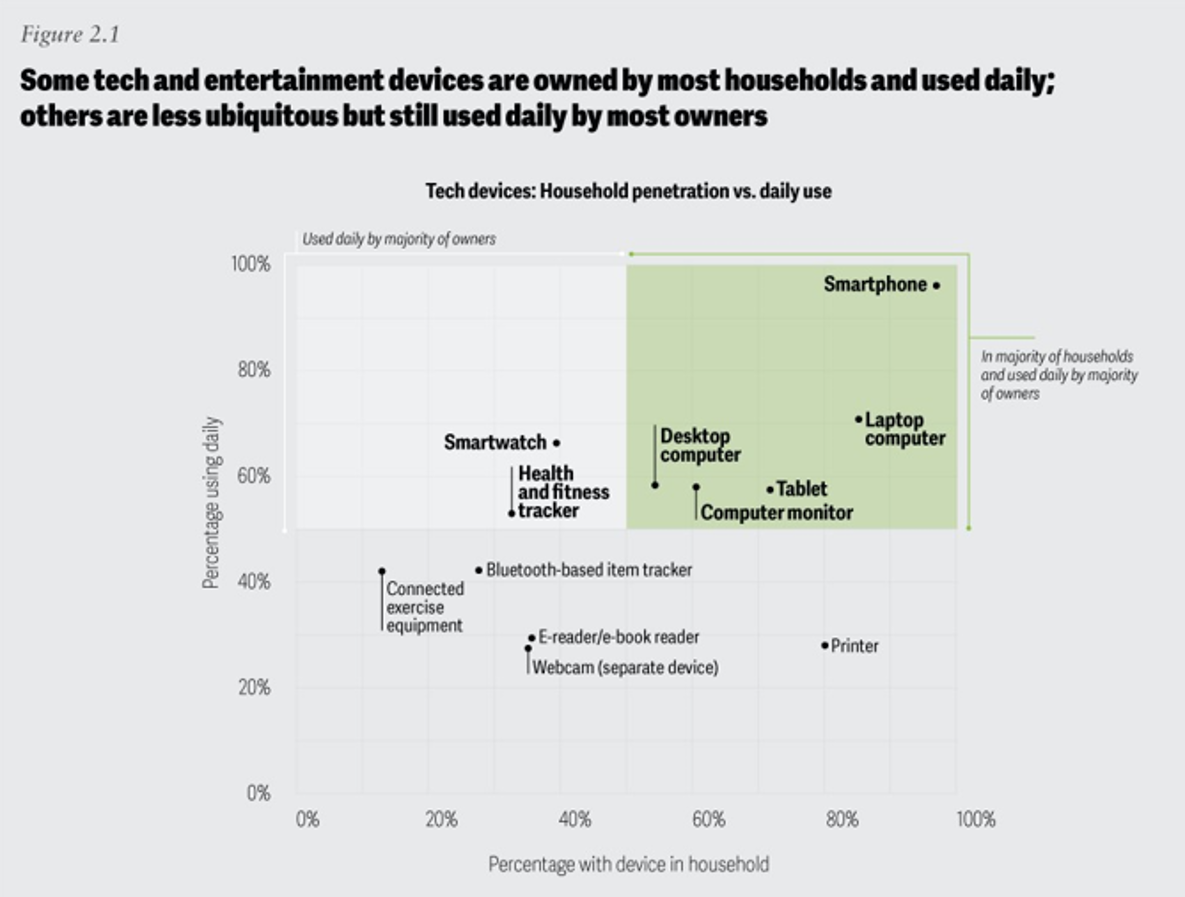
Most U.S. consumers will continue to spend their disposable incomes on connected consumer devices, but will be looking for more balance in their digital lives according to Deloitte’s fourth annual 2023 Connected Consumer Survey. In this year’s update, the Deloitte Center for Technology, Media & Telecommunications found that most households use five key digital devices daily: above all, smartphones, followed by laptop and desktop computers, tablets, and computer monitors. Most consumers who own smartwatches and health and fitness trackers also use those devices every day, as shown in the household penetration/usage chart
Hims and Hers and Hearts – Cardiology Blurs Into DTC Retail Health

Statin therapy has been used for decades to lower cholesterol with the goal of reducing mortality and preventing cardiovascular problems such as heart attacks and strokes. Hims & Hers announced a new service offering for health consumers and clinicians concerned about heart health called Heart Health by Hims. This is Hims & Hers’ first foray into cardiovascular health, working in collaboration with the American College of Cardiology (ACC). ACC clinical guidelines will inform the Hims’ provider platform for the program. “Prevention is the ideal mechanism to decrease cardiovascular events and ensure optimal heart
Patients Don’t Trust Big Tech with Personal Health Information Much Preferring Healthcare Providers as Data Stewards
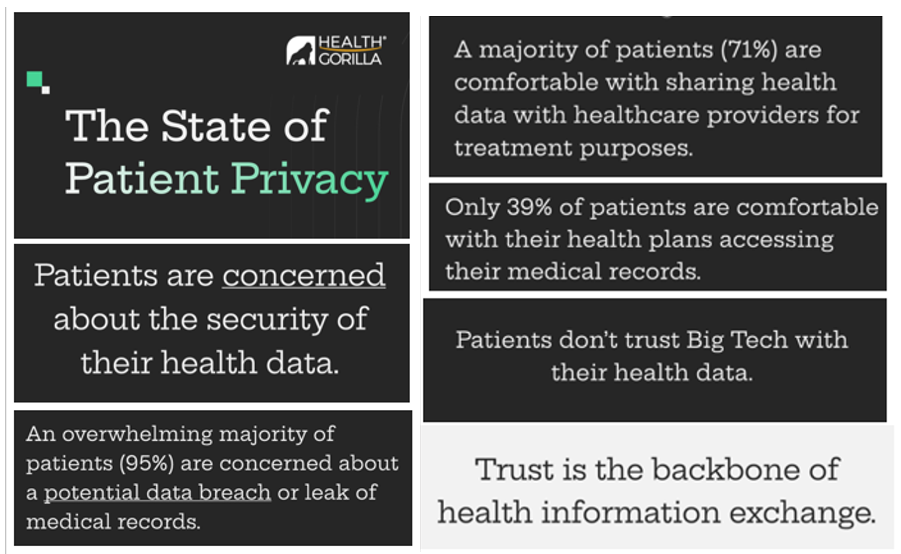
Nearly all patients are concerned about their medical records getting leaked or breached, which is The State of Patient Privacy, the title of a consumer study from Health Gorilla with a headline finding that “Patients don’t trust Big Tech with their health data.” With trust the “backbone” of health information exchange, Health Gorilla calls out, we have to face a big challenge here as health care enters its own sort of industrial revolution embedded AI and data analytics across the health/care ecosystem. How to re-build trust with the very technology that can help health care,
To Avert a GLP-1 Cost Tsunami, Add Lifestyle Interventions: Learning from Virta Health
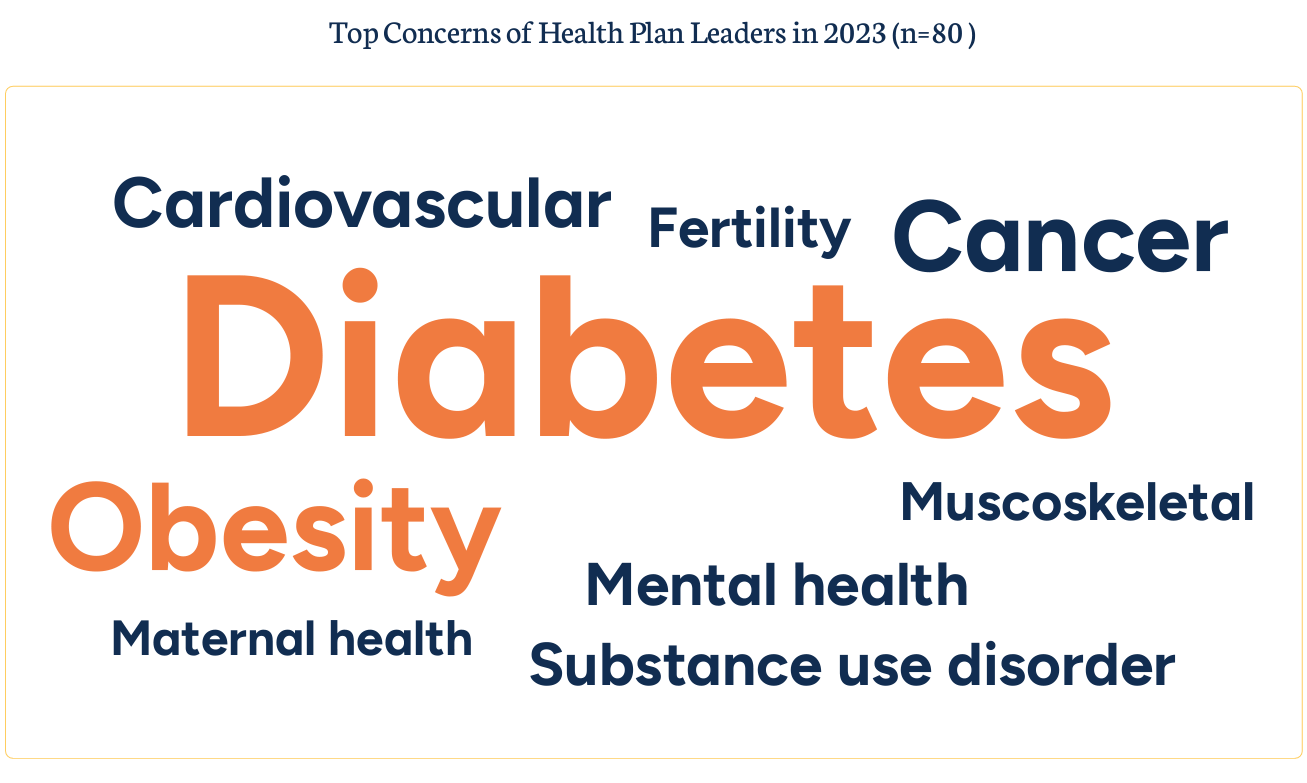
With consumer and prescriber interest in GLP-1 receptor agonist drugs “soaring,” health plan managers have a new source of financial stress and clinical questions on their to-do list. A team of Virta Health leaders held a webinar on 13th July 2023 to explain the results of a study the company just completed assessing health plan execs’ current views on Ozempic and other GLP-1 medicines with a view on both clinical outcomes and cost implications for this growing category of drugs that address diabetes and obesity. Indeed, diabetes and obesity are top health concerns among the
Happy Amazon Prime Days, When You Can Get 25% Off a Year’s One Medical Membership
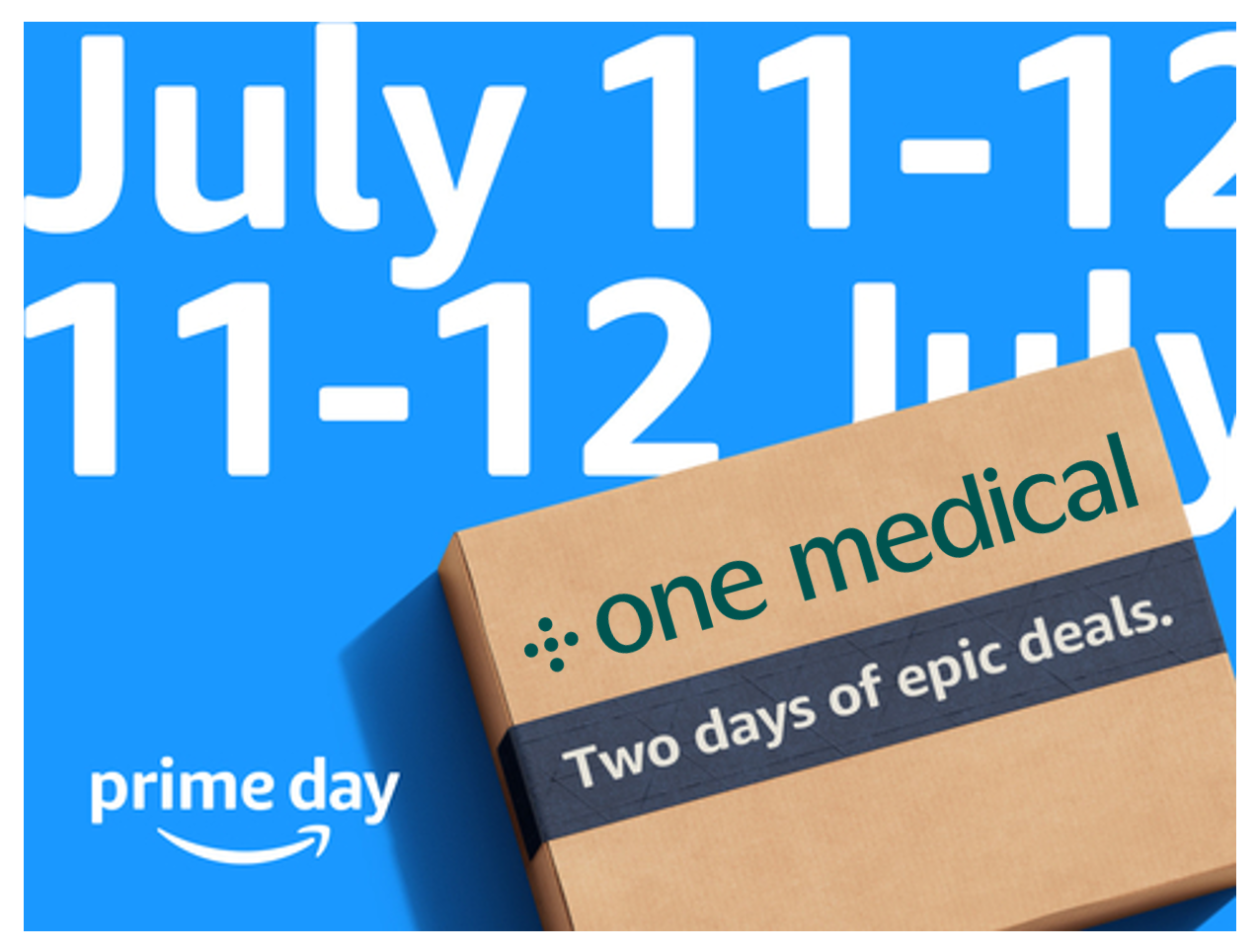
Now in Aisle E(commerce) – get your one-year membership to One Medical for $149. Today and tomorrow are Amazon Prime Days, 2023 style, when you can fetch bargains on lots of electronics (esp. deeply-discounted Amazon-branded devices), sporting goods, kitchen gear, pet supplies, and even groceries (saving with Amazon Fresh getting $20 off $100+ orders on Prime Day). And among a vast menu of health, medical, and well-being offerings from collagen to gym equipment and blood pressure monitors is that One Medical membership good for a year of services. “On-demand
A “Great Re-Set” for Telehealth and Remote Monitoring? Panda Health Says That’s a “Yes”
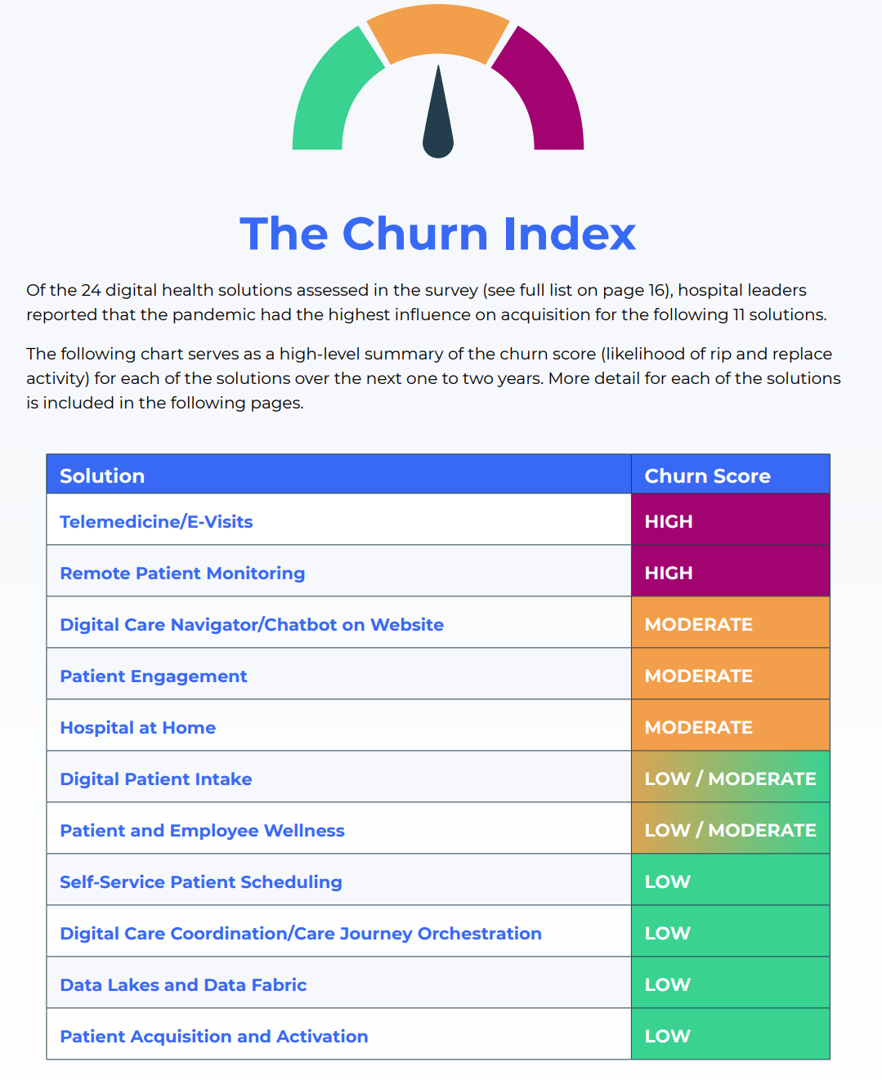
The fast-growing adoption of telemedicine and remote patient monitoring from the emergence of the COVID-19 pandemic led to hospitals and health systems launching new or expanding existing virtual care programs to accommodate a new reality for work-flow and patient care. Now that the worst of the coronavirus acute impact is in our rear-view mirror, it appears medical care providers are reassessing these implementations and may “rip [out] and replace” those systems, according to The Great Shakeup, a survey report from Panda Health. Panda Health collaborated with Sage Growth Partners
It Will Be a “Meh” Year for Consumers Buying Connected Health Devices, Based on CTA’s 2023 Forecast
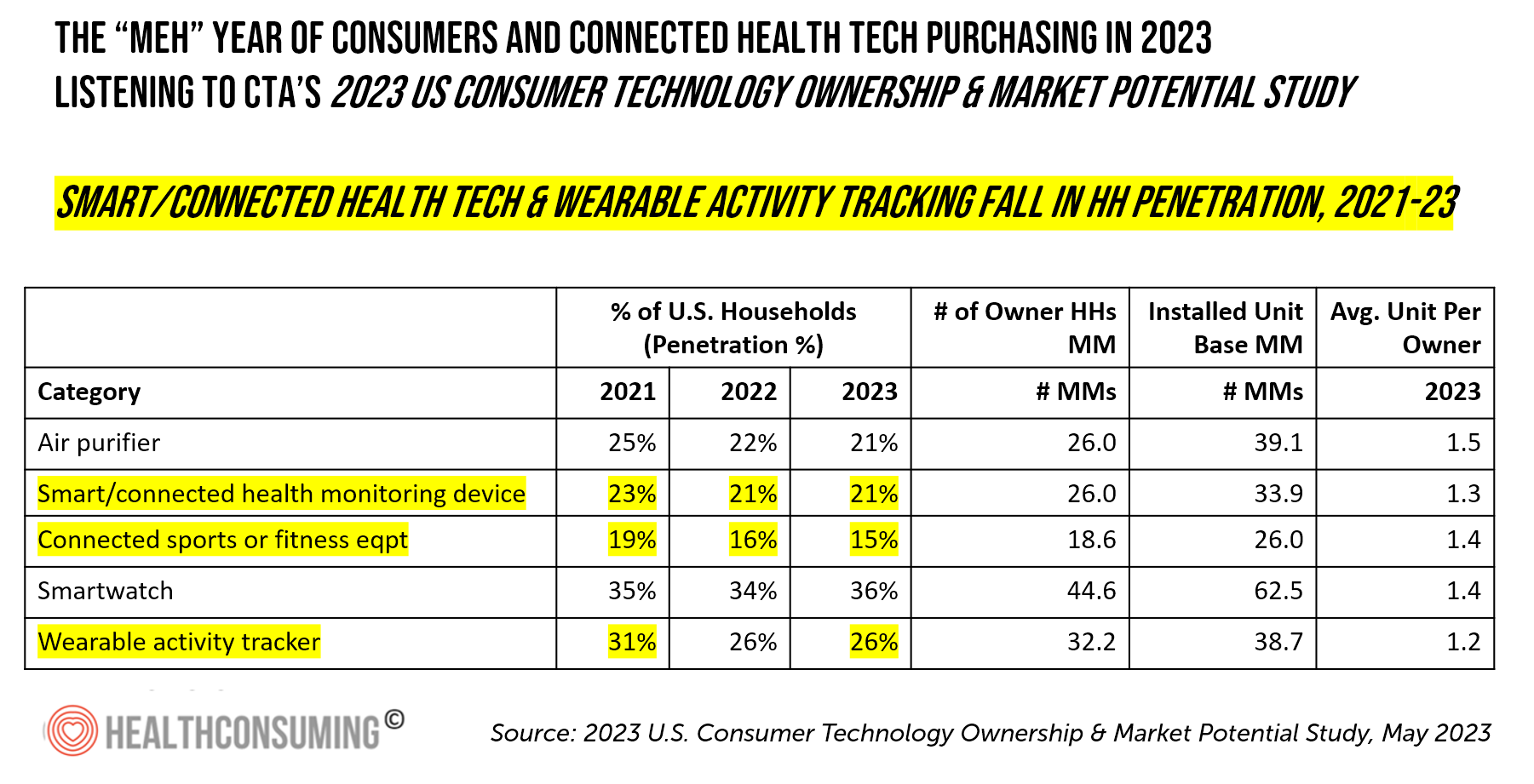
In 2023, U.S. consumers’ purchases of technology in their households will contract this year. Consumer-facing health-tech categories won’t be spared, we learn in the 2023 U.S. Consumer Technology Ownership & Market Potential Study, an annual update from the Consumer Technology Association (CTA). On the upside, smartwatch market penetration held steady in 2023, as this favorite form of wearable technology is “providing consumers a personalized digital health and fitness dashboard at their fingertips.” Many of these new smartwatch purchases will be cellular-enabled, blurring the space between smartphones and watches. One in five households intends to purchase
Patients-As-Health Care Payers Define What a Digital Front Door Looks Like
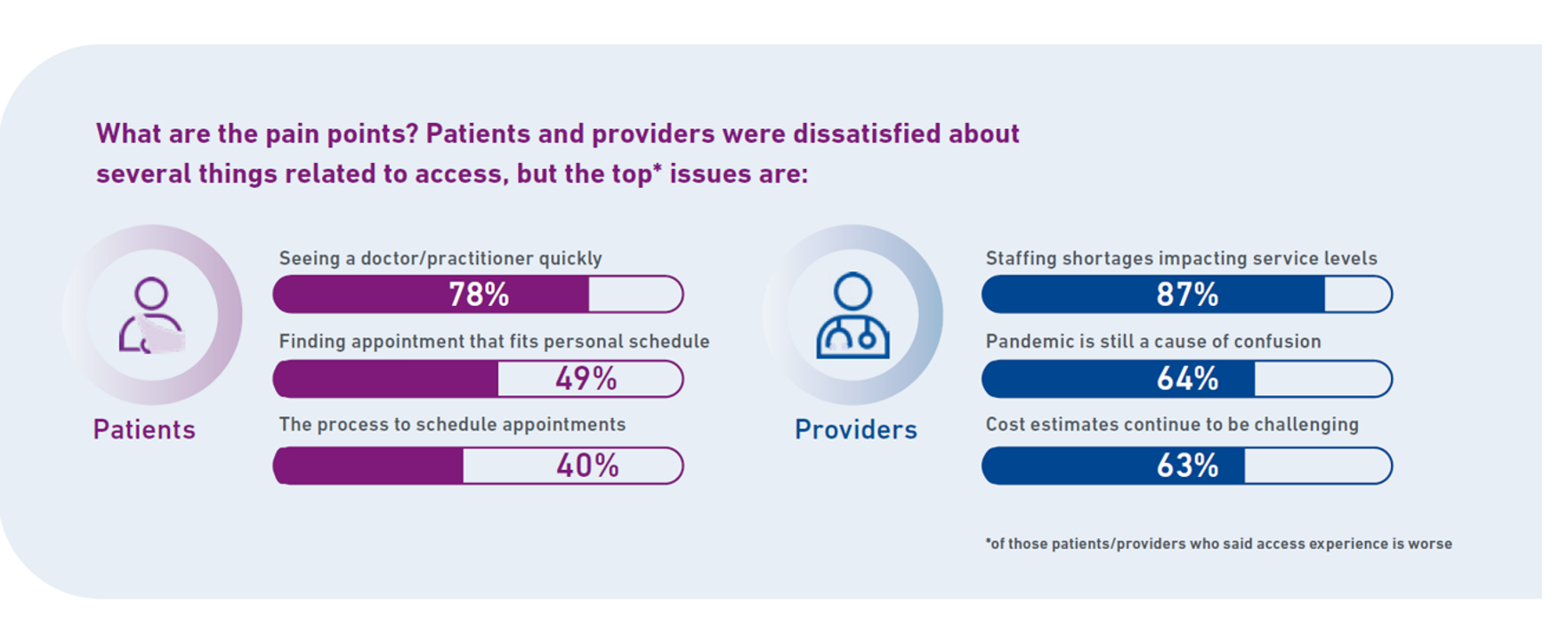
In health care, one of the “gifts” inspired by the coronavirus pandemic was the industry’s fast-pivot and adoption of digital health tools — especially telehealth and more generally the so-called “digital front doors” enabling patients to access medical services and personal work-flows for their care. Two years later, Experian provides a look into The State of Patient Access: 2023. You may know the name Experian as one of the largest credit rating agencies for consumer finance in the U.S. You may not know that the company has a significant footprint
Retail Clinics’ Growing Role in Health Care and Prescription Drug Sales
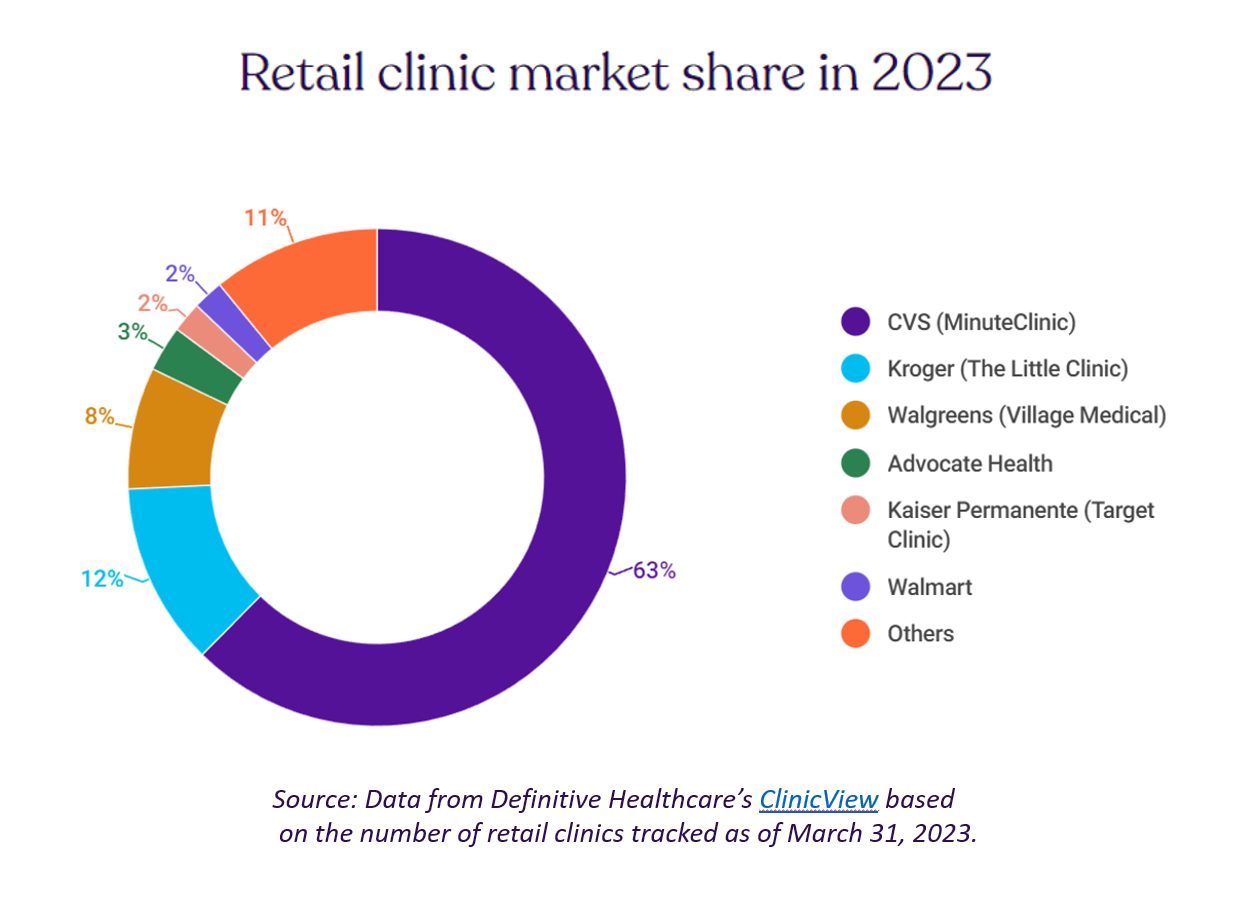
“It seemed like an odd pairing: shampoo and a throat swab,” observes a new report on the growth of retail health from Definitive Healthcare. But retail clinics are no longer, as the paper explains, “an experiment of a few grocery stores….they’re becoming a major force in the U.S. healthcare system,” asserts the thesis of Retailers in healthcare: A catalyst for provider evolution. While the use of emergency departments fell by 1% in the past five years, the use of retail clinics expanded by 70%, Definitive Healthcare calculated. Most retail clinics are owned by
Health Systems Must Move “Beyond the Walls” to Support Consumers’ Well-Being
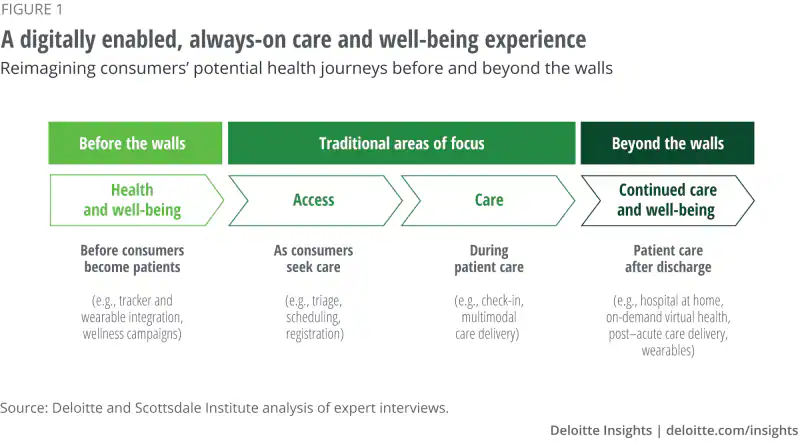
Hospitals’ and health systems’ core competencies have been serving patients “within the walls” of their organizations and institutions. As health systems continue to evolve value-based services while meeting patients’ consumer-oriented demands for convenience and personalization, digital transformation is required, enabling care “beyond-the-walls.” We learn more about this vision and how to map the journey to getting there in the report Integrating digital health tools to help improve the whole consumer experience from the Deloitte Center for Health Solutions and the Scottsdale Institute. This report is based on detailed interviews with experts in 30 US health
Consumers’ Use of Digital Health is Just Part of Mainstream Life Now
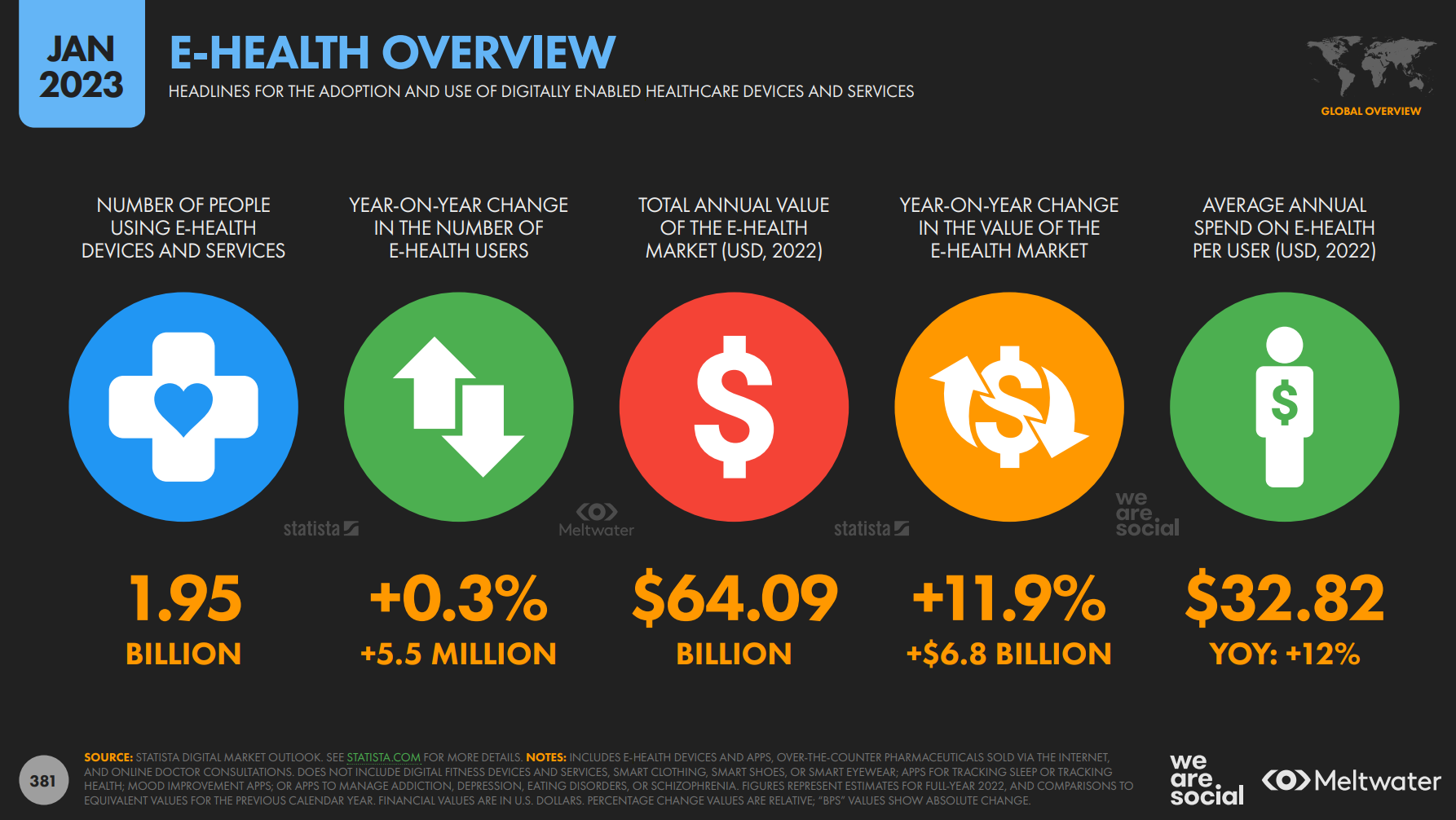
Using the Internet and mobile health apps are as mainstream as swiping left for a date and researching features in a new car, based on the Digital 2023 Global Overview Report from Meltwater. The broad coverage of this kind of research can’t be accomplished by just one entity, and Meltwater acknowledges the partners who brought them to this research-party: these included data.ai, GSMA Intelligence, GWI, Locowise, Ookla, PPRO, SemRush, Similarweb, Skai, and Statista. In this 400+ page report, you can find most datapoints you’re interested in covering the global consumers’ use of the internet, mobile apps, and social media. I
Virtual Health Care Can Reduce Carbon Emissions: the Environmental ROI on Telehealth
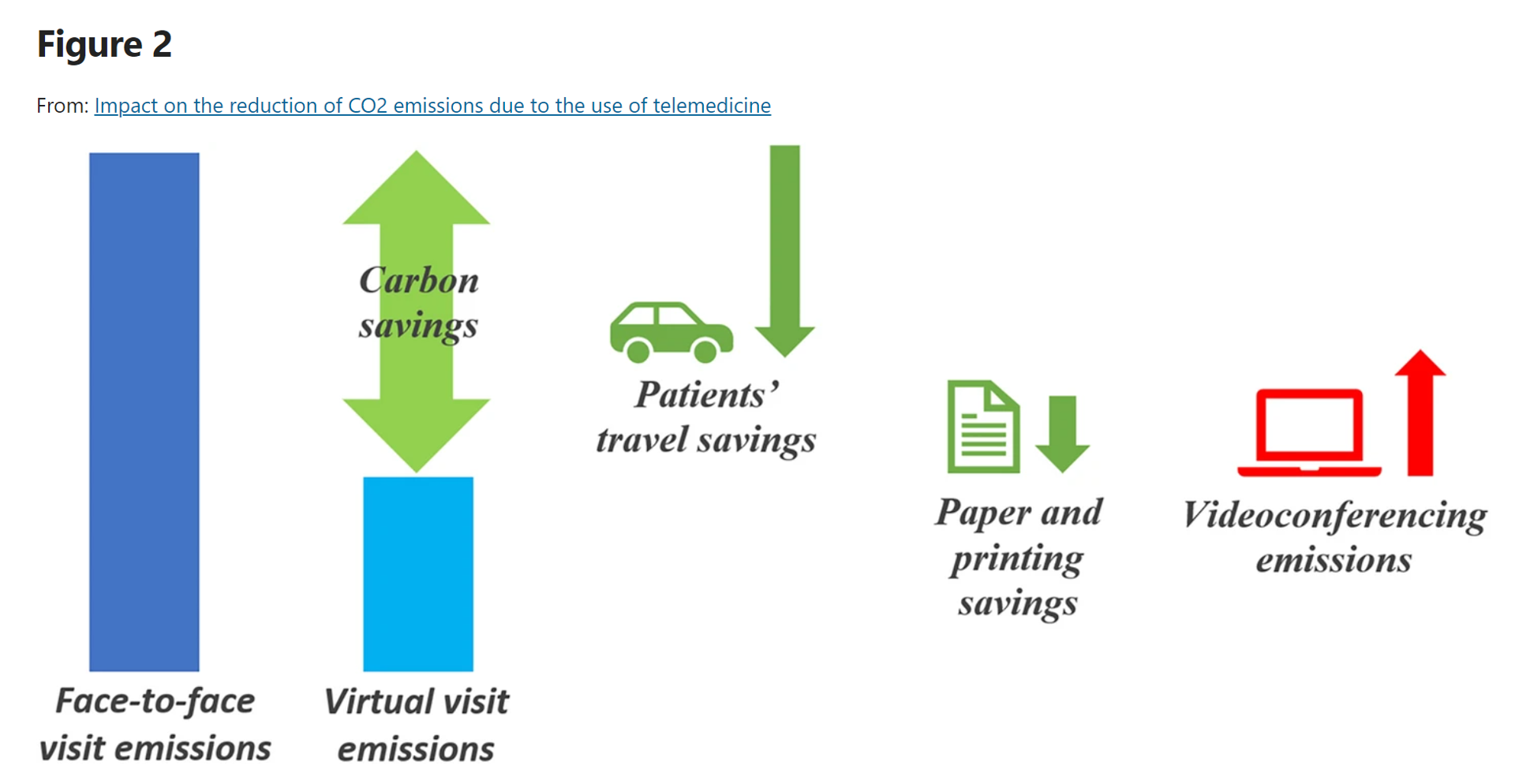
As implemented in the COVID-19 era and its immediate wake, the most obvious environmental benefits offered by telehealth visits replacing in-person patient encounters have been achieved through reduced patient travel, considering The Role of Virtual Consulting in Developing Environmentally Sustainable Health Care, a systematic literature review published in the Journal of Medical Internet Research. This study, led by researchers at the University of Oxford, UK, and the University of Oslo, Norway, identified over 1,600 scientific papers, narrowing the most rigorous and relevant to 23 papers focusing on virtual consulting and carbon emissions. This is an important question for two major
Mental Health Services Grow in the Retail Health Ecosystem
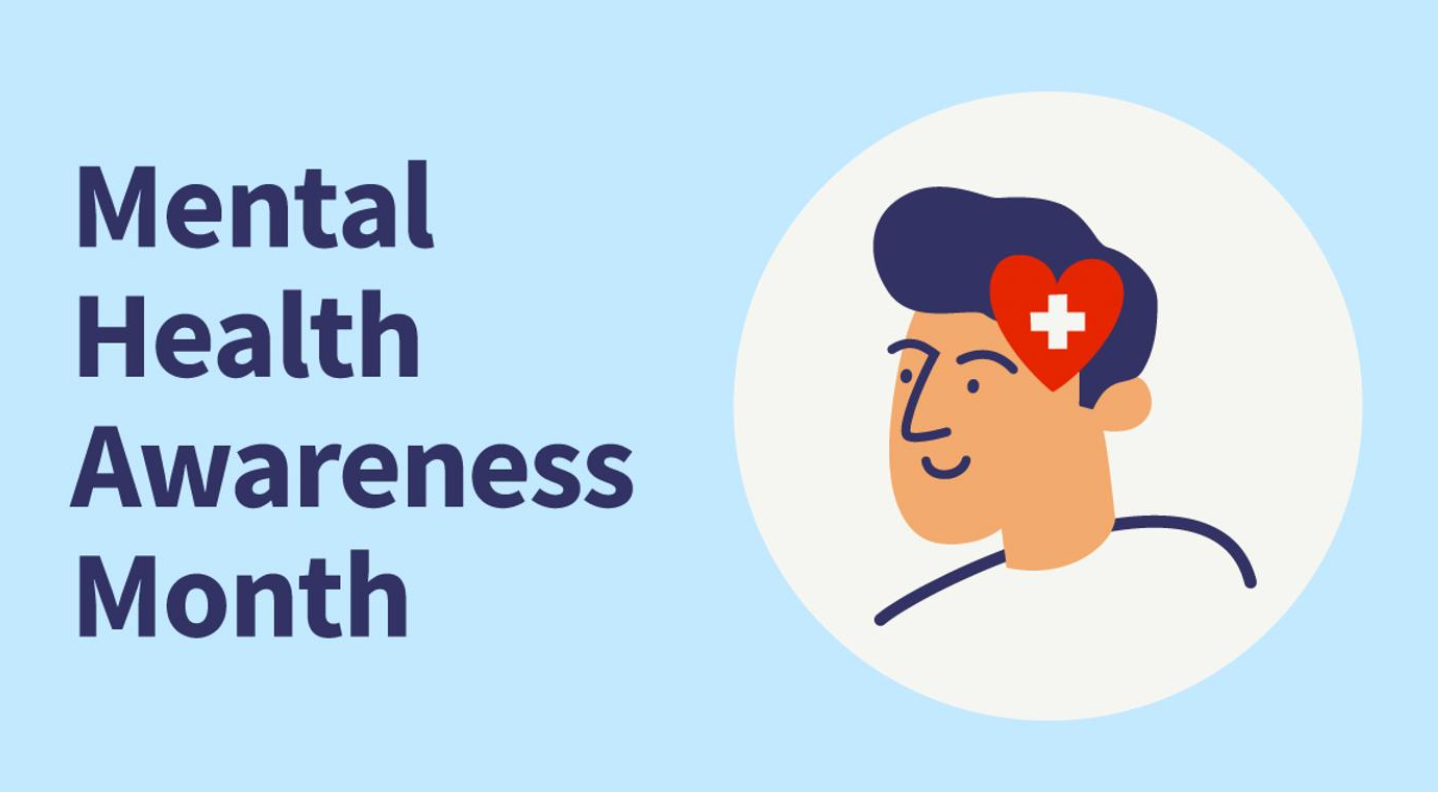
With May being Mental Health Awareness Month, there’s no shortage of press releases promoting a wide range of services and programs emerging from both the public and private sectors. In the wake of the COVID-19 public health crisis, the exposed epidemic-beyond-the-pandemic of mental health has inspired many collaborations between public, private commercial and not-for-profit organizations. These have begun to embed mental health into the larger retail health ecosystem. I’ll point to several examples as signposts for this phenomenon. Walgreens and Mental Health America – This collaboration expands Walgreens’ work with Mental Health America focusing in





 Thanks to Feedspot for naming this blog, Health Populi, as a
Thanks to Feedspot for naming this blog, Health Populi, as a